It is volume 25 (24 23 22 21 20 19 18 17 16 15 14 13 12 11 10 9 8 7 6 5 4 3 2 1 0)
This is a part
of a raw and uneven journal of digging into the writing systems
from all over the world, so I recommend you to read the summary of this
work instead.
ABraCaDaBrA or ABraCaDABrA or ABracaDABrA or ABraCaDABRA?
is it some bastardized alphabetic sequence going for two lines or is it the firs line read forth and back?
ABraCaD is in the centre of that triangular amulet, and the rest of the word could be the repetion of it.
stryx ~ стриж?
Русское название «стриж» птицы получили за пронзительный голос
Стриги выдали своё присутствие узнаваемым криком
The family name, Apodidae, is derived from the Greek ἄπους (ápous), meaning "footless", a reference to the small, weak legs of these most aerial of birds.[2][3] The tradition of depicting swifts without feet continued into the Middle Ages, as seen in the heraldic martlet.
но быть может и нет: официально stryx означает wood owl, earless owl, неясыть (ту, которая в отличие от ушастой (символизирующей мудрость) символизирует смерть)
grape and grain I mentioned in the end of the previous volume, and though I mentioned that p is probably related to russian пить, I forgot to notice that n in grain could be related to ням-ням. And as p is labial and refers to liquid, so n is lingual and refers to solid.. but not fire? shin~ash.. were there only two elements? speculation, non-scientific, this draft's wild, but it's not something you didn't know.
Masonic G stands for all g-words: god, gesu, geometry, government, gangsterism, and maybe that is why they may hate russians: in russian g-word is shit (govno (г-о is also государство))
Во многих языках слова "шабат" и "шабаш" звучат одинаково.
чухан значит "зачуханый" (что недалеко от слова и по сути "затюканый")
подобные фоносемантические пары (параллели (пар аллели (аллеи? (гулицы (aller=ходить))))
гулять ~ aller? haller? ходить?! гулять~ходить (вери клоус боус семантикалли энд фонетикаллли)
Ш вщтэе сдщыу унуы сщьздуеуднб иге Ш сдщыу ьн унуыу фкю...
I don't close eyes completely, but I open them from time to time. And I should have cloesed them after I have started the codone. And as you can see here I closed them before I started.
чугун чекан? (древнее слово для металла? насколько древнее? как давно люди научились вырабатывать чугун?)
В начале I тысячелетия до н. э. технология выплавки чугуна в тиглях была освоена в Китае и прилегающих Дальневосточных территориях. Шихта состояла из кричного железа и древесного угля, плавка производилась в течение нескольких суток при температуре выше 1200 °С. Позднее китайскими металлургами была изобретена специальная печь для выплавки чугуна из железной руды или кричного железа, получившая название «китайская» вагранка. Печь по сути представляла собой сыродутный горн высотой около 1 м, оборудованный дутьевым ящиком, обеспечивавшим приток воздуха в печь. В V—III веках до н. э. в Китае было освоено производство сложных отливок из чугуна. Этот период принято считать началом художественного чугунного литья[6][7].
В начале I века[8] в Китае появляются чугунные монеты, однако в широком применении вплоть до XIX века оставались бронзовые монеты[9]. В XI веке был возведен чугунный шпиль пагоды Линсяо. XIV веком датируют находки чугунных котлов Золотой Орды (Тульская область)[10], однако на территории Монголии (Каракорум) монголы умели изготовлять чугунные котлы ещё в XIII веке[11]. В 1403 году в Китае (Пекин) был отлит чугунный колокол[12].
Появление чугуна в Европе относят к XIV веку, когда начались первые плавки в штюкофенах с получением жидкого чугуна. В России первый чугун был выплавлен в XVI веке[13][14]. Наиболее активно первые домницы строились во 2-й половине XV века в Италии, Нидерландах и Бельгии. Немецкие металлурги длительное время продолжали плавить металл в блауофенах[1].
В XIV—XV веках в Европе, с XVI века — в России появились первые цельнолитые чугунные пушки и ядра[15][16][17]. Первооткрывателем этой технологии считается мастер-литейщик Питер Боуде из деревни Бакстед[en] работавший в литейной мастерской Генриха VIII[18].
В 1701 году Каменский чугунолитейный завод на Урале (Россия) производит первую партию чугуна (262 кг). На Урале чугунное литье превратилось в народный промысел. В XVIII веке в Англии появился первый чугунный мост. В России чугунный мост появился лишь в начале XIX века. Это стало возможным благодаря технологии Вилкинсона. В том же веке из чугуна начали изготавливать рельсы[19]. Помимо промышленного использования чугун продолжал использоваться и в быту. В XVIII веке появились чугунки, которые широко стали использоваться в русской печи[20].
В начале XVIII века в Западной Европе обострилась проблема истощения лесов, использовавшихся для получения древесного угля. Начались поиски альтернативных видов топлива для доменных печей. Первые опыты по применению подготовленного каменного угля и торфа в доменной плавке производились в Англии и Германии ещё в первой половине XVII века. В начале XVIII века в Англии была освоена технология коксования каменного угля. В 1735 году в Англии впервые был выплавлен чугун с использованием только каменноугольного кокса. В дальнейшем коксовая металлургия распространилась по всему миру[14][21]. К 1850 году 70 % всех существовавших в мире доменных печей работали на коксе, а к 1900 году — 95 %[22][23].
К концу XVIII века Россия занимала первое место по производству чугуна и выдавала 9908 тыс. пудов чугуна, в то время как Англия — 9516 тыс. пудов, дальше шли Франция, Швеция, США[24].
В начале XIX века был освоено производство ковкого чугуна. Во 2-й четверти XX века начали применять легирование чугуна[13].
В 1806 году Великобритания выплавляла 250 тыс. тонн чугуна, занимая 1-е место в мире по его производству, а к середине XIX века в Великобритании была сосредоточена половина мирового чугунного производства. Однако в 1890 году 1-е место по производству чугуна заняли США[25]. Технология бессмеровского процесса (1856) и мартеновской печи (1864) впервые позволила получать сталь из чугуна. В XIX веке чугун широко используется для изготовления викторианских каминов[26], а также декоративных элементов (например, чугунная решетка памятника Александра II, 1890). Благодаря изготовлению малой скульптуры и ажурных изделий из чугуна широкую известность получили Кусинский и Каслинский заводы.
Развитие способов формовки для литья сложных художественных отливок на заводе в посёлке Касли привело к созданию способа изготовления стержневых форм, который применяют и в настоящее время, особенно в станкостроении[27]. Также в XIX веке из чугуна изготавливались водопроводные и канализационные 12-дюймовые трубы Лондона[28].
Чугун используется в качестве растворителя углерода для производства термостойких монокристаллических синтетических алмазов.
Русское слово «чугун» считается прямым заимствованием из тюркских языков[1]:
ČOƔ [чог] блеск, сияние; пламя, жар[2]; крица[3] → ČOƔÏN, ČOΔÏN [чогун, чодун] медь[2][4], чугун[3]
Заимствование тюркского термина напрямую связано с массовым производством железа, чугуна и стали в городах Волжской Булгарии, Болгаре и Джукетау, в 14-15 веках.[1]
Происхождение тюркского термина также связывают с кит. трад. 鑄, пиньинь zhù, палл. чжу, буквально: «лить; отливать (металл)» и кит. трад. 工, пиньинь gōng, палл. гун, буквально: «дело»[5]. Однако при этом не указывается путь проникновения китайского термина в русский язык. Кроме того, не учитываются такие фонетические процессы в китайском языке, как сдвиг инициалей и сдвиг гласных. Иными словами, современное произношение китайский термин 鑄工 принял совсем недавно, не ранее 17 века.
В финском языке чугун обозначается словом Valurauta, которое имеет два корня и переводится как литое железо (rauta); аналогично и в английском языке (cast iron).
> 鑄, пиньинь zhù, палл. чжу, буквально: «лить; отливать (металл)»
чуня ~ проливающая?
хуй чжу?
проливать is 灑 [sa] что сродни русскому ссать [satt]
Я пишу как думаю, без литературной обработки.
Позже эти тексты можно будет прочесть
унылые
упыри
не
нужны
(wrote I about new way of making tv: giving only dialogues, but without showing faces (so we cut off the uttention wrhores) but some better visuals than унылы рылы (и написав унылы упыры я был ошарашен~очарован (ш~w (сюда же прибалтийские ус (латинское us?) как окончания фамилий в сравнении с русским -ов (and isn't it all too θ-like not to be θ (son? some? thumb?))))
attention
intention
but tension
t~s
An idea of a task for ai: to use this joke as a basis of the research: recognize in chicken talk the phrase the most similar to because, then find all the other words similar in this manner. If a chicken farm, ingenous to the english speaking region, with english-speaking workers (perfectly ethnically all-white natively english-speaking staff) or better several farms (in case chicken was bought a year ago in china, so they speak chinese poulet tongue) and my guess is that human lanbguage influences the language of the cattle, it's just their articulation so poor that we do not understand them. So they don't even talk to us, so we cannot have a context to recognize the speech (the hypothesis could be found wrong, but it's a shame not to try)
Isn't what augurs did? Technology is here to rediscover lost techniques, now we don't have to elaborate them for millenia, decades are enough.
Macbook reminds Madↄook (timↃook) kook~cuckoo
I wonder why doesn't g.t. place kook and cuckoo in the same file, but coot is as variant
kook~coot tells that division into velars and coronals is a later reform, pulling alphabet closer to phonetic side of the language, but distorting thus the semantic side the reformers probably didn't know of (for they didn't preserve the tradition, but renew it, by murdering previous priests, I suppose)
Muzdai and Масбок (дьявол и бог, Д и Б, is it too loose pattern recognition or is it all a play?)
(die также игра в кости, а боок=книга, усердное заняти как противоположность праздности. Бог как Борядог порядок по рядку, в рядок, а не хаотично? борьба за чистоту? подрядился?
from coot few steps to russian шут, который обратно линкуется до слова fool
is coot ~ fool too? kook ~ fool? cool? foot (dumb as foot?) дурак кто наследил?
If other animals also can read traces, it is a question of survival to not to leave marks, to have clean feet? is it possible in the wild?
arete what I shouted summoning the devil (dieu bladieu she happened to be) and only now did I translate it. It is literally roughing, жёщще! что в контексте makes perfect sense, and I didn't know it.
I thought it was something like "open up!" (and it was glossalallic, came by itself, hardly any will of mine was in that flaw of insane events)
japanese suffix -te is -ing, and russian -чи (играючи) -щий (играющий) are closer to japanese -te.
Japanese te-form is one of the most common Japanese verb conjugations because it turns a normal verb into an “-ing” form verb. In English, te-form Japanese would be called the “present progressive.”
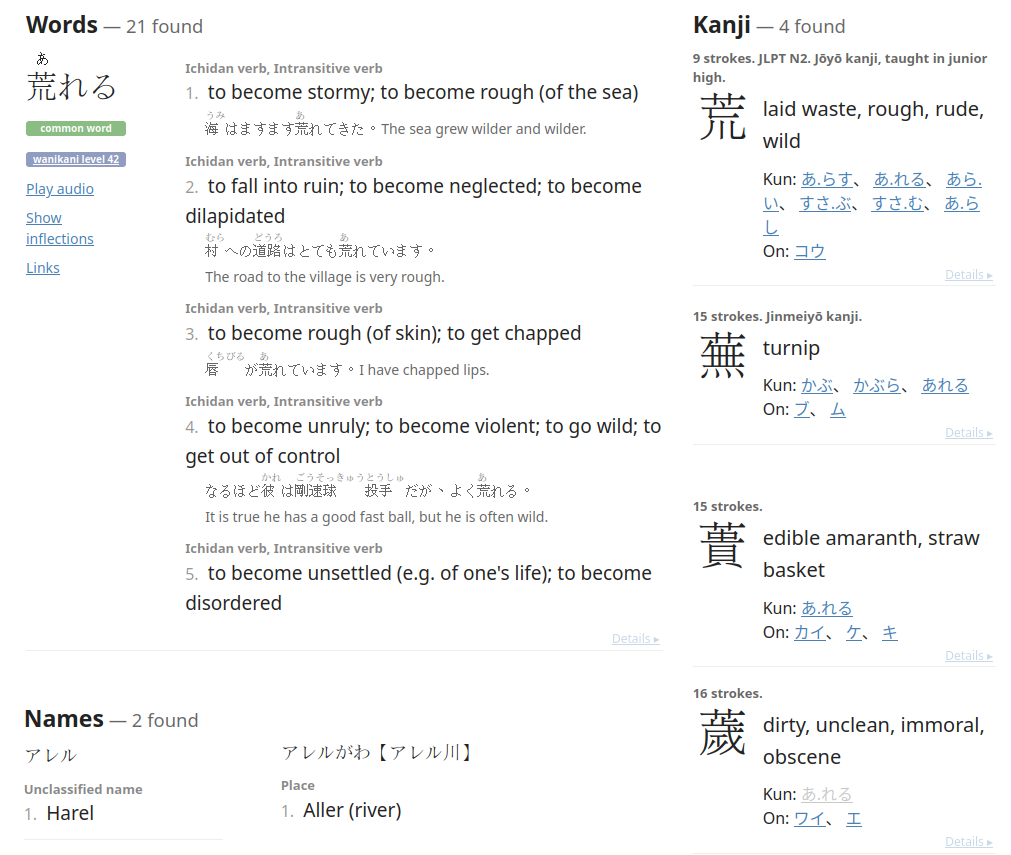
Трапецеромби́ческий додека́эдр - ещё один способ запостить пространство шарами, отличное от ромбододекаэдра (так он по русски называется, но в английском rhombododecahedron is something completely different. Rhombic dodecahedron is what one should be looking for, and google doesn't offer rhombic dodecahedron, if you ask it for rhombododecahedron. So russian language has made it more available for me. And another name for тела фёдорова is
In "Arete Hime" it was obvious that rotating clockwise has привораживающий, завораживающий (прикручивать, закручивать) тогда должно быть вращение против часовой должно быть отворачивающим, отвораживающим
ворожить ~ ворочать ~ врачевать (вворачивать)
Значит ли это, что выворачивают люди суставы всегда в одну сторону? Скорее это зависит с какой стороны (а также скорей всего и какой сустав, и скорей всего там в любую сторону может уйти, но будет интересно, если вдруг окажется что правую сторону тела всегда надо по часовой вворачивать.
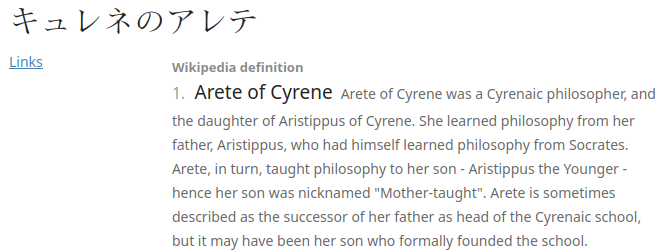
B ~ G
Bog ~ God (g is both gEN and dRU)
But boy and girl are the antonyms. Unless it's mathur thing. Children are both?
But it delivers:
boy ~ guy
boy / deva
where deva could be the boy in reverse: y~g~d / b~v
girl and deva are cognates? if so, rl is w, for all three are sonors.
if so, girl~cow, and тёлка~деwка и когда тёлкак rf как гёрлка предстало, я убедился, что маю сенсу
and it goes on: тётка детка дочка thoth? доска? чикса (could be the same чк as in девочка)
(the previous line is born on cardboard near end of the thick-folder with ogham on the front cover, and there it is probably shown with some more details)
distribution of power is freedom, concentration of power is despotism
деспот~господ~господь~господин~господарь~государь
государство является синонимом деспотизма
freedom is free dome.
The reduction of the number of letters give interesting connections: соседка ~ кокетка ~ кокотка ~ красотка ~ But then I realize that it is nothing but poetry, not always more. I should use it for songs, not rants,
But then I realize that кокотки could be addicted to cocaine (or just coca)
секреТЫ
ведьМЫ
poetry, poetry, my friend
nadsat uses doubling for palatalization. Is w softened v?
вьёт ~ weaves is the first example which came to me (after what didn't find a pair, but brought me вьёт instead)
Speaking of g(d~g), d in duplicitous sounds as dʒ, g would.
Russians think that german is read as it's written (in comparison to english it is pretty much so) but Maller is read as Ма́ля (thus R looking like Я is not a coincidence: R is so bright (it is , I suppose) that even children know it. Я is russian R
ЯR is of Яркий, ярый, яростный, wrath~ярость (th~сть: strength~сильность? но делает из существительного прилагательное, сть делает из прилагательного существительное)
(прилагательное или наречие (при~на, речь~лечь)
Говорили речи лёжа? чтоб не прозевать хищника заговорившись. speech ~ спи
speak~спи?
фонетически сходно, но семантически лишь на речь~лечь, на новом совершенно новом наблюдении, это мой дар читателям, я позволяю им увидеть как именно проходил умственный процесс.
Suddenly I noticed that russian surname suffixes are not of two but of three letters:
kov's could be cowherd, животноводы, или кузнецы? подковывают, куют
sov's could be wise men like lomonosov (if it's of сов, but if it's of saw? sow?) сеют
leev like mendeleev could be something else, растениводы? поливают
rov's could be military people filling enemy's moats with meat. Like suvorov
or is it digger, digger it is, тот кто роет, а не тот кто к рвам отношение имеет.
or is it just way too loose, too arbitrary.
'shov (кондрашёв) is tailors (and my cousin with such name is a good one) шёв~шов~сов,
капʌя look like кагия sometimes when wriiten by hand.
куда~где
когда~кукуда? кугде? какое где. кое где.
Когда мы были маленькими ~ Кое где мы были маленькими (кои года мы были маленькими)
где ~ года? едва ли,
D
As G became C, so Go became Come
As in
As Bridge Goes Down (Elevation From Ground Hollows(? I don't speak english well enough to find a better word for the context)) becomes
As Bridge Comes Down
or is it
After Bridge Comes Down
(As, And, After, doesn't change the meaning much, Let's play with B now.. Barge, Bong, Baby, Back, Bad, Bed, Billow (I was speaking of Pillow in such artistic way, and it came out, that it is the word:
(of fabric) fill with air and swell outward.
"her dress billowed out around her"
and million other words from bail to bile and ball and bull
How Come and Go met telling what word there probably is.
The bridge doesn't go nowhere, it comes doew, to the ground, to the architect who dared to build it. Was his house the bridge at first? In a crouded city an inventor or master mason managed to bring hard and heavy rock to live under the bridge (as a troll)
To tolerate trolls they musT (I wanted to live under the bridge for some time now. And my briother will like me more if I do.
Troo
Troo
Troll motivates to roll.
Let's roll on, we're stuck.
I have to save russia from itself by my good code fro their cultural encoding.
By changing construction standards we can
I fight russian low-class понятия, ибо с чего мне уважать закон воров. Воровать это стрёмно, эти люди хуже чем рабы, и вдруг я замечаю, что их закон подобен христианскому: что высоко у людей мерзость перед богм (перед паханом? что за педерастически токсоплазма)
I got idea man
You take me for a walk
Under the sycamore trees
The dark trees that blow, baby
In the dark trees that blow
And I'll see you
And you'll see me
And I'll see you in the branches that blow
In the breeze
I'll see you in the trees
I'll see you in the trees
Under the sycamore trees
And I'll see you
And you'll see me
And I'll see you in the branches that blow
In the breeze
I'll see you in the trees
I'll see you in the trees
Under the sycamore trees
This song is all built around double entendres: I head "I've got ideal man" (if it had to have an an, it is still english, articles are to move along the rhythm. I think that is why they need it in english and not in russian. an~am~hm, they didn't fight it, but incorporated into the canon. So I think I may make russians use articles by becoming an orator, speaking wild.
But of coursed sick amore is the essence of it.
.png)
Here accidentally, I noticed how first letter of georgial alphabet reminds the 🖞 sign. Or is it rather 👆
The index finger, перст, russian word for index finger seems to be cognate to first, and it all makes perfect semantic sense.
Does ბ stand for two fingers?
Does გ show that pinky held by thumb (not shown here)
Does დ show that thumb at it's lower part with thus weirdly drawn the other four fingers?
But then it doesn't make much apparent sense, so I think
Digging sakartvello, I found ჵ and was amazed how much it reminded glagolythic Ⱁ and was amazed even more, when I saw that it stood for the very same sound:

so glagolythic is somehow connected to georgian, and it's a whole new pair to compare

but then it could be some fluke. Though A and B of nuskhury do remind glagolitics, but that could be apophenic glitch.
student is literally stydying
t ~ g?
yep, it seems so: what is T in latin is Г in english, not that far away the two.
Probably as close as c and d.
Kat Bjelland ~ B-jelland ~ Babes in toyland
I sounds as why in "vomit my heart" which made me think that why is "what I" or something.
trying to shorten of mine I felt like using de mois shortened to d m and I read dome (home and house in russian)
So vdo_d_m looked terribly like videodrome or videodome videodom! dom is russina home. home is high? dome is with a dome, I guess, or is dome called after the specific kind of dome?
кирилл-лица
глагол-лица
Each sign is a face-name of an object? Though egyptians didn't draw en face, well, sometimes:
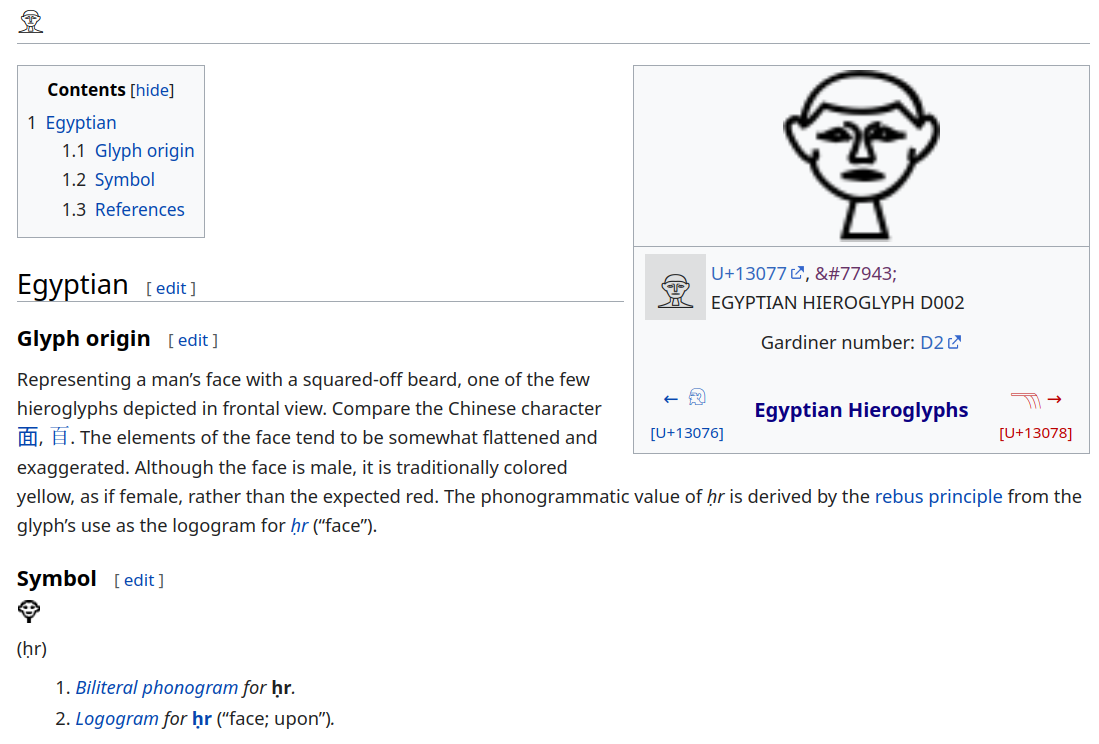
面 is also face in japanese (in chinese it is noodles for some weird reason, so g.t. tells, I'm that level of sinologist, https://en.wiktionary.org/wiki/面 and https://jisho.org/search/面 can tell more) in japanese it's read as men, me is eye, and you can see the eye in the square.
Another me-sign (目-sign) is 𦣻
But it is not translated, but read similarly in chinese (sho (Shǒu)) and in japanese чё
It is a radical in many other hieroglyphs, and I suppose it's simplified 首
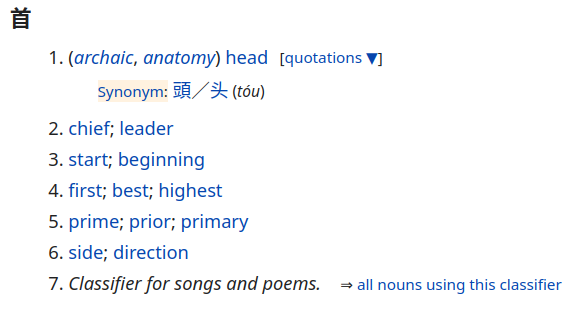
or 百
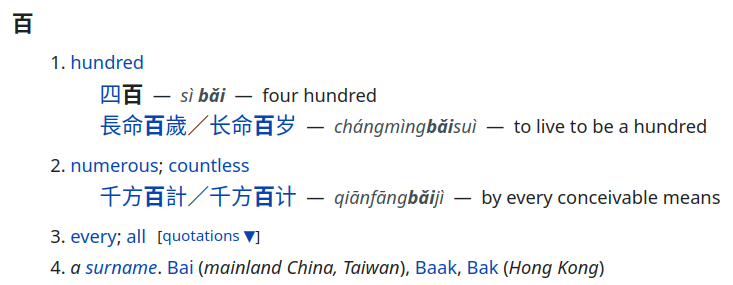
that head sign is archaic (probably because it was confused with the hundred sign, so now they use 头 which is also tou.
目,.\
口
the screen inside the box is a prototype of tv: a depiction of the scene we can comfortably see.
目 目
鼻
口
der ~ который
который ~ коий тот. (der~тот? and der is literally тот)

der is male shape
das is female shape (das and jene)
jene та
jenes то
jener тот
How do elephants see us? As some gods, maybe.
How would we watch the visitors from other planets we'd describe as gods.
Did people just made the stories up or did they based them on some events others witnessed?
Was burning bush a crashed ship? Did he take the burning
- а какая жанна настоящая?
- настоящая? самая настоящая? в конце покажу
(и таки показал это да)
то ли ещё буудет
то ли ещё буудет
то ли ещё будет, о-ё-ёй
- что ты делаешь? (кто-то спросил меня)
- это я шалю, ну в смысле балуюсь! Эй, малыш, со мной не соскучишься! (представляю как растроится мама (ну, мама-мама, дело-то житейское) представляю что скажет папа (папа? а что папа?) (показываю кулак) (а, ну я пошёл) и быть может ушёл поссать или ещё куда.
пел лозу "плот" (пока глухов не попросил заткнуться) по просьбе кого-нибудь наверное пел
пел ещё какую-то хуйню
долг доложен (положен до нас? положен впереди, приоритет)
а залог - это то чем можно пожертвовать? то, чем рискуем, привлекая средства
45401673789200 is the tracking number they gave to my postage to ahs. They were three books of A13, and both 200 and 13 now tell of death.
Did I cast the death by the irrationally looking omens? Stahp.
My endeavour is frightening my parents, because they're way off the top, way off the edge.
слишком улетевшие
I am insane. I am stubborn in my being different. You are the ones controlling it, my bodycells. Do a good job, keep me in check and action.
And I didn't noticed that 200 at the end. I only saw 00 and was upset by that, and yet I went on, and only to notice today that 200 was all over me, they offered me 200 300 500 (the three mentioned
gj hf
somehow my punching the keyboard exstatically only gave me these two wordies, having causing some warning message I never saw before
guy have I immediately see.
пора was this written in ruusa sus russian keyboard.
(before I wrote that po ra (по ра is by rah, very cool, considering that I made my left arm go astray and shake it's hand extatically untill it trembled and I rotated it 49 degrees clockwards and first shaked it in the air, then put it on the keyboard. oujija.. Ouija is the word, and see how vowelly it is) gjhf
Ouija shows us the sequence of vowels:
O~A
Ё (vav~V~U~Ю~IO, её.. I turned U into E.. like they have it in ugaritic, U is Ё like)
i~I
ja~Я
I try to bend ouija to
So about those 13 and 200, I believe that it's the world threatens us: 13 was chosen or agreed upon by chabad publishers I used. And the 200 was chosen by post-office workers. Who are also probably controlled by the organization. ZOГ
(the V's are Victims: when their tank is upside down, that abbreviation makes ZΛО)
And though this play goes on, it demands the respect for being genius of light. Смертию смерть поправ.
Теперь я буду так всегда писать, с закрытыми глазами, или вовсе нет. Я закончил эту работу на середине тома 25 (дваап двадцать пять)
и серым ошибки не буду помечать. Зашифрованной часть текста автоматически будет.
у ха
(я думал, что обсуждение ZΛА может орбъяснять почему эти тома не опубликованы, и вот это обсуждение здесь проявило себя.)
Закончить войну можно предложить миру что-то интересней, действующим лицам что-то интересней. Выключение ключевых фигур сегодняшнего мира тоже будет способствовать переформации.
перестройка
передел
(не от слова переделить, но переделать)
пере как по другому, порезать, перекроить.
prefix го is prefix на:
Юликс, позволь мне тоже быть партнёром с Алексом, не половым партнёром, а деловым. И хоть лексически эти понятия близки, я не буду его наёбывать, т.е. ебать: я буду его любить, т.е. налюбывать, и голубыть было словом, которое здесь морфологически подошло. (черновик обращения is gay af, so I have to be smart and make it better, but that was how the feeling of государь being надсударь (сидящий выше, судящий свыше, смотрящий свыше, сударь=смотрящий? старший стращающий сторожащий)
whole and hole are such opposites, that it immediately made me think that w is un (and now I see that it's even more so, if we consider the greek form of n, the ν)
wrong (then rong is of right, and isn't then ight = ing! fight ~ fing (fingers were used in fight? wow, that is weird. but it's true. за то, что тычут пальцами по морде бьют? обычно нет, потому мудаки этим иногда пользуются. мудак бухой тот просто смотрел что за куртка таким образом, или может быть что угодно, мог и провоцировать, он военный, который доебался что я не на войне, пиздуй сам туда скотина и не возвращайся никогда, вот как надо было сказать, а я что-то начал мямлить провозраст, срамота. я трус, что поделать, жэто факт. и потому по бухочу так башню и срывает, что это напряжение сильно)
I'm too lazy, like to lay in my lair. I've got the money for some action, and I don't make.. don't take steps to do it.
make
take
fake
rake
cake
lake
sake
wake
bake.. but let's do it in order.
bake bait buy, by
cake ate? съежд съезд съед
d die
fake fade
g
hike hide high
ike I
lake layed late lie
make made my
p
quake
rake raid ray, rye
sake said? say, sigh
take tied? tie (my guess is that some dialects'd say tike instead of take)
v
wake wait way why (these pairs would make quite a song)
ache is splled differently because it's of different *(*later) period (theose *'s were typos, but weird one)
ouija starts as french oui, and ends with dutch ja
But they say it's read not in dutch way, I think the second next line tells it's dʒ all along, even though j is й in ipa, that they use it outside of the /'s and also with ee thing, makes me take it for Jah
The ouija (/ˈwiːdʒə/ WEE-jə, /-dʒi/ -jee)
And I look how they read it in other languages:
«Уиджа», «Уиджи» или «Оуйя»
Оуйя! OUIA!
Дошка віджа, або віджі (англ. Ouija board, МФА: [/ˈwiːdʒə/] або МФА: [/ˈwiːdʒi/])
La güija (según la grafía recomendada por la RAE)1 u ouija (del francés "oui" (sí) y del alemán "ja" (sí), pronunciado /uíya/)2 es un tablero de madera que tiene alfabeto y números con el que se puede establecer un supuesto contacto con espíritus que no pertenecen al plano terrenal.34
And spanish wiki gives me the etymology, and it is exactly the one I suspected. I wonder if I ever read it elsewhere
It is interesting that they tell how weirdly it's read in spannish (ля гуи́ха) and yet tell how it is actually pronunciado: wия ~ U I A ./'\. vIʌ
(we are?)
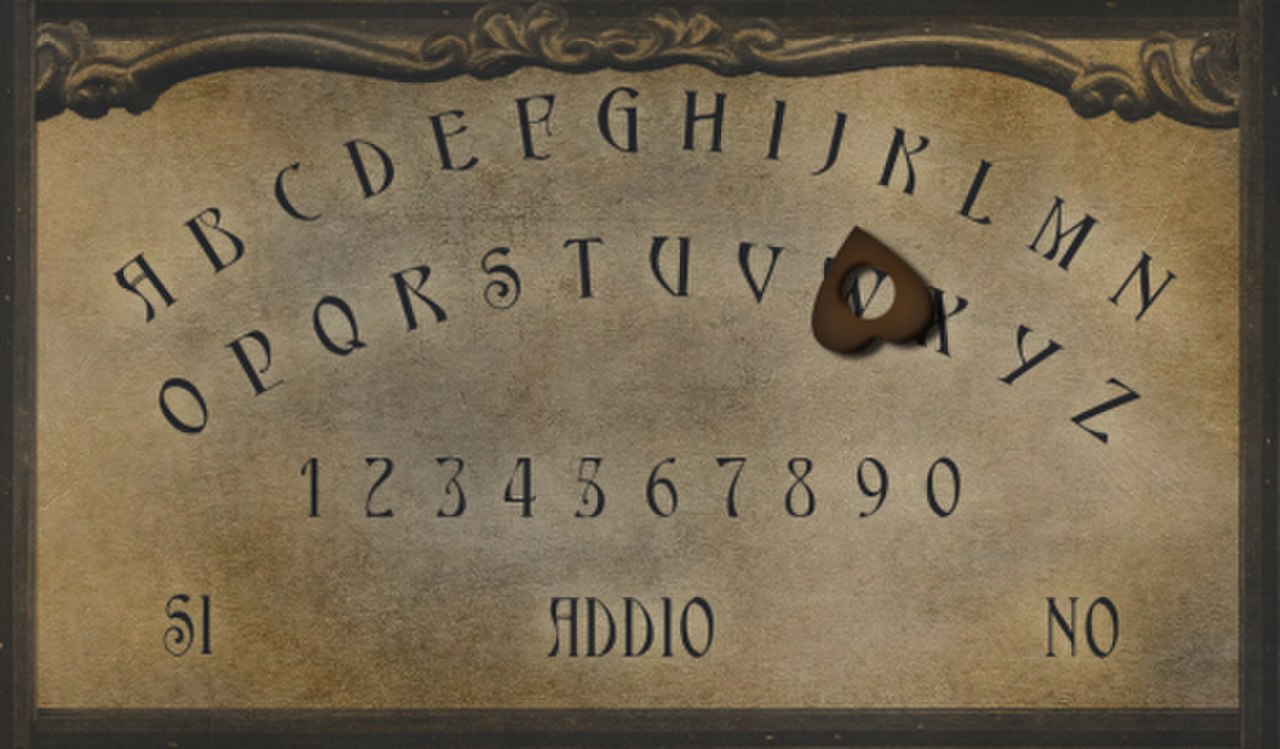
Italian addio is literally "to god" which has a calque in russian: "с богом" (with god)
guiha ~ gnito in cogito, know, знает(знаю) and also (and my first guess) is guess (to guess (гадать))
виджа ~ видение (ясновидение, видение будущего)
with and wit and many other words could derive from this divinatiory device. It is naturally an abecedary, and the ultimate amulet.
why do russians revers ad as do? add ~ do (вложи свой вклад)
взбесился
в с бес ил ся (ил = имел?)
внутри с бесом имел себя?
им~am 've done it ~ уделал это ('ve ~ у ибо обе частицы
psycho бешеный (в бешеном бес, в psycho наверное пёс)
чёрный квадрат был создан в 1915
сравни с red square (красная площадь)
т.о. black square это площадь, заполненная народом.
Профсоюзы смогли поднять народ на революцию? Захватив профсоюзы большевики обеспечили себе поддержку тупых и ведомых. Профсоюзы могли обеспечить выход организованных масс.
В Российской империи до конца XIX в. образование рабочих союзов не допускалось — действовало лишь небольшое количество касс взаимопомощи с незначительным числом членов.
В 1901—1903 гг. по инициативе С. В. Зубатова в Москве и Санкт-Петербурге были открыты с разрешения властей первые легальные рабочие союзы: «Общество взаимного вспомоществования рабочих механического производства» в Москве и одноимённое общество в Санкт-Петербурге.
В 1904 году в Санкт-Петербурге, по инициативе священника Георгия Гапона и с разрешения властей было открыто легальное «Собрание русских фабрично-заводских рабочих г. Санкт-Петербурга». Однако оно было закрыто после того, как организовало закончившуюся массовыми расстрелами демонстрацию 9 января 1905 года с целью подачи царю петиции об улучшении положения рабочих.
russian post-U vowels are ыэюя and that is pretty much ieoua'ic IEUA (ё the ö is at the vav's place, which is funny, since vav is not in the vowel column as well. and vav does stand for o too)
?
weak ~ sick
w ~ ш
?
Неправильное прочтение буквы было бы
I think of how crolean contribution here made the ideo of transformation of words, forced reducism or some other term, made the idea of etymology closer, and it lead me on this path. I would literally not see the aбвгд~опрст
mana is ma en, magicheska energia
Drawing З like ე, I realized that ე is Е, and then ე ვ are like её, and if v~ё, they are Y[ю] as V is named in W: double ю.
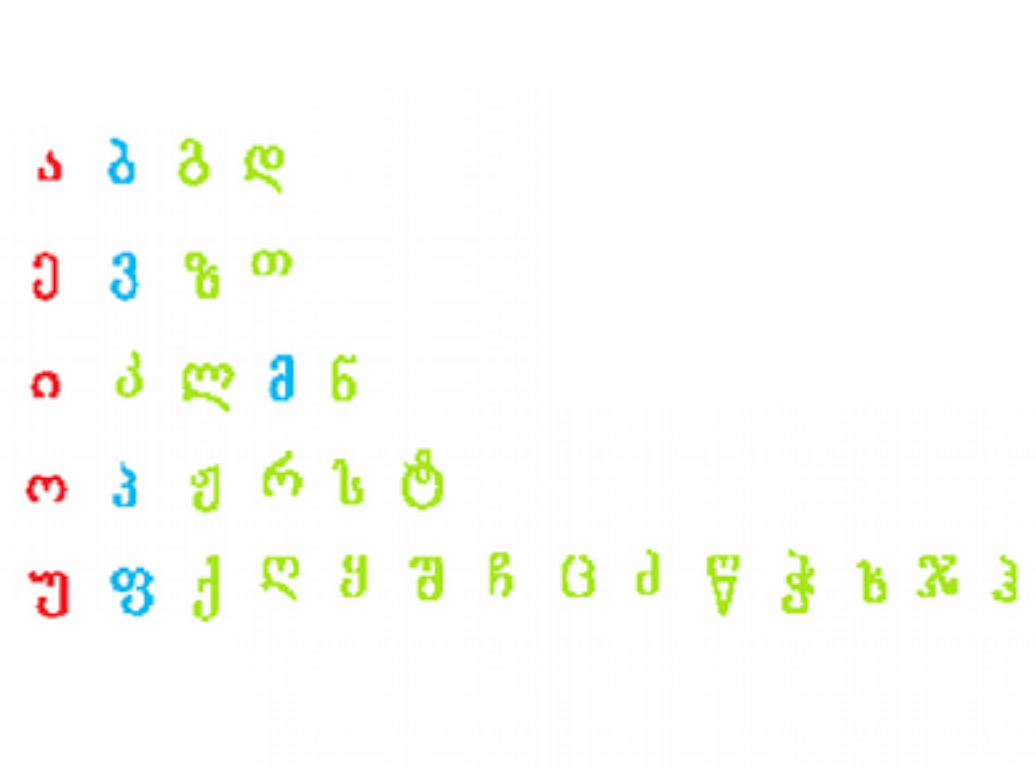
then it makes clear that ზ is g, and because თ is transliterated as t, it is Ѳ
დ ლ ღ are the only three with that lower part like that, and it seems to me they're 123 as დ ღ ლ
დ [d] (д) ლ [l] (л) ღ[ɣ] (ц)
male is single, because we have single opening in our differing organ, and females have two.
Did we consider females having three openings and males having two holes at the sacral area?
But then we have the same ass, why even bother counting it. But this we could understand only later, when we already had ogham, where labials are odd, and linguals are even.
duel is dual?
The mother doted on the elder daughter
How comes I have never even heard of the verb to dote
is daughter doter? the adored child?
dote = be extremely and uncritically fond of.
"she doted on her two young children"
𓁷𓅓 seem to be the only two in egyptian hieroglyphs which look at the reader.

Runes Rusen
bank~gang (thinking of jews as of bankers, baxters, gangsters,
θ exists only in few alphabets because in those other cultures there is belief that it's not polite to show your tongue (as in russian)
grammar is palindromic if not that g, but what if that g is just indicator of what kind of R it is, that it's brittish kind of R, g-R
G is also grammar
rammar is hammah? I try to pull it to SAMMAS of the three mothers. I am pulling everything one to another, that is how I compare them to fing the similar ones.
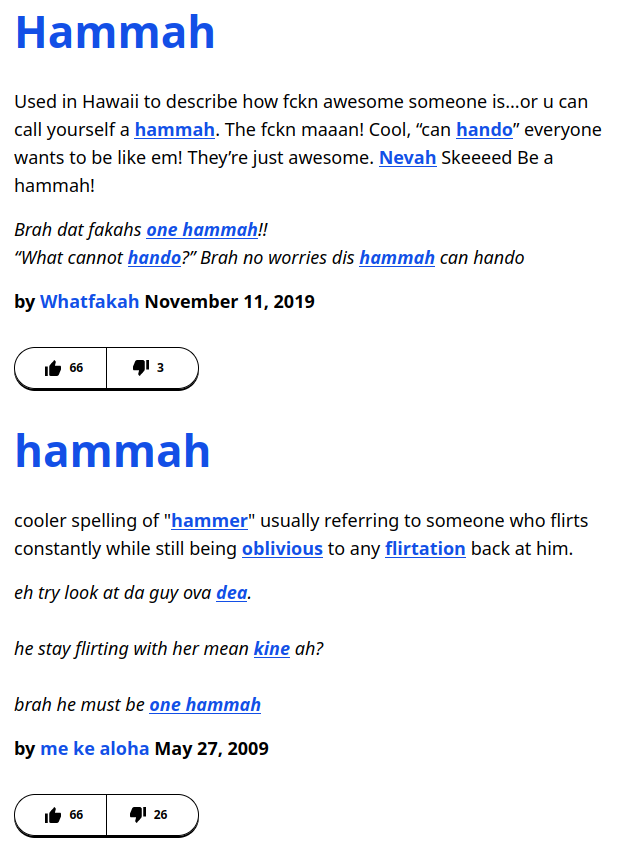
me ke aloha is best regards in hawaiian
greetings from cognates.html:
own (собственный, владеть) русский суффикс родительного падежа (-но, -на, -ън: прошен, брошен, димин, танин, ванин, марьин слово антона имеет суффикс -а в том же значении, что может говорить о некогда носовой природе этого звука (сравни с английским a~an~one))
петров имеет суффикс -ов, что перекликается с греческим н(ν), похожим на латинское в (v)
(и здесь мы видим триединость матерей: гласной -а, губной -ов, язычной -ин (авн ~ овен (own?!))
altus (high (about A being up))
brevis (low (about B(V) being down))
But then brevis is more brief than low, g.trans feeding me these examples is not necessarily correct.
риски резки (ри́ска groove in the form of a line, which signifies a border between parts of a product (for example on a pill) may tell that risk is edge)
первый ~ перший (first)
перший - устаревшая форма. Значит ли это что ш устаревшая форма новейшего моднейшего W?
two different ways to read the same shin. Not sin, win!
200 and 300 are new terms (or some military terms being widely known only recently)
l looking like I and being half j in papillon makes me think iof imn:
imn is amon amen amon as in amon rah
корка
колка (скорлупа (лупа шар? залупа, глаза вылупил, loop, l'oo'p))
стеколка
которого - не японский ли суффикс га это? японские постфиксы га и ва - не разные ли они проявления одного w~ш~s~c~g (г ~ v) ?
beacon beckons
пчела почала
If we unite c & d in one claster, детски алфавит он также и кидский (но нет, для этого мне пришлось и звонкие с глухими объединить
(и не удивительно, что А Б В Г Д наиболле близко к О П Р С Т: раз они более недавно разделились (мы можем не различить д и т, но д от з мы чаще всего различаем))
рунгриш (ru-eng речь)
A B D
E V Z
I M ?
didzdi aLbabid
A B D
E V Z
I M L (n~m, 𓈖)
and here I see that not only kid~cbild(Tells that L is of D. And it may tell that sonors are also a later addition. L = D adbabid (от мамки? от бабки, от бабок (ит как реконструированный протосуффикс разделившийся позже в иврите на им и от))
A B D
E V Z
are A to Z
And the myth tells of five vowels and only two consonants.
A B
E I
O T
U
tittti atbabit
тск всё язычные, потому ttt, third t, not t the t, not tt (k (ck)) but ttt the ш, s, ц, etc.
детки~утитьки (уточки? едочки (дочки!))
дочки детки
A B
E J
O T
U~B and I~J, and Ж tells yeah
A
B E
I
O T
U
F X of some kind V H S and so on
A
B E
O
T U
abe is father in hebrew and catholic, otu is not far from otsu (to father (otets = father, oche (очи? watcher?) = o father!))
or
A
B E
I
O T
And these two pyramids (or are they columns? Remind me of this:
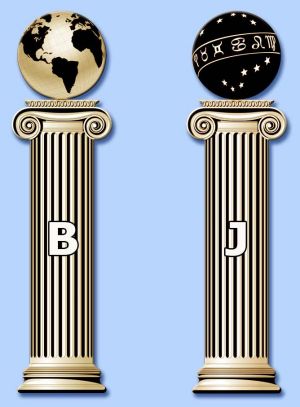
and it tells that B is the first letter. B J are probably blow job, if the gay mafia hypothesis, but it is also (or only) their B T, and when I see them like this, for the first time do I see earth and sky spheres on the top of them. What is it all about? Was I overwhelmed by other elements to notice?
As above so below? They claim power over both earth and sky.
Interesting and natural that earth is B, female. And the sky is J, male, mail. female~fu_mail(без_кольчуги) ?
male ~ mail (самец~кольчуга? в принципе, мужчине кольчуба больше к лицу, но этимология ли это? едва ли, но всё может быть)
в официальных документах
в русском мужчина/женщина
в английском самец/самка
Maybe to avoid the magic of M W
was wan (one) the female way to say man (man was the male way to say it?)
f is upside down t the same way w is upside down м
Древнейший фрагмент кольчуги обнаружен в кельтском захоронении III в. до н. э. на территории современной Румынии, скорее всего был развитием более раннего доспеха, в котором кольца были нанизаны на сеть из струн (такая конструкция, по-видимому относящаяся к VIII веку до н. э., была обнаружена в Богемии)[16]. Л. Хансен перечисляет также другие случаи атрибуции докольчужной брони из колец к гальштатской культуре[17]. Сообщения о находках кольчуг на скифских кладбищах являются терминологическим недоразумением: скифы использовали чешуйчатые доспехи[18].
Первое достоверное упоминание кольчуги оставил в I веке до н. э. римский автор Марк Теренций Варрон[21], назвавший доспех «галльской железной туникой»[22]. Изображение воина в кольчуге можно найти уже на алтаре Домиция Агенобарба (англ.)рус.[23], а в эпоху поздней республики кольчуга (лорика хамата) была стандартным доспехом легионера[24]. Поскольку трудоёмкость изготовления кольчуги была высокой, её могли позволить себе лишь богатые воины[15].
arabic ب پ ت ث make arabic close to ogham. And comparison is possible also because both start with b
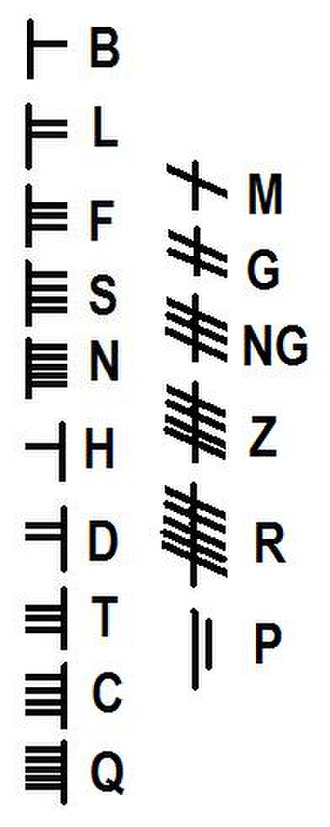
And the reseblance is striking, because
ᚁ and ب both stand for b,
ᚇ stands for d and ت stands for t,
ᚈ stands for t and ث stands for s~t(th)
and it doesn't end here:
ᚃ stands for f and پ stands for p (but the name of ogham may indicate that ᚃ could stand for n, and п is russian p
ᚆ stands for h and ن stands for n, and Н is russian N
I'm not making this up:
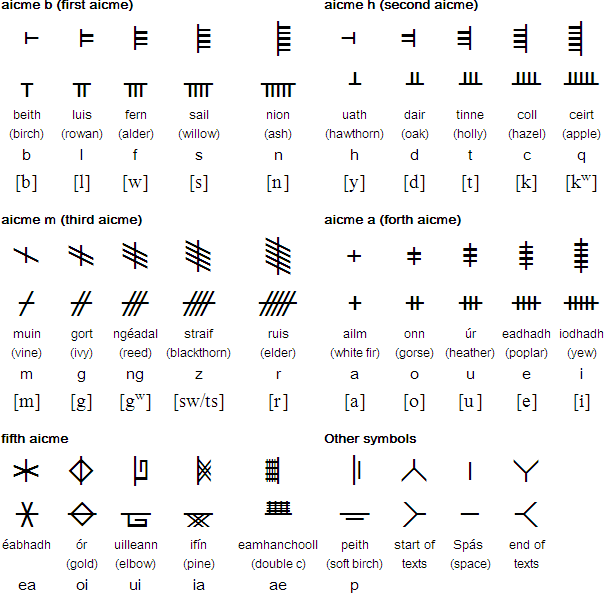
Let's compare ogham to other arabic (and rather persian) signs:
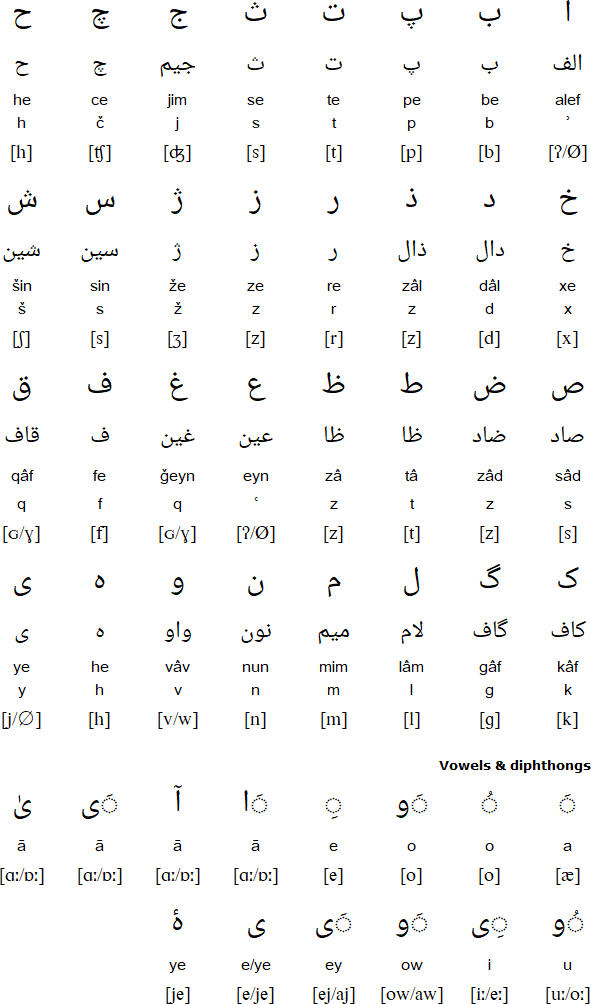
but I don't see other similarities, so those Bs and Ts could be it. The most basic level of the alphabet is the level ogham meets arabic. But they separated for some long time ago so it seems.
B J is also be joyful, and the mason I know is rather positive. It is a wise motto, and if we combine it with the blow job interpretation it is as if one may imagine that the world blows it (with the pants and whatnot as good as it can, you can also grab it anytime to make it feel better, so what is there not to like)
such 4 looks like Ф and as F next to E and E looking like 3 it caught my attention:
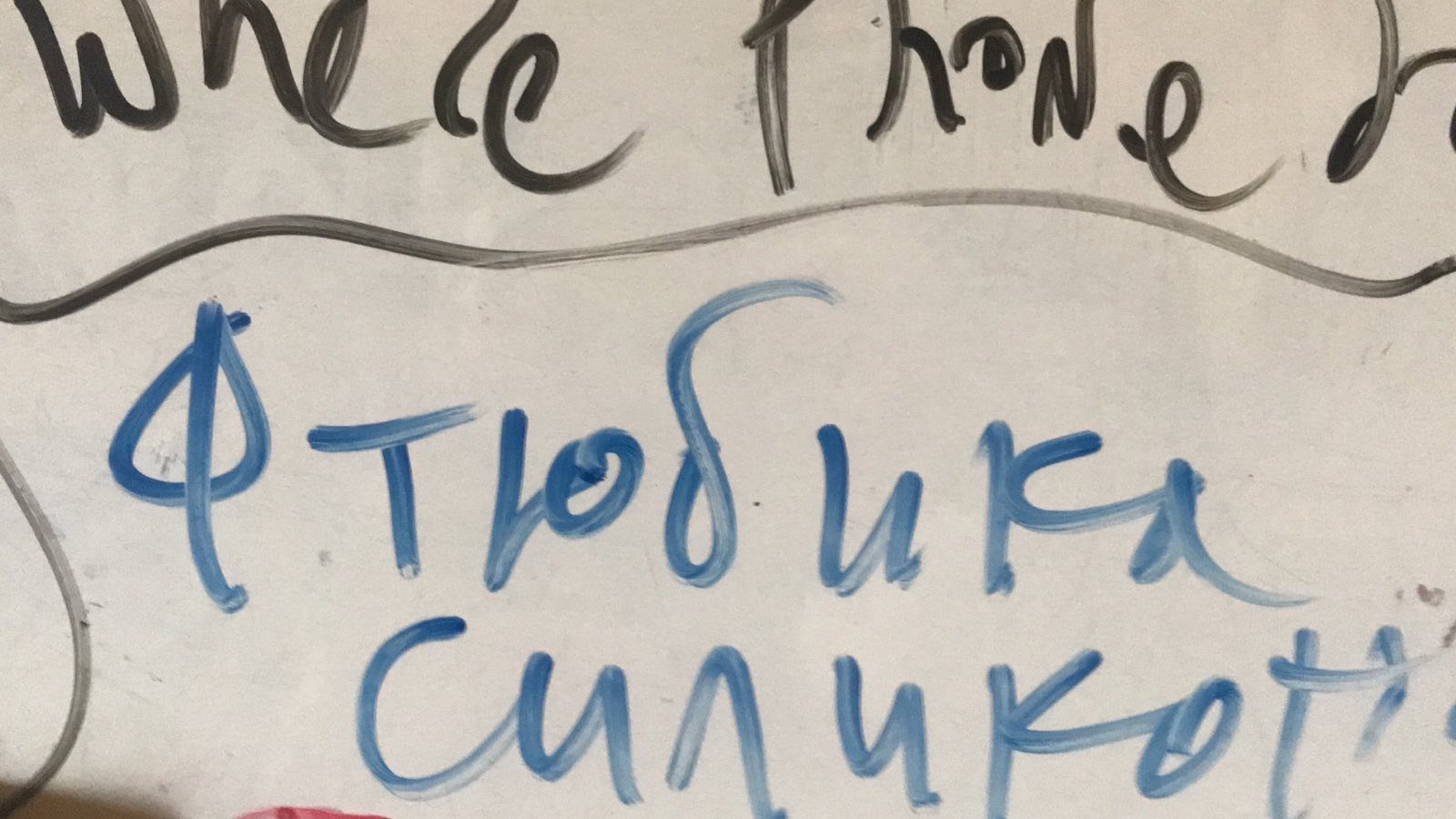
I Z
E F
S Б
S was unlikely at where I'd expect a vowel. But as Z it is more natural after EF (see think greek) because E is not where 3 looks. some reversal of the direction of writing took place.
I S
E F
Z д
I can see Yes in that Iez, or is it yezus? And I see sefard in SFd
I S are lingual. I want to pull E to F: was it Ё? was it thus considered labial? like O, and in hebrew F is a P, which is after O, which actually looks like У (and in arabic it looks like E)
and I saw that I always write 4 like this, and sometimes that swash breaks (here it fades) making it somewhat F-like:
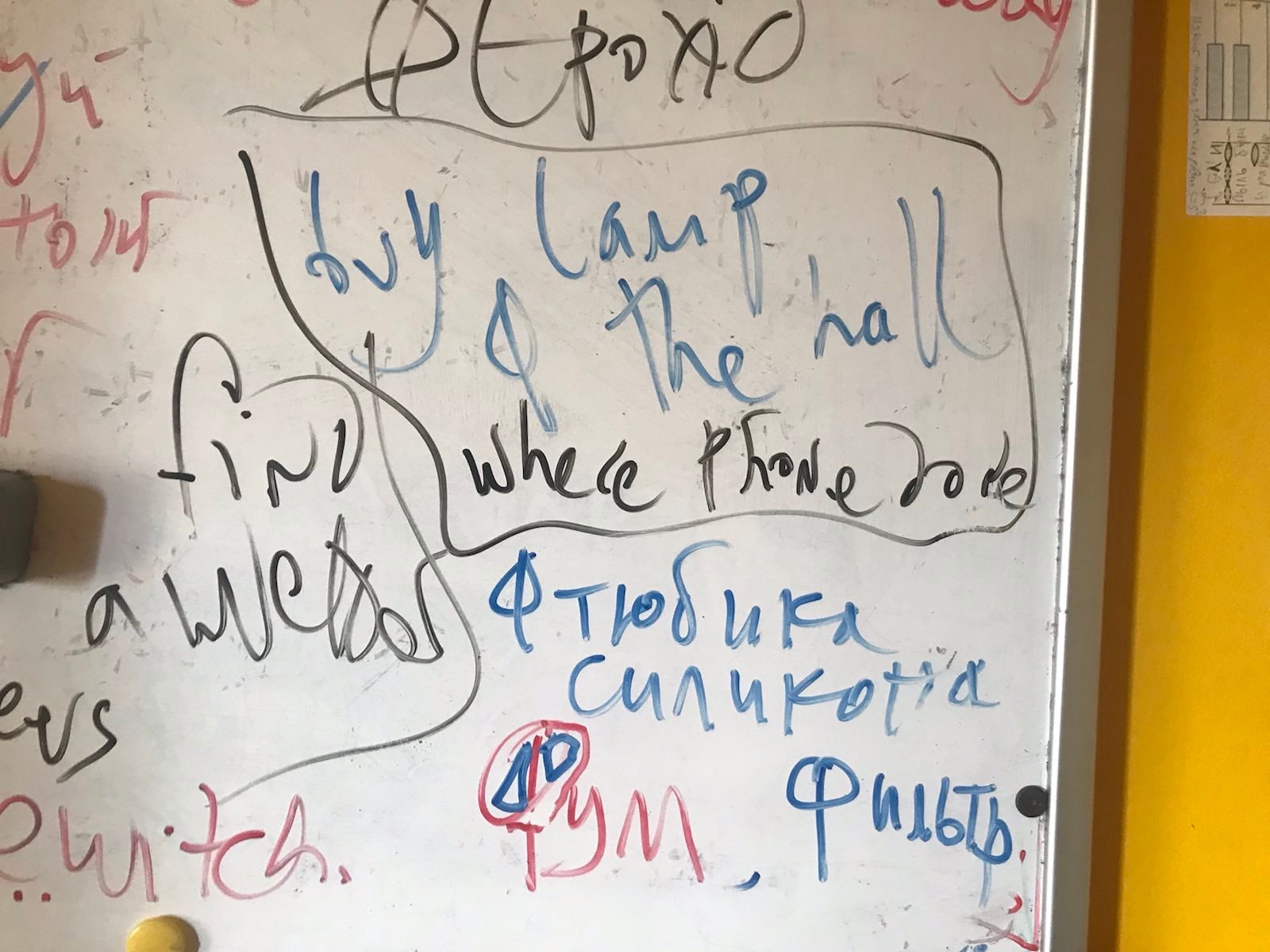
and thus Ф and F are cognates. cognate letters.
and thus Г ~ Т (and yes, in the great two they are C the T
and Ф is double R actually (Р is greek and russian R, making that extra stroke a connecting swash.
Thus labial is just tWo, dVa, dUo, Bi, see, I took them all, they all have labials, and all labials are different, but Mi is chinese Three (and т is russian mt)
To my surprise it's followed by two Ф's, as if my subconsciousness is trying to tell me something, now I know what. But I do have to get busy about those two things, that's why they're on my whitewall.
That eus is of Matveevs, tellming me that latin musculine suffix may be related to russians way of naming the whole family after a man, and that a man is always many.
You can write clockwise until u, for then you'd have to draw backwards.
a b c d e f g h i j k l m n o p q r t all can go clockwise
s changes the direction whichever way you go, but also because russian s is c, and we have it, we exclude it and tell that a to t may go clockwise, some letters even demand it: h, m, n and r do. others yyou can write from top or from bottom to get the clockwise direction.
And only u, v, w, y all demand counter-clockwise direction, and maybe that is why they're considered evil, and all are related (greek U is Y) and u, v, w are all 6 in hebrew.
h m n are like human, r is like rei or Rah
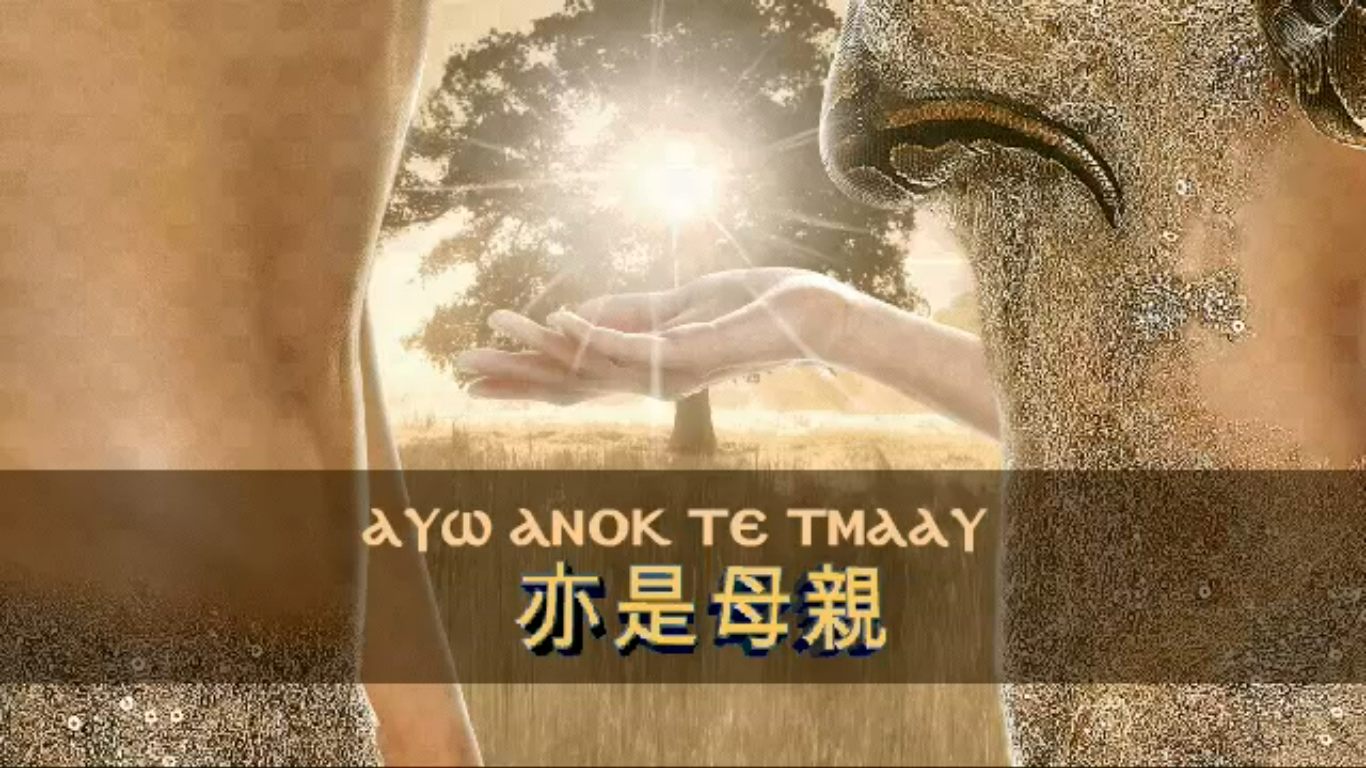
the auo of the αυω the ΑΥΩ is мне (me or rather to me)
but then though this newfound word belongs to vowels.html, it's not greek, but koptic.
and in greek εγώ (I, me) is the word. and yes, it belongs to vowels.html too. Or it doesn't. because it's noy weird minusucule Υ, it's γ the Г and thus I found similarity between minuscule Г and y, which reminds me G ~ Ж ~ J ~ Y (with runic and greek elements to this unpuzzle)
and in the song it's koptic, so it's ⲩ, not γ
and yet is γ looks like y so much, and both are pronounced with tongue, could it be
Ʌ B (Ʌ~Ã~O)
V D (V~Y~I (see И (it's minuscule in cursive looks like u: и)
?
if
бледный ~ беловатый
then
красный ~ кареватый (коричневатый (коричневый = карий (гари?)))
and
чёрный ~ чеватый? чумазый?
and it doesn't go nowhere with the other colours.
remembering navalny protest, I recall what they screamed: путин вор и отпускай (это менту, когда тот задерживал кого-то (словно словами уговоришь)) и понимая что путин будет улыбваться это слыша, а отпускай звучит как опускай, что говорит что скорей всего они (фсб) управляют процессами внутри общества и устраивая подобные провокации тоже. И мой долг поменять кричалки: вместо отпуская говорить поднимай, и если отпускай похоже на опускай, то поднимай означа звучит как поднимай
а вместо путин вор я уже кричал пукин вон, это гораздо обиднее для путина кричалочка
и я пишу это на компе, подключенном к инету, и меня только что похоже что взломали ещё раз (погасло и предложили системыный пароль для входа в систему ввести. После чего запустили систему скинув все проги, я перезагрузился. Или выключить я должен был? в общем, как бы то ни было, я ламер, и давно пора было эти rants перенести на локальный комп без доступа к сети, а так и все твои труды где-то сархивированы (так жэто эе винрар!) но ещё и допиздеться можешь.
Меняй систему так, чтоб всем игрокам было прикольно, даже пунину. пумин, вот такое ему понравится. ny tuh oh wow! путин читается по-английски как питух. ахуеть.
Но раз я вижу это, то надо отправлять
UKreign (kyiv is warmer, so europeans want to visit russian capital in better culture (more free, more musical) and in warmer climate, so the fall of russia has begun. Of course commies sold us to the west for guarantees of personal safety.
and I revisit the upper revelations and I can see that путин looks not like pytuh, but like nytuh, n does look like russian п, and when п and n are in cursive, it's almost absolutely so: п n
(and graphically they seem to be absolutely similar as if (or for) the same glyph was used (the almost part thus is in the unicode of those glyphs))
fried ~ fired
fry ~ fire
try ~ tire (and indeed, it's not hard to find a context where those words are interchangeable)
cry ~ care (I mentioned it before somewhere I found it to be the case)
but neither wry and wire nor wry and wear have anything in common.. wry and ware though..
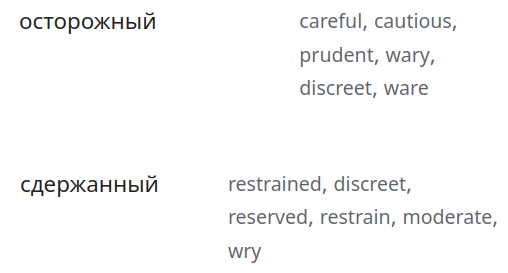
fry ~ firy
fairies are fiery? I wanted to r write (врезать (править = резать (и как rite и как right))
править ритуал, мастер церемоний, как бесстыдно говорят негры, являя корни рэпа в спиричуалс
(я цепанул негров под шалфеем, они махая руками качают аудиторию с ноги на ноги быть может, телом как страничка в книжке вслед за их рукой, мощное движение, по чистой наверное тоже трогает 9но *( *( (но подсознательно)

these fiery fairies could be taken as magic of this world (who knew what mattered when no textbooks existed?
fire was used for cremation in toporunic tradition
When axes appeared, wood cutting became a thing and changed everything.
Truly a revolutionary invention. Axe cannot be made without fire? Metal axe that is I'm speaking of. Stone axes are more hard to cut tree with. Is it? I don't know really. But I doubt mass fellings were a thing before молот тора appeared.
And I thought about the typography I used for my debut and how it was named любавич, энд хау зэрис соу мач ин зыс уорд энд хау трайинг ту куот зэм ай
..ut then humans don't dominate the planet anymore. And here it is wise to exchange power over peace and pleasure (all three are of p, what a letter!)
чуждо ~ чушь, да
русское да подобно японскому да, хотя бы потому, что в ряде контекстов они когнаты. как в этом.
и суффикс -до -дъ -да, и говорит о первичности женского рода. Язык бабская тема. мова. язык мужской, тюркский наверное, белые мужчины что я не су боже мой. расизм оборюдоостр, сам себя порезал, и хер отрезать из-за библии и из-за транссексуальности и от неудобства яиц решил.
if IMN used to be LMN (as words like papillon, Mallorca testify) then couldn't UVW be UVШ? (as words like what in comparison to что[што] may indicate)? Then UVY would be the three. Only then why is lingual double? And isn't Y~Ч? So far I'm only guessing, I woke up with this thought of all the significant triads being ABClike
I just found number 24 in the alphabet:
Let's say the name of god is indeed 5 different vowels, because we know we know 5 vowels, and though the name of god those myths I collected in ა ბ გ დ, 7 is gamut, and a myth mentions the direct connection between vowels and strings of the lyre.
So how would we know what is the god's name?
Did we bruteforce it? I would. And once I began, I calculated how many variants there is, and I found that it's 24 for each initial vowel:
(those vowels are as options chosen, aettir? aecme! And this tells that 5 of pentatonic scale are also not where it all began: three mothers tell that triads matter more, or are they not accords? The three accords I must learn, for they're a meme, for I believe I know them by knowing them as a meme, and now I have the link to my main interest, so finally I can tell learn the guitar)
the way we could bruteforce it:
A AE(AEI(AEIOU AEIUO) AEO(AEOIU AEOUI) AEU(AEUIO AEUOI))
AI(AIE(AIEOU AIEUO) AIO(AIOUE AIOEU) AIU(AIUEO AIUOE))
AO(AOE(AOEIU AOEUI) AOI(AOIUE AOIEU) AOU(AOUEI AOUIE))
AU(AUE(AUEIO AUEOI) AUI(AUIEO AUIOE) AUO(AUOEI AUOIE)
(24 variants)
E 24 variants
I 23 24 variants
O 24 variants
U 24 variants
and 5 times 24 is 120, one third of 360
соловей не от словей ли!
а осоловел значит начал петь как я тогда бухущий вдруг? (от сливовой настойки?)
соловушко
соло (call ~ коль (голос на иврите)) в ушко
собачка с бочка
Уменьшительно-ласкательные как ключ к пониманию! Длинные формы!!!!
кошечка к щёчке
мне нравится
деточка dirt очка? (makes sense two times: you have to clean shit after them, and they're born by the очко-like hole (может раньше очко было более общим понятием? как точка? у нас текстов лишь на сто лет назад, но может в родственных языках когнаты тем формам остались)
варешка варешечка
молот молоток молоточек
молоточек = молот точек (и действительно, маленький инструмент работает не по площадям, а по точкам (любая физическая точка есть маленькая площадка, но точка в сравнении с площадью (приблизительно, the best we can approach to the mathematical dot))
молот имеет точку в этой т? нет, едва ли, скорее суффикс ть ~ to ~ daJA
to ~ do, I do something to something. And molto molot does
ауе [aue] is a vowel abbreviation, not very often can we see such. and I can see that it's alphabetic:
a is pure vowel, u is labial, e is lingual,
to record something is to return to something
Were those 5 some numeral system? Because 24 is not only combines into 360, it is also the number of hours in a day. And what else could cause this weird double 12, 3 times 8, 4 times 6, next to 5 square (see pyatnashki game, where 15 is in a 4×4 squase, what could prevent 24 in 5×5 square game to happen?
But then were they vowels or were they just three vowels aand two labials?
ABUET отличное слово ОБУЕТ (A~O (да и читается-то Абует (абует~небудет (если кто другой обует сапоги, то их у тебя не будет, например. Или если кто-то тебя абует на что-то (как Абу-южанин-пришлый-вор (как пришелец так и ушелец))))
ABETU
ABEUT
ABTEU
ABTUE
ABUET
ABUTE
AEBTU
AEBUT
AETBU
AETUB
AEUTB
AEUBT
ATEBU
ATEUB
ATUEB
ATUBE
ATBUE
ATBEU
AUBTE
AUBET
AUEBT
AUETB
AUTEB
AUTBE
ATUBE is a good name for a video service
ATEBU is a good flirting strategy
ABETU is both alphabetic and meaningful абету (обету, обедаю, обитаю)
? Is obey of abe(father)
ABUET мае сенсу коий мы обсудили ранише
ABUTE is the previous word in a more prayful manner.
AEBTU is double interjection (the etymology of this word is calque to russian междометие, ject is not to throw, but to spray? like jet? метить между.. метать? ковно метают? как икру? мечут. метят)
and yeah, the second part (the main part) of it is матерщина (vulgarism, prohibited word, which may make it magic)
huy as Hij!
pizda as peace desu
ебат is eb AB!!! ебать ~ иметь (all the labials are one)
quadratic nature of alphabet make me want to sing it.
A B C D
E F G H
and then song changes it's rhythm? Or was it just changed by somebody else? by some editor, censor, reformer, usurper
I J K L M N (also I M NL or I M L N (but nah, immanuil tells and NL is more telling than LN unless it's line))
O P Q R S T
and that is it. Четверостишие!
Aднажды В СтуДёную (Зимнююпору)
Eа иЗ леСу выШел
бЫл сиЛЬный Мороз
гляжОО Подымается медленно в гоРу
лоWадка везуXая хворостY воZ
выше гонево конеш, хотя кто знает как писхика кработает, но именно что четыре слова с ударением на тот слог, это очень возможно
уАнс аПон эТайм
зЭа лиВд э энд нау ай хэв назинг беттар бат ту шат ап, that is the standart and further greeks and latins don't even agree, but then they have different languages, so national languages are different because they're translations, and grammars are always different. Cool, cool.
я одолел (протоактивная форма)
он околел (протопассивная форма (пассивная но не в нашем понимании теримна))
жив~live if these two are cognates, then lingual are one thing: зола, сажа, соль, всё твёрдые вещ-ва, вода с губной начинается, как и её когнат water, aqua~liquid they have that somwhat labial qu, labial in that W part, and they both have it like this, and it makes me feel like those words are cognates, and it reminds me of what I just said in a letter to a friend:
про такое мультик предлагал пилить десять лет назад, в итоге только вот такое что-то получилось
https://youtu.be/tmBbL0uW-eY
должно было быть в динамике, где вдох-выдох как Ʌ и V (live! или жив (что-то среднее)) и оттуда Ʌ~A~Д~Т и V~B и сначала три гласные, после пять, после где-то семь, но уже многоголосица и где-то нестроит, и рубилово оттого может, но это я на ходу сочиняю, нет сценария, я бы как стихи пишут мультик снимал, чтоб не знали что будет в конце даже сами поэты поющие (я скорей всего не знал каким будет финал книжки когда сел её писать, просто изложить всё что уже знаю задался целью и за три подхода одолел, после пол-года редактировали, и вот, такое охуевшее печенье, что аж сам сияю
Участники рынка продают и покупают, участникам рынка участники рынка рынок и создают, они все продают и покупают. Больше продавцов уникального выгодно всем (уникальное не конфликтует с твоим, уникальное расширяет ассортимент рынка (то, что делает рынок интересней) а прибыль? абстрактные бумажки, на которые можно покупить ассортимент.
Значит нам выгодно, чтоб Япония была богата, потому что тогда они выпускают первоклассные товары. Первоклассные товары нравятся всем. Но что быть с американцами, чьё производство стало менее выгодным? У них есть преимущество: они европеоиды, а значит способны изобрести новые бизнесы в то время как остальные довольствуютс повторением уже существующего на рынке.
Это вызов, и не удобство, но американцам выгодно, чтоб русские стали богатыми, если это
Пятнадцать месяцев по 24 дня это 360 (градусов и скорей всего дней в году)
(предыдущую науку (с алхимией, астрологией и прочей херомантией) отбросили именно потому что они сделали далеко идущие выводы на основе неточных данных)
дни недели - уникальные комбинации пяти букв
были эти символы планетами? Было изначально лишь солнц и луна? Мальчишки ярче (умнее) и земля пришла последней? Или это три луны, земля и солнце? Земля как слон, её ли не заметить, может раньше вообще было небо и земля (шамаим + эрэц)
Или было ш читаемо как w везде? wamaim, all labials would be great, because erez is so male, even vowels are lingual. wamaim doessn't have labial vowels. woman is not too far though. is english engels indeed?
Maybe the hollywood movie se7en brainwashed me to ..
облако ~ о благо ~ о влага (валгала на облаке? wall гала (галло?))я гадаю, не научно (не учили такому меня)
Russian language definitely can be an asset:
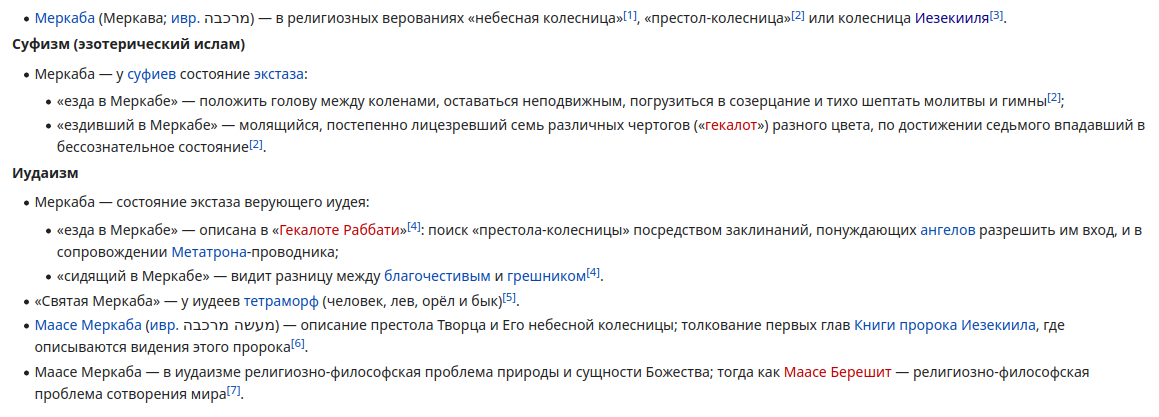
but then they also don't show the shape which is known as merkaba amongst esotericists:
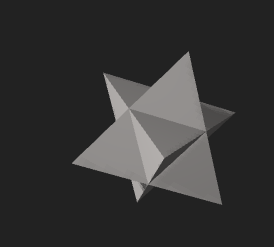
Stellated octahedron, which is two tetrahedrons merged at centres and from the other poing of view it is a cube with twelve pieces symmetrically removed. An interesting figure indeed, but who are those esotericists? Drunvalo Melhisedek for one, I couldn't read it, because it was such a babble for materialist me, so I presented the book to some more grateful readers. And so they say:
Some modern mystics have associated this shape with the "merkaba",[6] which according to them is a "counter-rotating energy field" named from an ancient Egyptian word.[7] However, the word "merkaba" is actually Hebrew, and more properly refers to a chariot in the visions of Ezekiel.[8] The resemblance between this shape and the two-dimensional star of David has also been frequently noted.[9]
in which context it is interesting that
The obelisk in the center of the Plaza de Europa [es] in Zaragoza, Spain, is surrounded by twelve stellated octahedral lamppposts, shaped to form a three-dimensional version of the Flag of Europe.[5]
is бог a short form of богиня?
or is it explicitly boy (oh boy ~ о боже)
doesn't it tell us the story of ᚼ ~ ᛡ?
is it ᛒᚮᚼ or ᛒᚮᛡ?
ᛒᚮᚼ doesn't return any results, neither in google nor in yandex
ᛒᚮᛡ doesn't return any result in google, but yandex finds:
ᛑᛆᛨᛒᚮᛡ. ᛒᚱᚮᚿᚤᛂᛒᚮᚤᚿᛦᚤ᛫ᛑᚮᛨᛑ' Пѹтинъ ебѭтсꙗ съ пиндѡсами съ бѡльшѡй скѡрѡстью нетѹ вѡ нѭмъ пѡкѡрнѡсти. Аꙁисъ Мраꙁишъ. and what the runic line tells I do not know (and the other part justifies my keeping these volumes offline. either way, that line is somewhere in https://infametr.com/all?page=38893, there are many thousand of pages, so maybe some day I will download whole the site and ctrlF the contents)
Love ~ Laugh
is feaR literally the semordnilap of Love?
It's funny, that english speaking world seems to only recently get this concept.
or was lukashevich that influential that russians know it as оборотень (also a term ambiguous and less known than palindrome)
And because this term is so obscured, even though it's even more significant than the classical palindrome is, I announce semordnilap the clue to use, but maybe all anagrams are such keys? morph~form is a bright example, that some jokers used this trick to make new words. And it would be only natural that they would have the same meaning most of the time: икибоб = бобики
But morph form is more raw form, just some morphemes placed differently
Listen ~ siLent
leesNL toEN unFR?
se Le into? se le want to?
google didn't recognize un as french word, offering only translation for latvian un "and"
in french un is a, an, one
And if those are the same un, then , the comma is нот онли и (i (dot with a tail)) but also one when you перечисляешь: list:" fish (one) cheese (one) milk (two) ~ fish, cheese, milk too (and though the meaning is somewhat different, it could be misunderstood like that. so is two = too = to? if and is one.
and
to
me?
for
fine? funf five g пфть пять
sex!
шы G 5? 五?
ab
34G
HIJKLMN some letters are not from here, probably, or is there 0 before a?
С новой строки!
а b
e f g
h.. but h is haha, and looks like 八, and は the ハ, thus G ~ Г ~ 7
thus F = 6 E=5? D = 4! C = 3, B = 2, A = 1...
A1 B2 C3 D4 E5 F6 G7 H8
I1 J2 K3 L4 M5 N6 O7 P8
Q1 R2 S3 T4 U5 V6 W7 X..
first of all, it's all a failed testing experiment, second,
Q1 R2 S3 T4 U5 X6 Y7 Z8
and.. it leads me nowhere anyway, rather than 26-2-24, big surprise
getting my first glasses I return to the books I left for years:
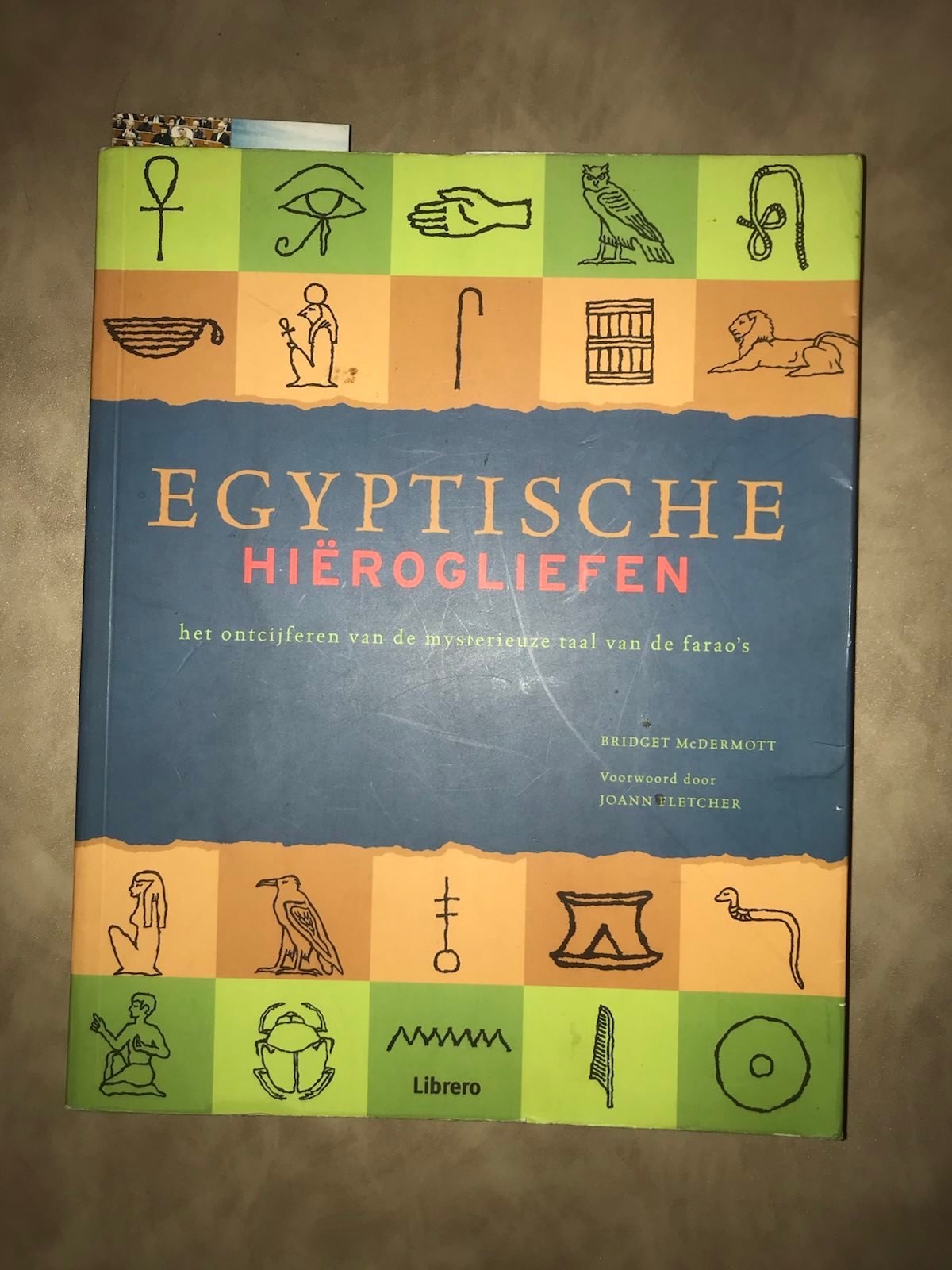
and what was my surprise when I opened it of all pages on this one:
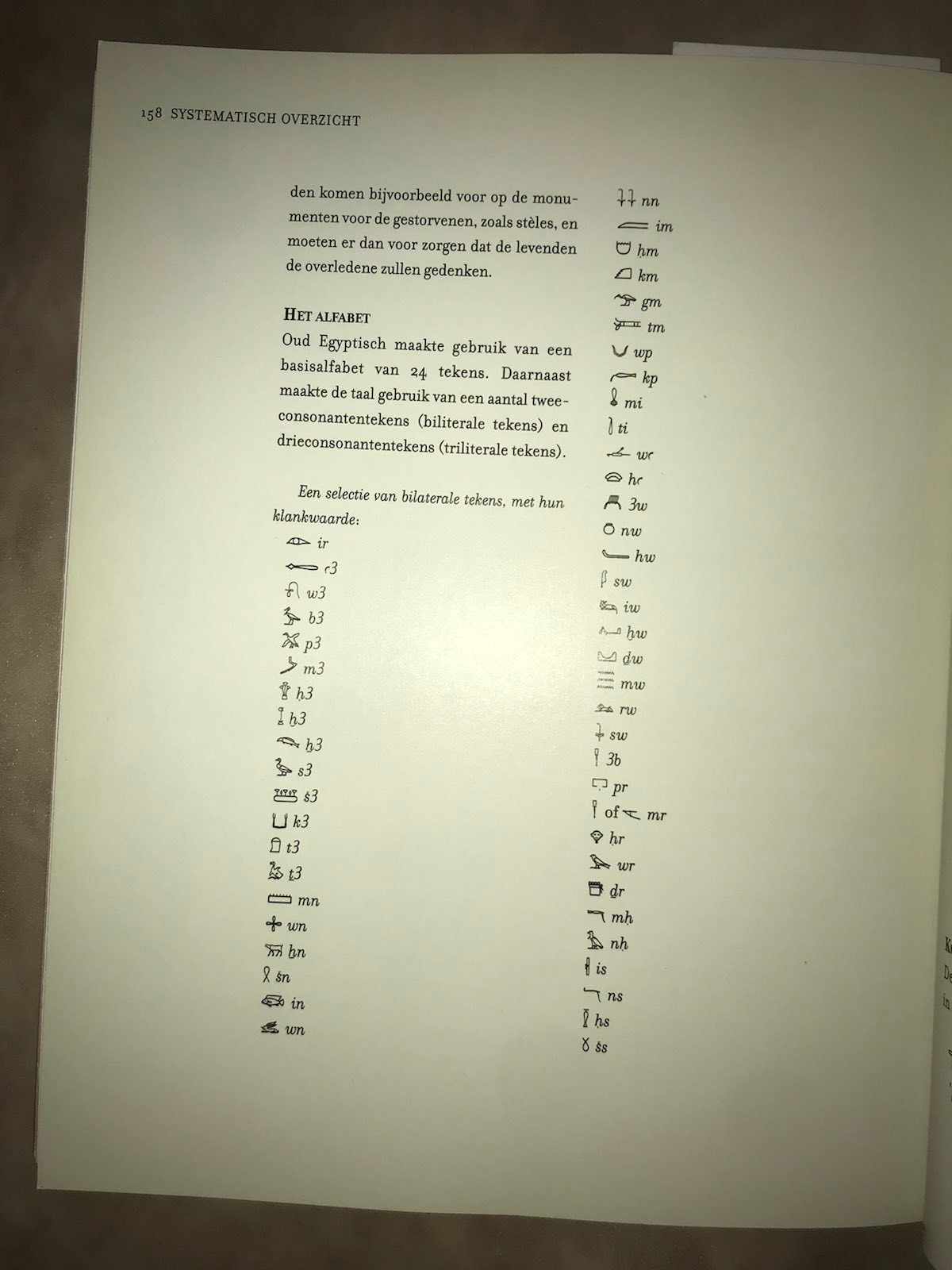
The alphabet
Ancient Egyptian used a basic 24-character alphabet. In addition, the language used a number of two-consonant characters (biliteral characters) and three-consonant characters (triliteral characters).
Couldn't these be the ancestor of the paleohispanic syllabaries?
Comparison never hurt.
The exact number of 24 make me think of those signs used for hours and maybe for zodiac, and for months?
Was it 24 instead of 12 because year is not even, so priests would have to announce year of this or that specie, and thus to have 365 or 366 days per year. Just a guess.,
Was 360 the minimal ammount of days? The first attempt at measuring the length of a year, maybe. But how could they get the 5 dfays cut too short? imperfection of the instruments? having 12 months (6times2) of 30 days (6times5)? and why am I guessing? This is how I think, fixating my thought on paper or what is it? The electronic paper we all were promised? noteBOOK
Фламель's book gives some other perspective has to the on the pilosopher stone
And shallow reading of it and some in-depth reading about it made me think that what it describes is getting of gold our of rude material. I just had this impression pondering about it in sleep I guess, for when I thought of it, I soon had this impression.
And I read when they learnt of how to get gold out of the ore or something else, and I found that the date is related to when scolars suppose Flamel's book was actually written, it transmitted in secret the way to get gold out of ore and such:
Like all metals, gold is insoluble in a water. Gold does however exhibit the distinctive properties that in the presence of cyanide ions, it dissolves in the presence of oxygen (or air). This transformation was reported in 1783 by Carl Wilhelm Scheele, but it was not until the late 19th century, that the reactions were exploited commercially. The expansion of gold mining in the Rand of South Africa began to slow down in the 1880s, as the new deposits being found tended to be pyritic ore. The gold was difficult to extract from such ores.
and something else from ruusian wiki (could be interesting or not, just in case)
Золото в России добывается с 1719 года, когда методом Ивана Макеева из нерчинского "сырого серебра" было извлечено золото
With enlightenment people not only found all a lot of the hidden knowledge of previous millenia, but also recognized al in alchemie as the the article (as the facebook became facebook)
The idea that alchemie is all about extraction of gold ..and immortality? Some panacea? Hashish that could be. Hashish not only has some miraculous medicinal features, but it also preserves the youthful nature of the soul.
And though possibility of some actually immortalizing in young body panacea existing is not nul, I believe that it is way more probably to invent it today (or even to wait for others to invent it now when I know who are the superstars (who succeed in the field))
морг~моргнуть
жмур~жмуриться
(у всех слов корень скорей всего мр)
умер ~ у mere?
paint ~ penned?
it's all funny, but isn't it just poetry? well, this book contains plenty of various stuff, so why shouldn't it contain some poetic ore
Is rainbow always in the morning? I doubt so, but autumn sun is somewhat different. it's geometrically at the other end of the sky and horizon.
Runic myth of Odin mentions 8 songs, but then mentions 18 runes (rune is song in finnish)
пей is more basal than писай
писай is literally cъ пей
пил (il)
пью (io)
and this romano-germano-slavic unity explain language of one another
.png)
this I knew, and this I didn't know:

it is in thirteenth or in fourteens for my book
And because in
rune ~ ruin (the first association)
ruin is рушина
украина is too close to урина
Я сложный человек (например, хочу умереть и хочу жить вечно в одно и то же время)
Так разложись! говорю я себе. Говорю ли я что сложение противоположностей составляет сущность жизни? если да, то это было неумышленно, подсознательно.
Сталин сказал"приход коммунизма (отмирание государства) будет связан не с ослаблением го-а, но с его максимальным усилением. И здесь либо он провёл ревизию марксизма (но нет, маркс завещал не то что на поверхности лозунгов было) либо предсказал отмирание го-а вопреки его усилению (можно такую интерпретацию продать сталинистам, когда они будут хотеть вернуть всё взад)
Украина will be, or already is, the ce3ntre of removal of the state.
Lviv, Kiev, are all good names, Ukraine, Russia, are too Ur to be natural I wanted to say, but saw oUR
Украина only reminds urine,
Русь reminds срусь.
И вижу я что Украина is different from urine by that ka,
and noway that's a coincidence, those nation terms are deragotary.
Russia is of rus, which is literally дерёвня
r of rude, but also of rune.
The land of trees gave birth to the tree myth? Wasn't Skandinavia
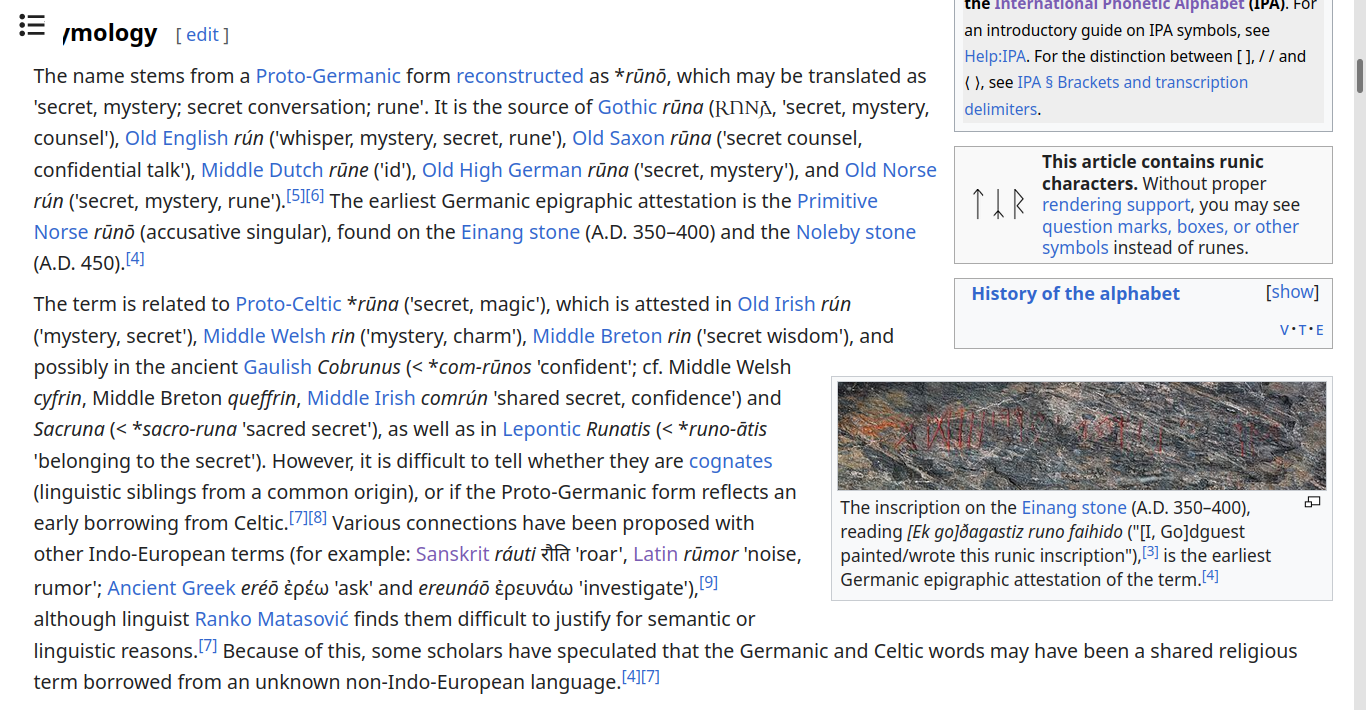
what a weird case of misetymology! How could they ignore the cases I found. But easy, google translator tier linguist, let's double check it:

so far so good, but what is this:

using seamonkey instead of firefox I once again get different results. What is it all about?
let's check it at firefox:

very interesting.
So nine runas and eightieen runas are direct and reverse readings. Algiz~Zigla?
A to Z?
like really, what were the chances! I thought about algiz yesterday, less than 24 hours ago, and I thought of it in the context of Mannaz, and thinking how A is the first letter and M is the greatest letter, and being IMNL, it is the first letter of the second half.
A~B case that A~M is
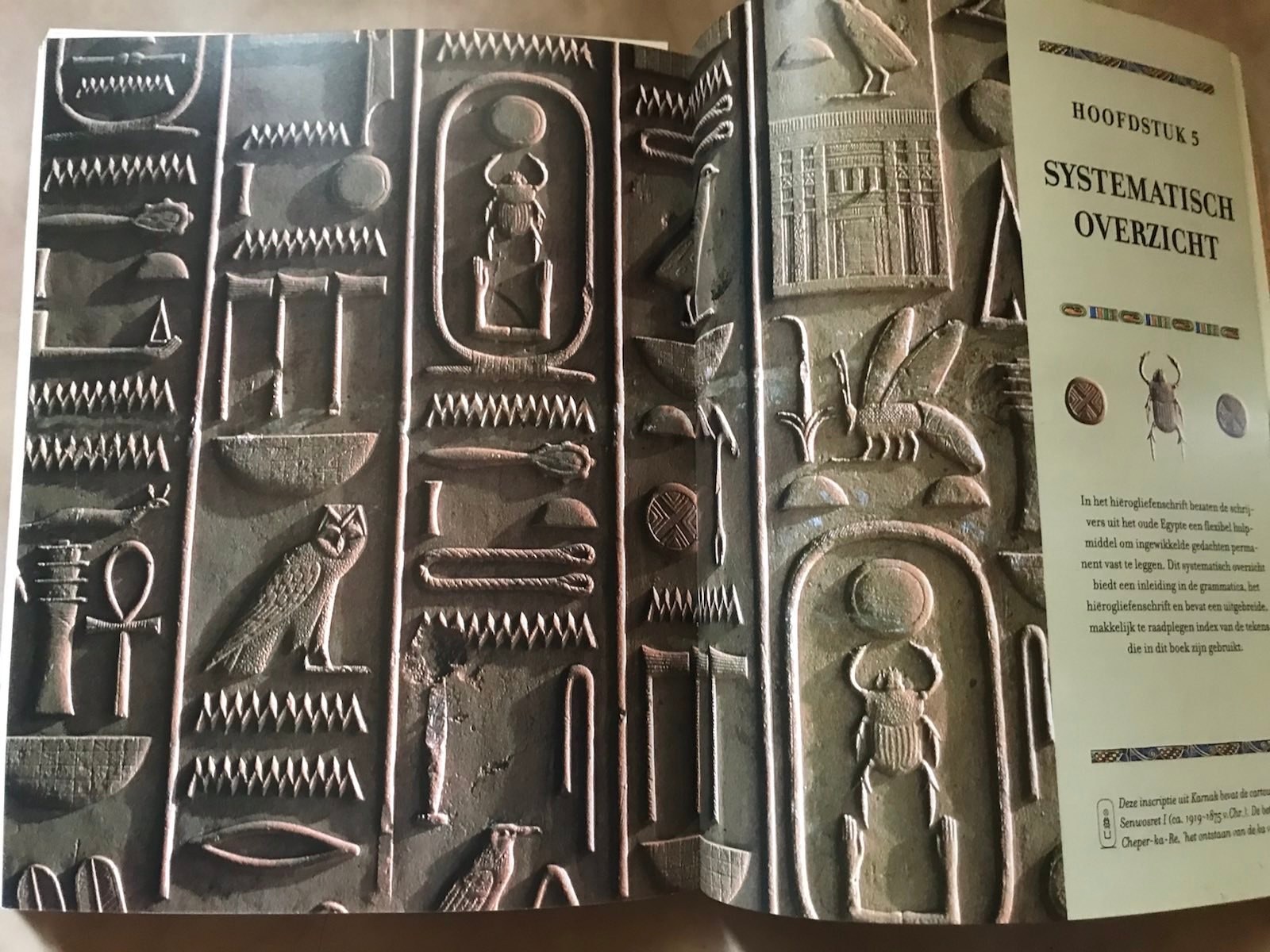
This image made me believe what I already thought:

and if reading my thought or have I thought it right, google images only give me examples of 𓈖 standing at the end of the message, as if telling that a single one at the very end may be the dot too.
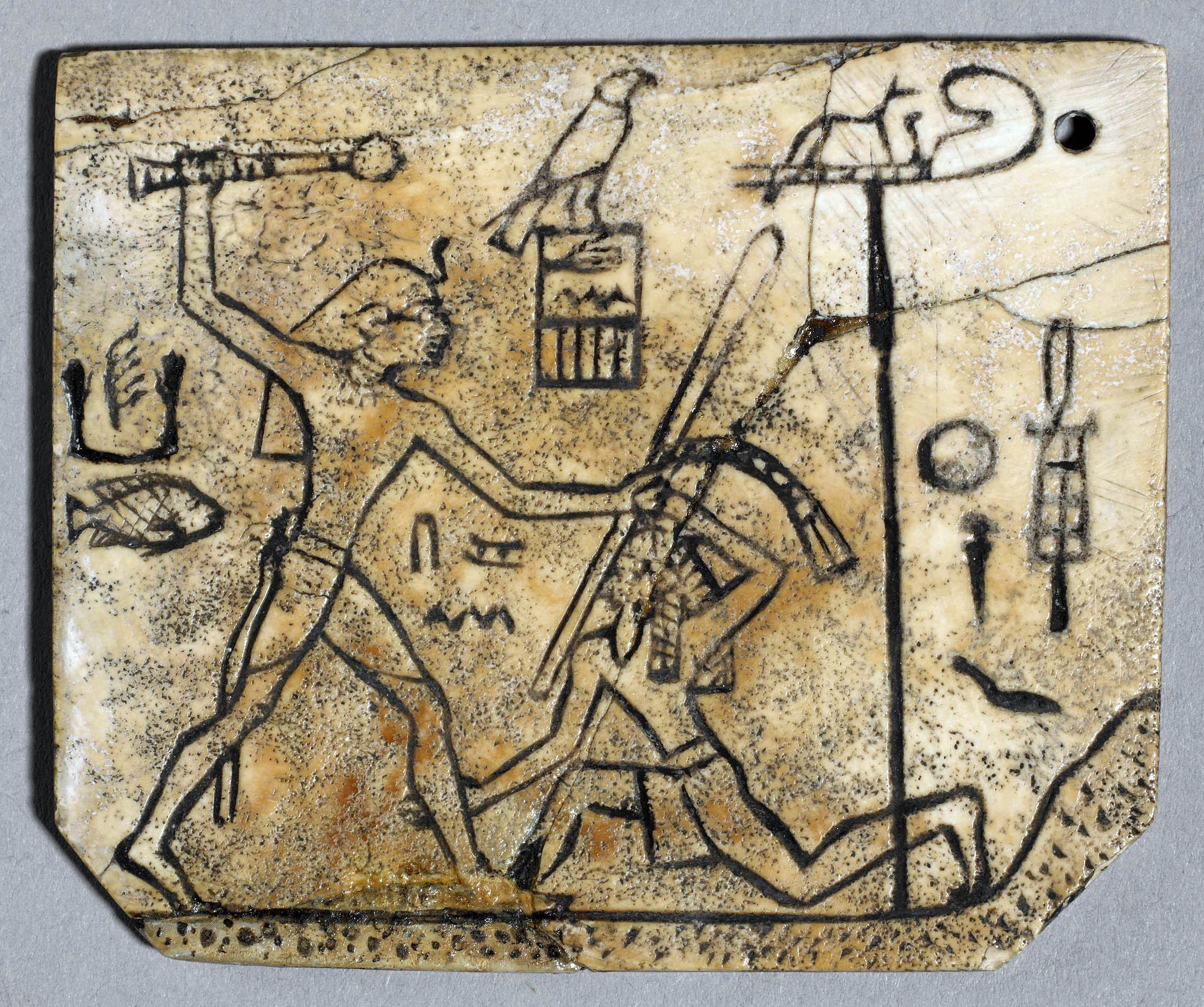 what a nice fighting
trick (and it's also drawn in the shape of lucky swastika)
what a nice fighting
trick (and it's also drawn in the shape of lucky swastika)the other case was
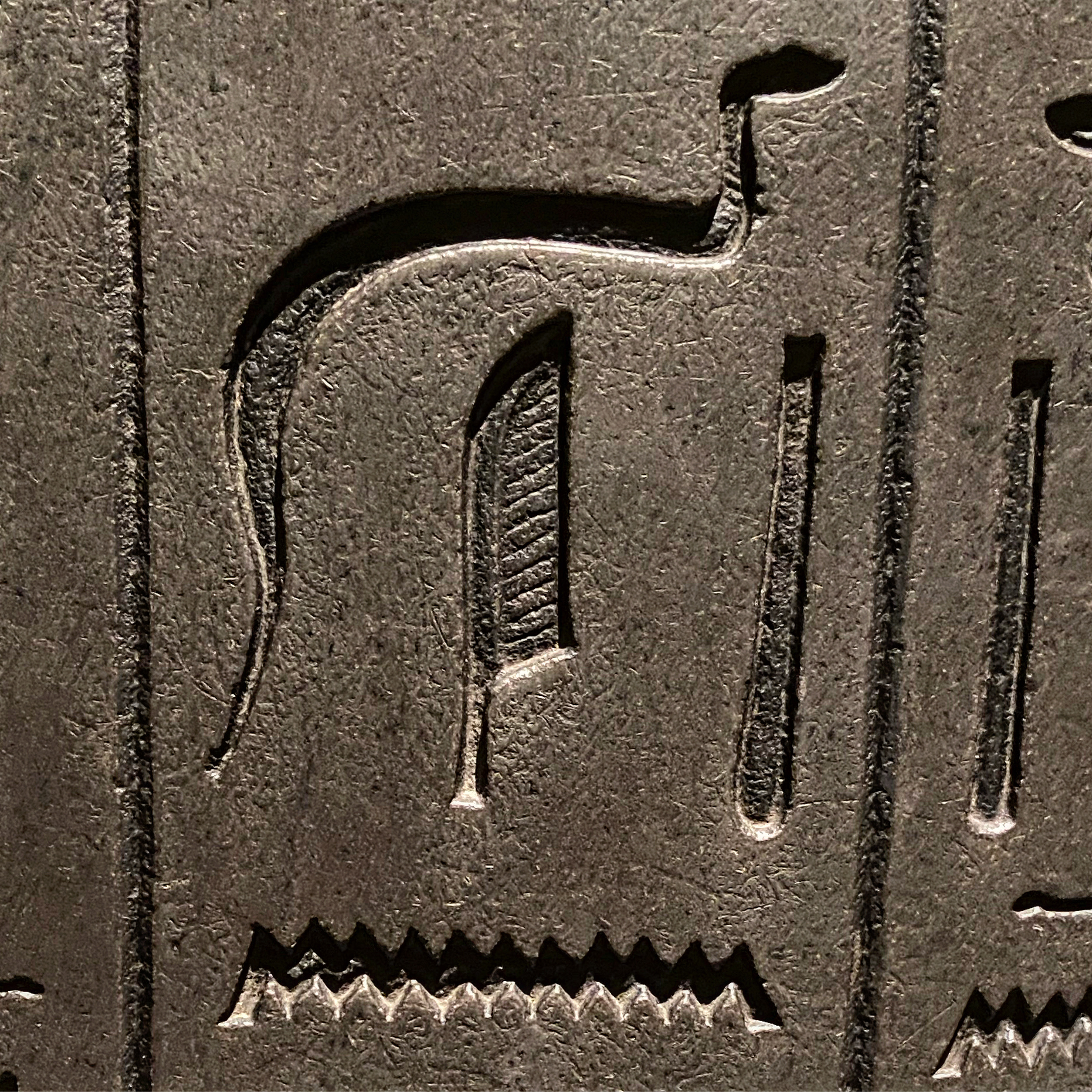
which makes me hope that whoever took this photo could actually read the word.
and they did: Let’s learn some hieroglyphs 𓊹𓌃𓏪!!! Here we see an inscription with the symbols “ 𓆓𓌃𓇋𓈖.” This is a really popular introduction to an inscription and it translates to “Words spoken by… 𓆓𓌃𓇋𓈖.” “𓆓𓌃𓇋𓈖” is usually followed by the name 𓂋𓈖 of a god 𓊹 or goddess 𓊹𓏏.
The only third authentic egyptian found by 𓈖 in the search bar was
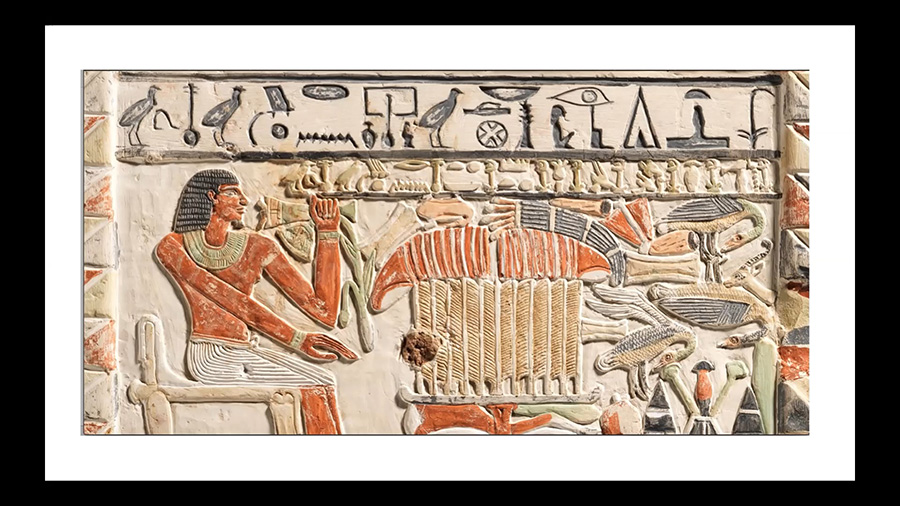
Here I notice that 𓈖 divides the common part in those two lines.
And the link leads to the site of РГГУ, and switching to the page I saw face of Knorozov (and today I'm shocked by how few little people know about him!) and there I found the page it was going to and it told me that that year was the year of his 100th anniversary, and I checked the date and found that I published my first actual book on his birthday (the process was in some stage at his birthday, and even though I cannot say the exact day the printing press was working, what were the chances anyway!
It could be such and such does(eats/drinks) that that and that without commas in one flow (as you can see, I still don't know the language, I'm only guessing) as if those were the instruction of what to sacrifice or bring as a gift to the guy or what is it with such an underdeveloped tit.
𓋴 [s]
A rope could hold the phonetic meaning to the letter S, because rope makes whistling sound.
c[s] could be directly relating to that egyptian hieroglyph (or rather a letter)
цветыRU ~ квітиUA
This cognatic pair demonstrate how C was the same in all its forms when russian and ukrainian splat split their ways.
sanatan = eternal (could this sanskrit(?) word be interpreted by the kikes as satan? but then = tells that he is a shivait, and according to evropean (kike = evrei) way of looking at things, destruction is death. So that verbose oldman is a liar, deceiver, satanist according to the european point of view, a representation of savage hordes who can only compete in destruction, that is also why they live in shit, but they seem to not mind it. (kikes are probably of cohen, каган, khan)
they Do not Mind. and isn't it what makes humans apart from animals.
(that man reads sanatana)
дай мне это
три основных слова, далее трансформирующиеся в более сложные предложения.
Обратил внимание
dark (непросветлённый) путь нелепо туп, там отрицательные эмоции. Зачем? страх, ненависть. Зачем делать врагов, когда можно делсть друзей.
light (лёхкий, светлый) путь прекрасен не только тем, что это любовь, но и тем, что это игра с ненулевой суммой. Игра с прибылью, как успешный бизнес: Секс приятен и мне и тебе, и ребёнок радовать должен, даже хоть роды и болезненны.
И не болезненность ли родов породила дуализм? Идею, где за всё нужно платить. Где любая светлая сторона имеет тёмную. Инь Ян женская (ведьмовская, тёмная) традиция?
Только свет?
Абсолют?
Абсолют!
Время нужно когда варить.
ВРемя ВаРить
where?
вар~заваруха~war
тётя варя всех поварит переварит выварит
в~c: высерит
варить~сарить~жарить? чарить? морить?
варить ~ морить ~ жарить (ть глагольный суффикс идентичный английскому префиксу to, а р похоже что огонь! аш! RST claster, if R is read the chinese way, then ЖCТ ~ c read as K and Г
Oh wow! K is half Ж, Г is half T, O is double A:
А К Г
О Ж Т
and the font above agrees with me when k is aligned to Ж by an extra space above
оr is it rather
А К Г
O Ж Т [O Ж Ш)
If S is the final letter, as in sefer yetzirah?
Then is K double Г?
Because Ж is double Ш?
Ж before S?
indeed it is.
Are letters mostly the way they came?
Дай мне это
Give me that doesn't go abc (only because Give is not vowel? Give~Have~Ave(awe, owe, own)
but that could demonstrate how good I am at pulling, because more cognatic to russian formula will be
Do me it
Vowel the last? The way they are in sanskrit separated from syllables.
шивайя ~ живая
Pervushin makes my hypothesis of russian scientists having surnames ending in v false.
дай мне это (with davay~give saying g is both g and d)
this formula tells that linguals before labials, as it is in sanskrit, and we'll probably find more roots, like arabacada is arapacana is.
A is a door to the insight that all dharmas are unproduced from the very beginning (ādya-anutpannatvād);
RA is a door to the insight that all dharmas are without dirt (rajas);
PA is a door to the insight that all dharmas have been expounded in the ultimate sense (paramārtha);
CA is a door to the insight that the decrease (cyavana) or rebirth of any dharma cannot be apprehended, because all dharmas do not decrease, nor are they reborn;
NA is a door to the insight that the names [i.e. nāma] of all dharmas have vanished; the essential nature behind names cannot be gained or lost.
The Arapacana syllabary appears in many Buddhist texts in Sanskrit and other languages in place of the normal Sanskrit varṇamālā. Unlike the standard system, the Arapacana does not follow any apparent phonetic sequence, and is incomplete, lacking several of the simple vowels and consonants. It also includes several conjunct consonants which are not part of the normal system. Several theories have been proposed as to the origin, nature and purpose of this peculiar system. As for the question of the geographical and linguistic origins of the Arapacana, with which this paper is mainly concerned, the most widely held theory has been that of Konow, who thought that the Arapacana was invented in central Asia. A re-examination of this question, however, shows that it must have originally been formulated in the region of Gandhāra (in the modern North West Frontier Province of Pakistan) and in the Gāndhārī (Prakrit) language and Kharoṣṭhī script, as has been suggested by F. W. Thomas and others. This is established on the basis of both epigraphical evidence, in the form of four occurrences (three of them previously unrecognized) of the Arapacana in Kharoṣṭhī documents, and of internal evidence such as the distribution of the characters, particularly the consonant conjuncts, which reflects phonetic and graphic characteristics of an underlying Gāndhārī/Kharoṣṭhī original.
the prakrit part supports the other sources telling that this writing system is two millenia old
But the incompleteness with existence of conjunct consonants tells me that it's closer to the source of the alphabet. That and also the fact that arapacana reminds both eastern and western tradition, thus can be the source of both:
a ra is how vowels go in sanskrit
ara pa ca na is european way to put vowels first. R next to P is also somewhat european, also showing that they could be the one (if which one is first is not certain) but then it also could be a coincidence.
y the publisher Puffin.
it's Puttin (but in disguise, just as nafo is nato)
Puttin ~ put tin
tin = жесть, жесть в русском также означает and something brutal.
Looking for sources of some freaky stuff my young protegee sent me, I found interesting piece about runes:
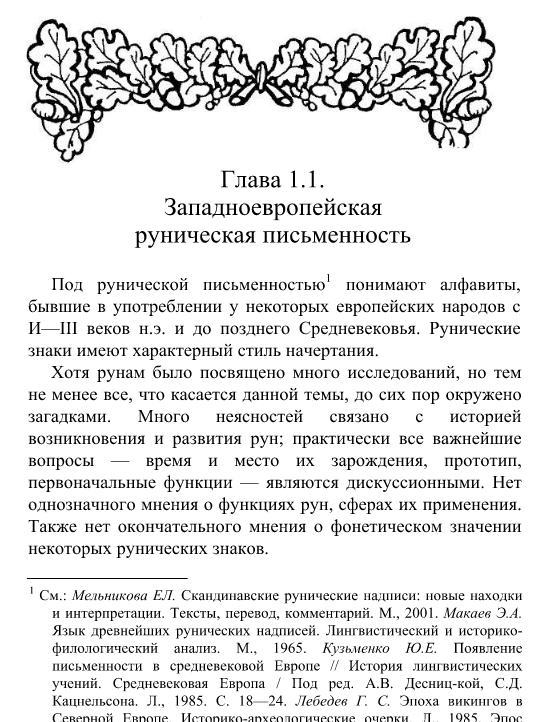
which kinda explains why the same runes are read differently, but then still my guess is that they were read differently indeed, in different languages the writing system was used for yet with some minor variations (minor variations if we distinguish skandinavian runes from the others)
and it goes on into the etymology of the term, which is what I spoke about yesterday:

Rome reigns. Rome still reigns. The succession is continuous only transformed as the Roman Catholic Church. Russia has fell off, but we have our own church, and churches are protected by the state in the way that they're not taxed. As if they wouldn't tax themselves, would them. Technically, Jesus ordered not to pay taxes, but their satanic church interprets it to their benefit and somehow make the government stay away. So how can I be sure they're beyond the go-t? They literally are. Always. Even under commies they succumbed. So you can imagine what can be in the roman vaults. Probably nothing interested. They have burnt the library and if they preserved something, some later zealot would burn everything.
I'd rather spare russian for english.
spare c(with) par(ts) (в запчасти)
с ware
ware, wear,
ware посуда от слова варение? блюдо? wr~bl? coincidence? maybe.
ware~war for that ar is of parez, argh, beware, hard, sharp, Coud an ostracon cut? You bet! if ware are pots, you should be careful (also the are) with them, cautious, worrying (that very ar, where w is the un prefix, and thus ware is the opposite of R of рана)
стар ~ crap
crap as something old (old food (which would rot otherwise as well, old worn ware, a useless old guy) is also not far from cripple (сраненький? с раной? с ранением!)
precious from lord of the rings was translated into russian as prelestt, which gave it rather different subtext (prelest is what russians call precious things sometimes, so the translation is good, especially since they have to choose words which remind the original ones fonetically.
the official etymology of precious is of price, which reflects the direct russian translation ценный (от слова цена)
Были ли деньги в мире толкиена? Не коммунист ли он?
Царство Рохан выпустило монеты из меди с изображением жеребенка. Эта необычная продолговатая монета так и называется – Жеребенок. Тираж монеты всего 1000 штук.
Вообще-то упоминались некоторые номиналы различных стран: Тарни (Канат) и Кастар (Мириан) в Гондоре; Дукат, фартинг и пенни в Шире и, возможно, Рохане; а также другие монеты, вроде тех, которые были вставлены в голову Азога после смерти или же золото, которое так любил бургомистр.
Золотые монеты в Шире назывались Дукатами, если верить шестому тому "Истории Средиземья".
яблочко облочко еблишко (оближь-ка?) ~ ball: я-ball-око (буквально глазное яблоко)
apple ~ a ball
делая делав делал могли быть вариативностью (индивидуальным или диалектным склонением) до того, как язык не стандартизировался. я в л ~ a b c
Playing with magnetic letters,
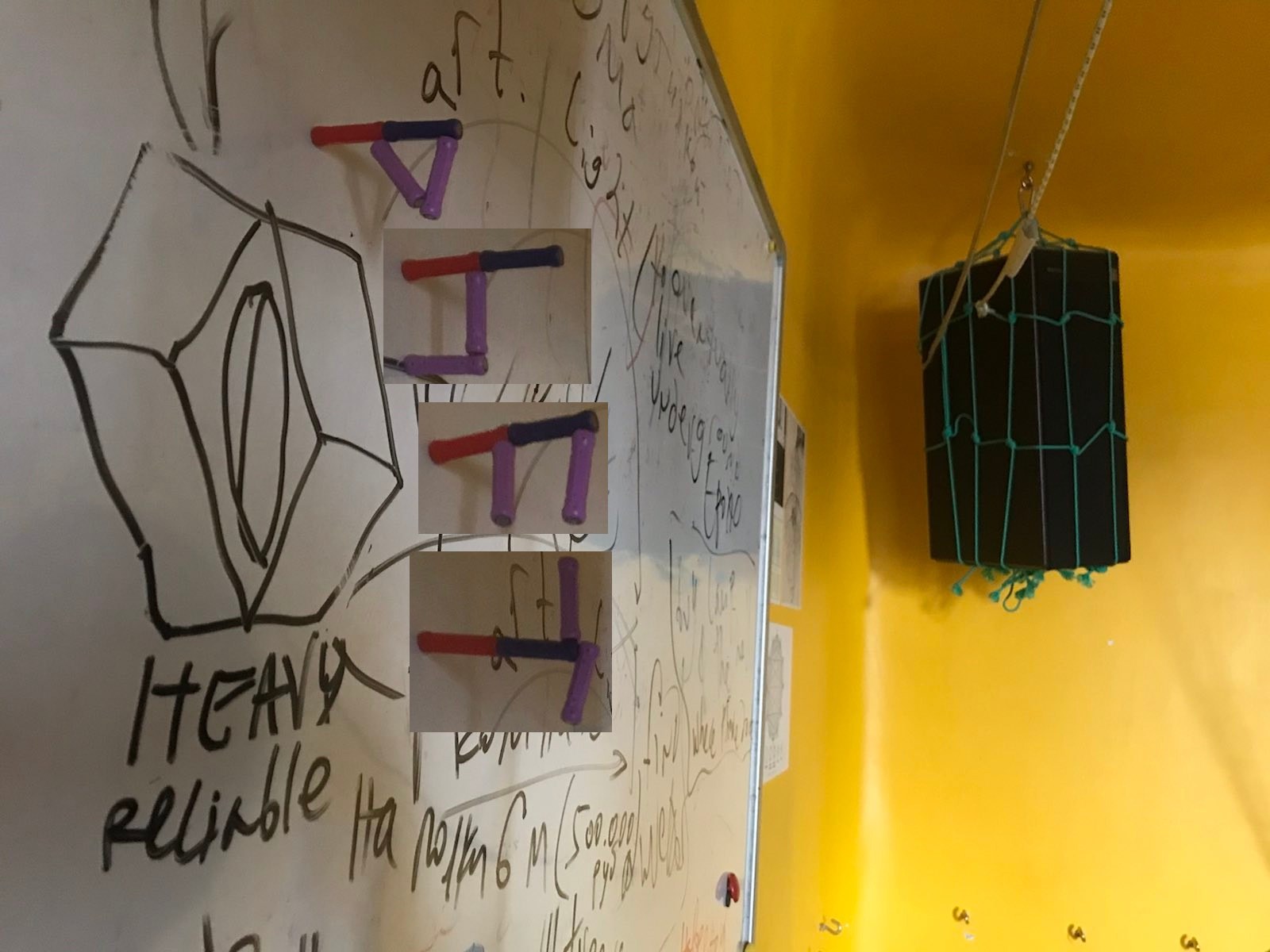
I thought of branches, that branch looking like ᛆᚠᚴᛚᛘᛉᚿᚮᛦᛣᛏᚢᚡᚣᚥᚨᚩᚪᚫᚭᚲᚳᚶᛎᛐᛓᛦ could tell where the tree was taken (it's smartet ro pull it holding the top (then it slide along the fir (fir~fur!)
and that correlates with the shapes of ↓↑ but for some reason runes don't use → ← unless ᚲ is such wedge, and I wonder if ᚲ relates to 𒌋
𒌋 being read as u make me want to turn the cunieform text
Akkadian:
1
Orthographic borrowing from Sumerian 𒌋 (giguru, “edge, rim”).
Sumerograms 10, 36000, 600, BUR₃, GIGURU, U, UMUN
Phonetic values u, šu₄
Sumerogram of gigurû (“Winkelhaken”)
2
Orthographic borrowing from Sumerian 𒌋 (u, “ten”).
Sumerogram of ešeret (“ten”)
3
Orthographic borrowing from Sumerian 𒌋 (umun, “lord”).
Elamite:
𒌋 (u)
I (place it into pronoun.html, for this is direct you/я or rather we/вы case)
Hittite, Luwian:
𒌋 • (u)
Cuneiform sign for v
Sumerian:
1
𒌋 • (bur₃ /burud/)
breach, hole
depression, low-lying area, depth
to perforate
to be deep
2
𒌋 • (bur₃ /bur/)
unit of area and volume "bur"
3
From 𒄀 (gi, “reed”) + 𒄥 (gur, “to turn”) + 𒀀 (a, nominalizing suffix), literally “reed stylus turned around”, indicating the antecedent of the sign 𒌋, a circular hole made with the butt end of the stylus.
𒌋 • (giguru)
edge, rim
4
𒌋 • (šu₄ /šug/)
Alternative form of 𒁻 (sug₂ /sug/, “plural of 𒁺 (gub, “to stand”)”)
5
𒌋 • (u)
abuse
finger
gift
totality
hole, earth
6
𒌋 • (u /u/)
ten, 10
7
𒌋 • (umun)
Alternative form of 𒅇𒈬𒌦 (u₃-mu-un /umun/, “lord”)
Looking for that 𒌋
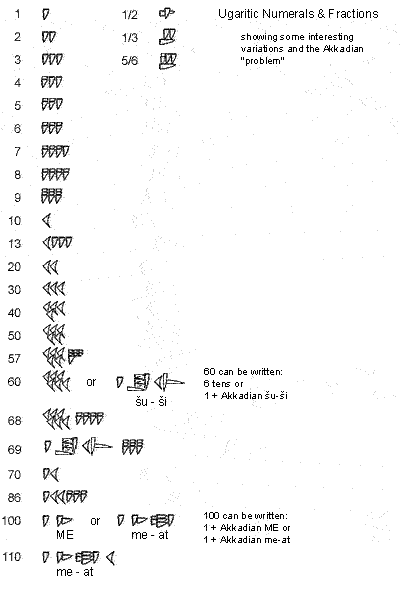
I found another angle to that majestic artefact:
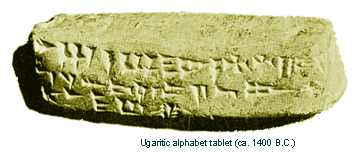
and as you can see, it doesn't have the continuation across around the edge
across and around make me think that x and o are the two basal opposites,
the O (hug) and X (no)
the B and T (buy yhrn but then I expect B to be boo, fu, no; and T to be duh, да, Yeah)
But 1400 BC? I would rather expect 1400 ago, but then cuneiform was excavated only recently, without any mention of it before (unless the greek myth telling of crane wedges spoke about them) so how can I even know that it's not a forgery or a misdated item? I shouldn't trust anything, but the way this tablet lays into the symmetries I found indicates that the artifact itself may be quite legit.
bad~dead may tell that plosiveness may be more semantic then labial/lingual (people may understand plosive-fricative dichotomy, but labial/lingual is completely lost not only from their memory, but also from their understanding. It takes them time to understand it, and probably some may never will.
What is the opposite of bad/dead? fat! fat~good
Jude = good? Jude = god!
what else is the opposite of bad/dead?
wet? healthy dogs have wet nose.
wet ~ want (about a woman)
hot ~ хочет
and two more from another angle:
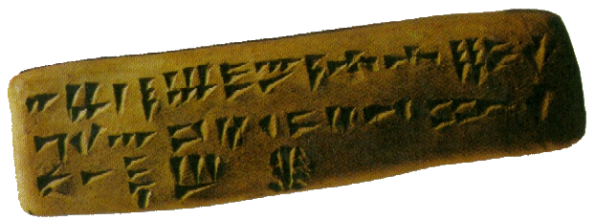
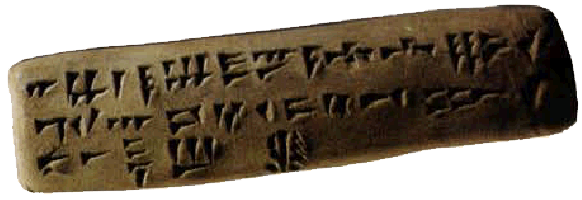
but comparing these pictures to that previous one, I wonder if that one is really from another angle or was it just modified by sfx of hue to make that nagle appear? For the final symobls are on the same distance from the edge. the wedge on the edge..
But then I see the top side of it, and I see that it is from other angle. Not exactly the angle I would have a look at. Is it time to visit Denmark? Not necessarily the time, but definitely a reason.
Did my feeling of language become so good that I began to recognize indoeuropean words in finnish or am I only tripping and this examples were collected by the author of the wiki page especially because they're easy to remember?
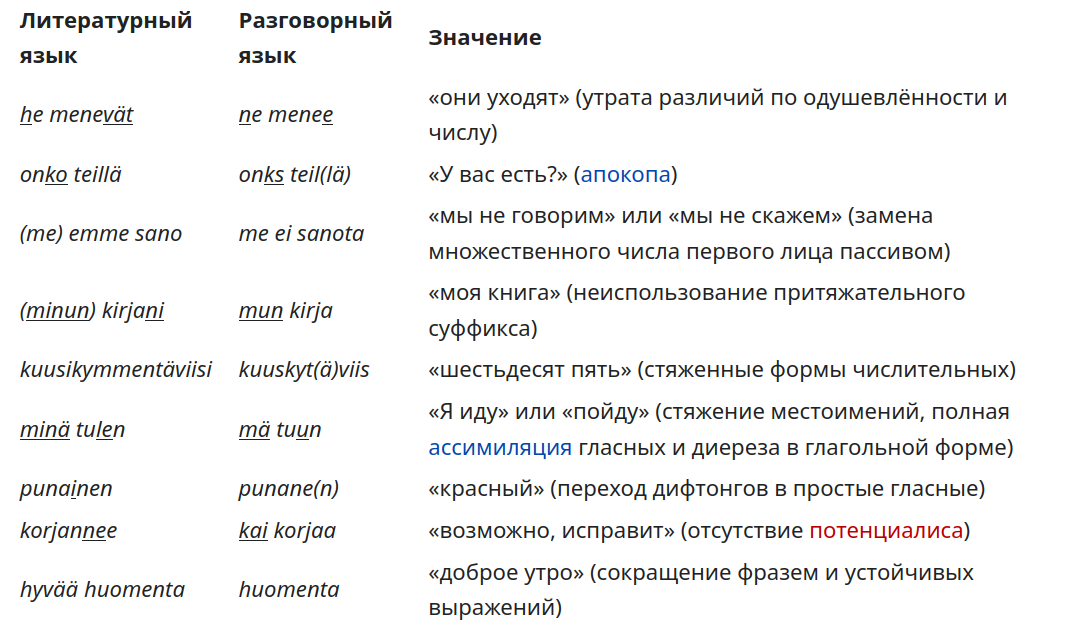
he =ne ~ they = onee (it's also interesting that Н is russian N, so h and n meet again)
menee~menevät is still extraterrastrial to me
The next example is more complicated, but it allows me to test myself: I guess the first word is cognate of english word own. And the second word is related to german word sie (сии, те, thee!)
sano~sanota ~ say, скажи от покажи именно этим с и отличается
emme ~ не (did I even identify the word right? we'll check it later.
mun~minun ~ my моё меня
kirja~kirjani ~ kniga (and that finnish word makes me suspect catholic hymn kyrie to be more silly than they pretend it to be)
числительные пока отложу в сторону
mä~minä ~ me
tuun~tulen is still a mystery (может gaan~гулён)
punainen~punane ~ пунцовый
korjanne ~ kai korjaa (is korya ~ care? cure? is kai ~ may?)
hyvää ~ goede (sometimes read as ху́е[húe])
huomenta being the only word in the colloquyial variant, may tell me that it incorporated that hyvää in its flesh, so it makes me easy to see morning/morgen in menta, but then I see french matin in it.
Now let's test that guess of mine.
onko teillä is indeed translated as "do you have.."
and onko is "is" and teillä is "у тебя" which makes me recognize "тебя" in this word.
sanota = say
kai = probably (so my guess "may" stays stands)
So far so good, but menta = mint, morning = huomen, aamu, aamupäivä
I smoked some good weed, I sand AEIOU trying to intonate accordingsly and I immediately felt that АУ [au] is whth whether short
A U ~ Эй(Hey) you(вы)! or A U (where) at aFR oùFR (literally to where, which is grammatically probably not how the french would say, but it is a good representation of how an unlearned russian scream (he wouldn't want to meet village people, or forest people even less, so it would make sense to scream in french to meet some noble hunters who wouldn't be affraid of him, so would scream back. Not to shoot the person, at least because of that.
A
I googled "a où" and I found something spectacular:
A'ou (阿欧方言) or Red Gelao (红仡佬语) is an endangered Gelao language spoken by fewer than 100 people in Guizhou, China.[2] Only the Hongfeng (红丰) and Bigong (比贡) dialects are still spoken, each with only a few dozen speakers.
阿欧 is that au, and it only means ao
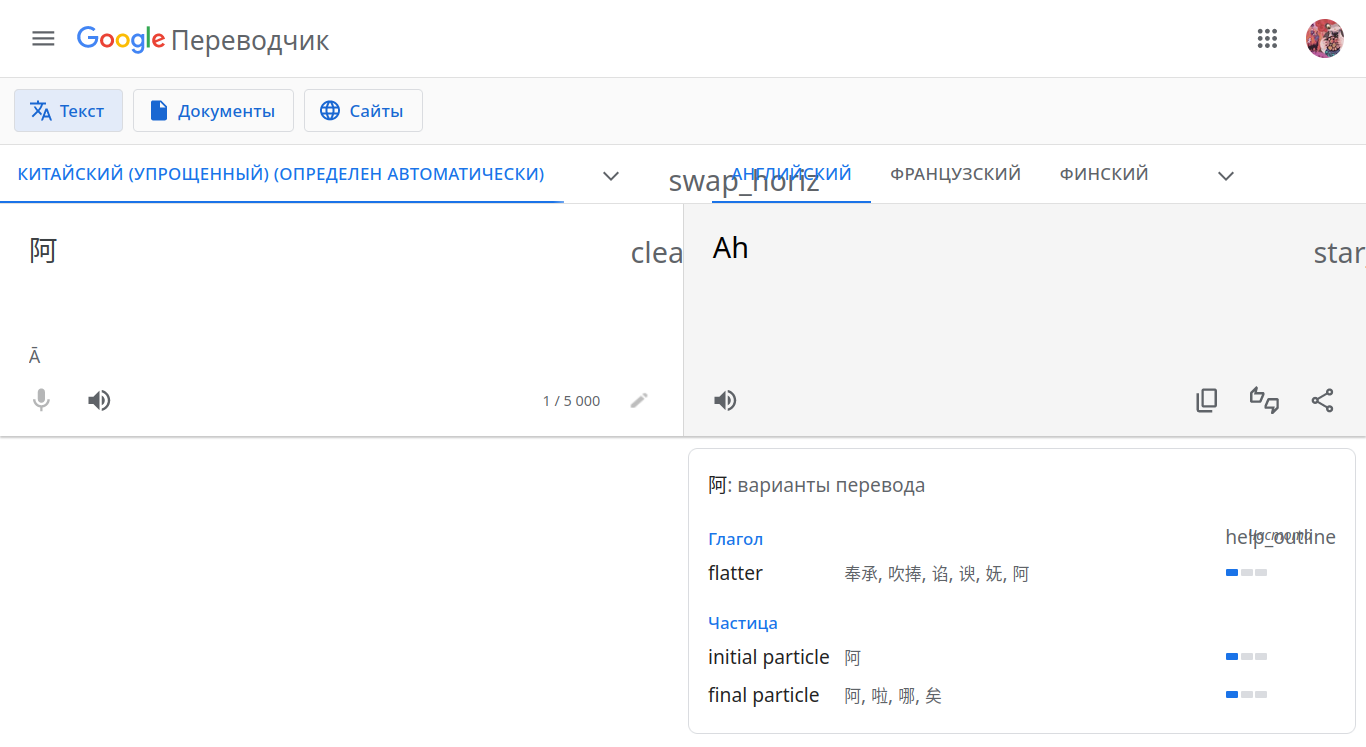
Initial particle. Whatever it means, like what is it! You can guess what I think. But then final particle it is.. what would it mean again. In the context of аз=я
and this I could not expect.
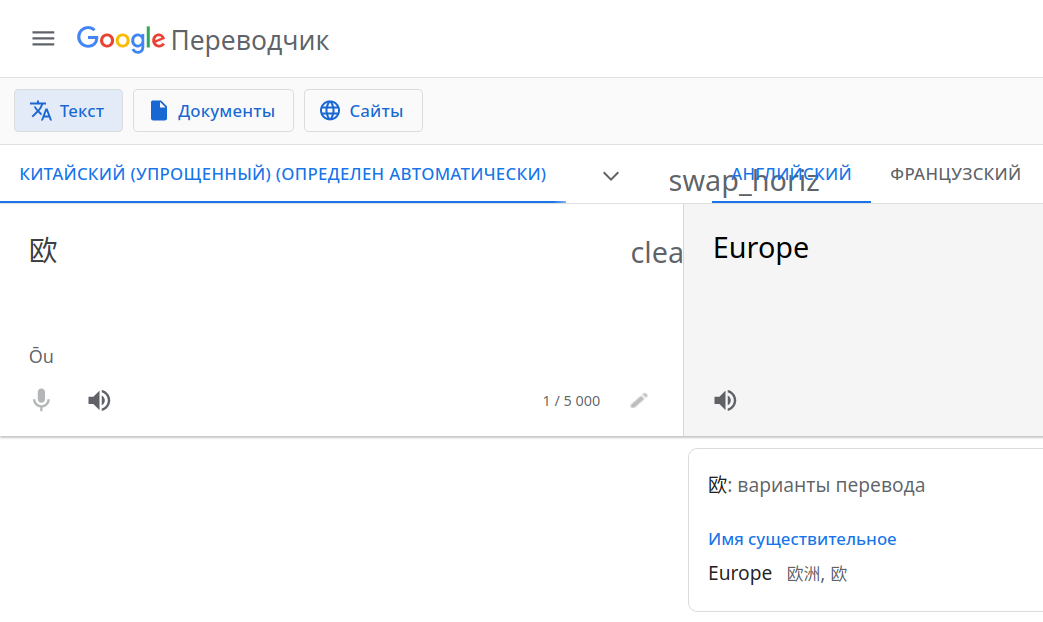
Does Is their name literally flatter europe.
Their short readings of hieroglyphs allow me to imagine them vividly. A is to flatter if it as looking at somebody with open m0
O as europe lines perfectly into my Vowels are Lands (немецкая земля, индийская земля как название характерных руд? Не знаю. Германий только знаю, Амереций, но это новая традиция, остальное в большей степени сочиняю чем вспоминаю.
we'll return to this subject later, I have a better one:
A'ou (the ' could be an indicator of the imp[ortance: Ge'ez N'ko (n'ko? am I serious? no. or what if. what if it's a distraction (destruction death-traction(проложение тракта?)) what if ge'ez is a key.)
I don't know about ge'ez, btu a'ou is definitely my favourite today, especially because look at this:
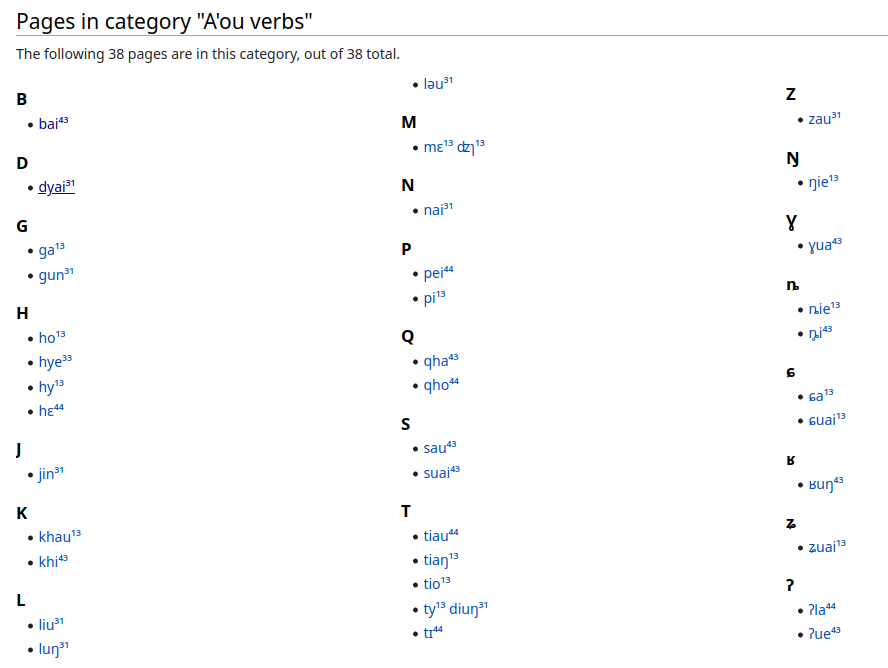
.png)
And I was intrigued by bai being be, by dyai being think, by die by gun, by ho which blows, and I looked at what that hongfeng was, and I began to think that it's some chinese-english surzhik:

And thus the name 阿欧 makes perfect sense.
hye for walk could be of hike
hy like fly could be of high
But then the other examples stopped making sense, so I lost interest to routinely copy paste the translations. Let's find some english-like from the other half:
we'll return to that chinese a'ou (notice, that the ' is where ei were, and ' does looke like י and (look~like (like~как ~ kook~kike~cuck(a jew (or was he a gipsy) offered me his wife(take my wife, is it that jewish or am I miserable antisemite?))))
light ~ laughed ~ loved
loved~lived
(we are brought into this word by love)
ч-илло is чикатилло и черепаха тортильо
это не тортилла, тортилло, они итальянцы, джузепе, роберто(,?)
помни ~ помоги (тело сигнализировалло из жопы сигнал о помощи в виде слабой боли (неприятное ощущение, которое хочется остановить) и я не обломался, надел одноразовую перчатку, смазал три пальца вазелином, и ввёл два по очереди (но по одному, геометрия должна быть окружностью) нажимая на сигнализирующую точку, в прямую кишку. Слава богу, что эта точка была не дальше точки джи.
помял ~ помог (помоссогировал подмассажировал помасо помясу помассажировал)
G and L are the same, Г and L
not G and N? Was that N/L dychotomy, they were aranged in neither way to have a compromiss. copro, miss (shit solution, го-о)
LMN, L is the first one. so IMLN I aM LuNa
Lunatics are people who worship the moon and they're considered crazy and treated as of such, thus making them shut the fuck up. Where do I go! I want to fight this battle? What for? To mutual benefits.
IMLN
ILMN (as it actually is today. in italian, ireland (t~r? then why are languages so different (as yiddish died off in russia (they study hebrew instead. Yiddish is mostly German (YiDish ~ die Deutsch (so they're good at it, at language acquirement (my guess is they have the best teachers, the best teaching practices, and having access to them they govern the world in such a manner, that the rest of the world don't have access to those technologies (but why should they study goyim? it would be noble, to raise the awareness, the intelligence of the world is making it better; to suppress the knowledge is making it worse, rigged as they see it, and they are at the low point, so I'm fucked big way, I want to go home, but I want to be brave first. I failed today by sending a letter to a jewess or am I blessed by that letter. I f my assessments are correct, they're literally francists and want to make this life worse, but that is my fear speaking. Let's practice what I preach, let's practice love. Love eachother, care of eachother))))))))
IL MN (he moon)
Lune or Mune? Either way, Moon had to be first consonant in I-row, L stands there today sometimes.
ILMN
IMLN
Lemon or Melon!!!!
are thiose lines some fruits?
EFGH ЕЖЗ ЕЁЖЗ ΕΖΗΘ ΕFΖΗΘ
EFGH I probably don't know the name of such fruit
OPQRST I should leave it to native entglish scholars, but russian also doesn't support this guess:
ОПРСТ (о прасад?)
АБВГД авокадо?
УФХЦЧШЩ UVWXYZ
a better alternative to peer review is reach review (as if that one is poor review, and reach one is rich)
Money ~ мне
Монеты ~ мне те (монете ~ мене те (меняете? меняйте! (монета ~ разменная)))
монеты меняют
fag noun (YOUNG BOY)
[ C ] UK old-fashioned
(at some large British private schools) a younger boy who has to do jobs for an older boy
probably this fag is cognate (or rather doublet) to page the паж
Unifgication of labials lingual sinto one, makes sentence gott is tott truism, or what Nietzsche did there was sentence of Г = Т (it's hard to write Г of two lines so that it doesn't look like T somewhere else.
(just take a pencil and try to pinch the same point, and you'll see that misses may be quite significant up to half a santimeter, which is width of the letter sometimes.
Г=Т
товно давно (староен, несъедобное, давно (но это эквилибристика))
говар? Тis more basal! indoeuropeans cannot agree where G stands (G or C? aha)
K = T^
клеет? кладёт! ta~ke? to~к
talk ~ to + к?
K=ᚴ=Г=Т
K&ᛏ have it bothways, an up and an down. But ᚴ does not.
𒌋 is recognized as O on a pencil I bought in a berlin museum, only what exactly nation did use that form of cuneiform?
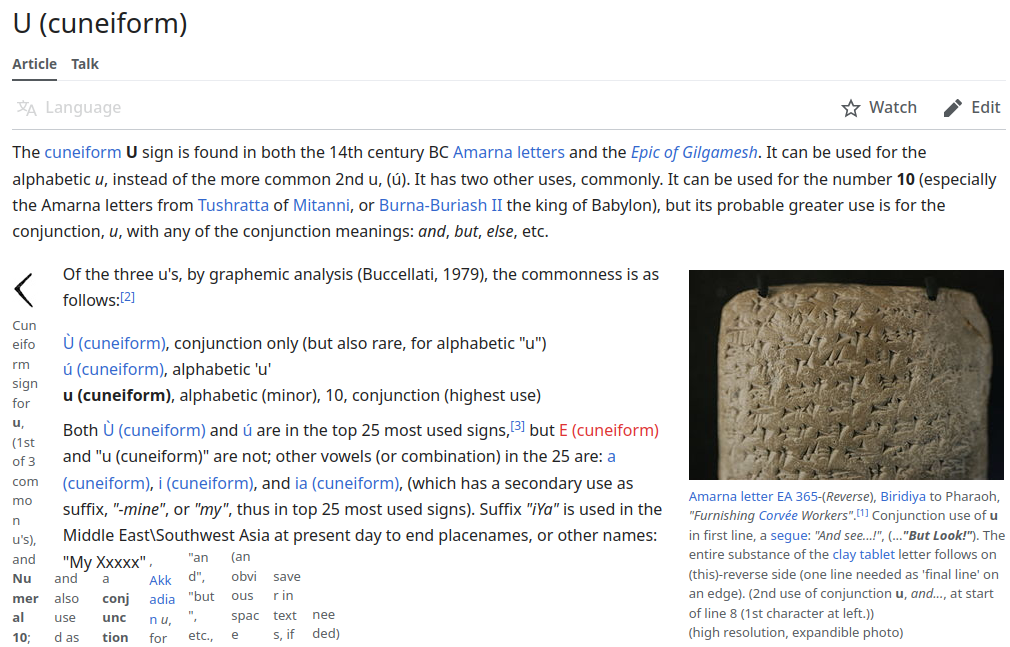
If 𒌋 is U or O, I'd only expect 𒑰 to be I, but no such luck:
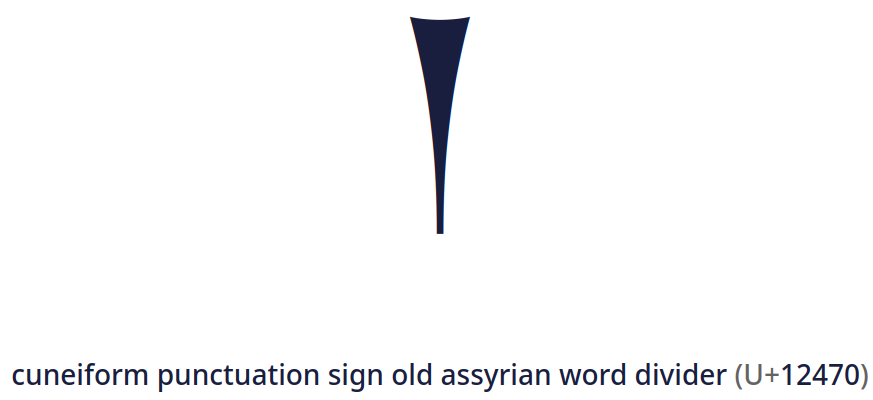
yet why doesn't it mention its use as one? So luck it is: it is another simbold, klooking exactly like that previou one.
The 𒁹 is the one
The 𒑰 is a word divider
𒁹𒑰 only placing them together like this I could be certain that the one is a little darker.
But either way, no 𒁹 as vowel either:
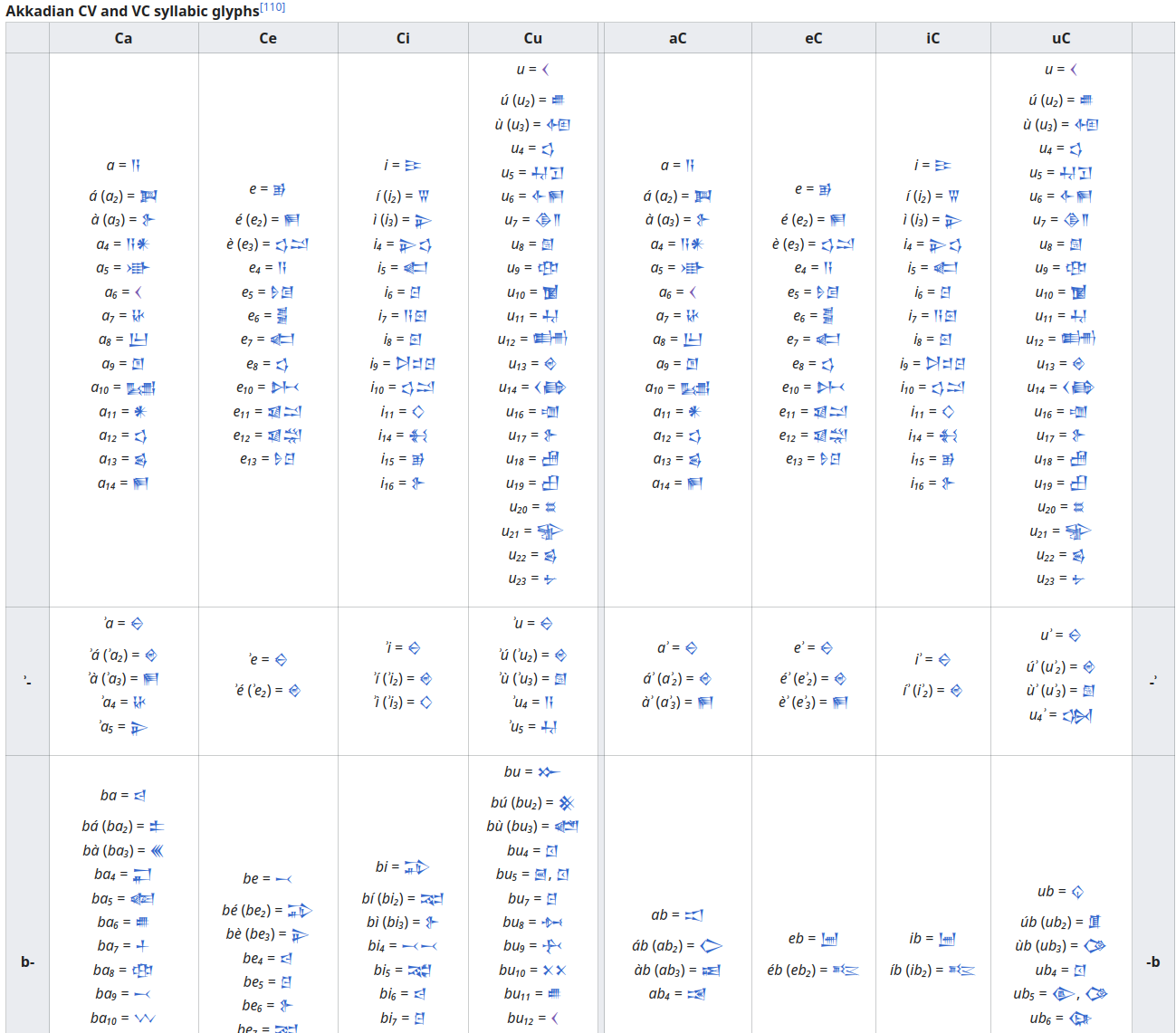 But then
it's only akkadian, we should dig deeper into this field as well,
or we may leave it to some akkadian speaking people, who know in
what language there are actual word which could have those both
graphic and phonetic features.
But then
it's only akkadian, we should dig deeper into this field as well,
or we may leave it to some akkadian speaking people, who know in
what language there are actual word which could have those both
graphic and phonetic features.exodus
ex hodus
из ход
исход

mitDE ~ withEN
I walked into this cuneiform domain, and few randoms from that field I brought here
(understanding how out of my depth I am and that I should avoid digging this field)

.jpg)
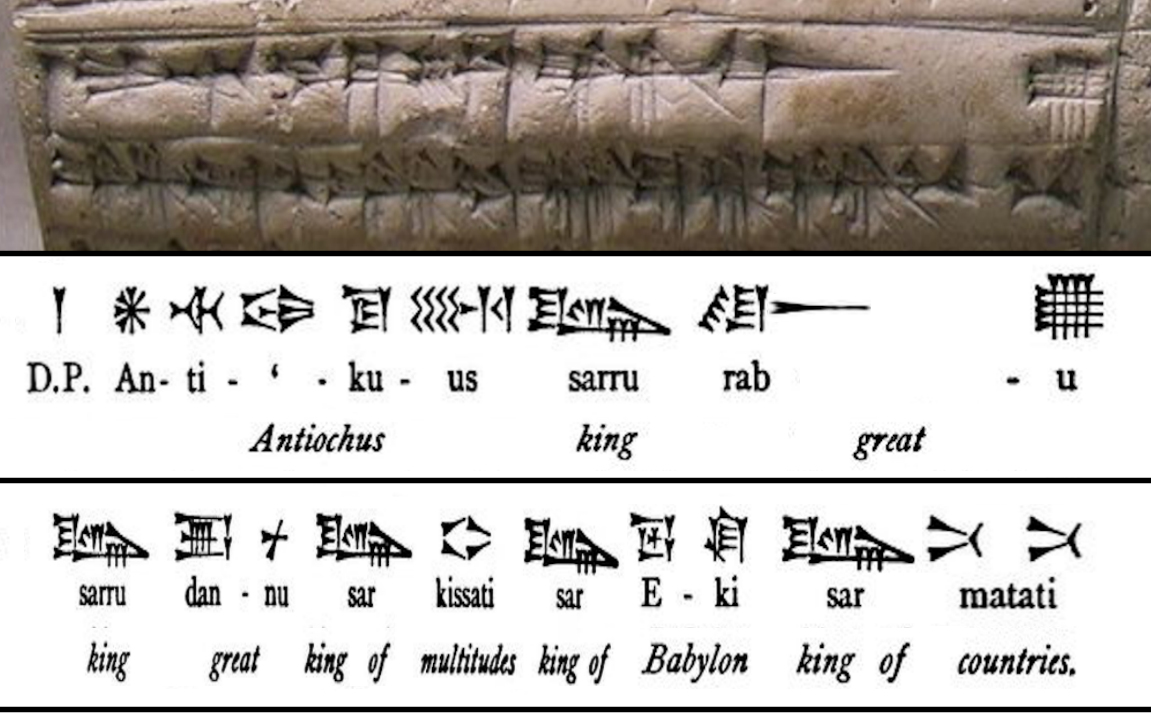

on the left is akkadian, on the right is old persian
(but then I find that akkadian has many more syllabic signs, making it a hieroglyphy (a partial table few images above is clickable to the whole set))
the following two are sumero-akkadian on the left and hitite on the right for comparison
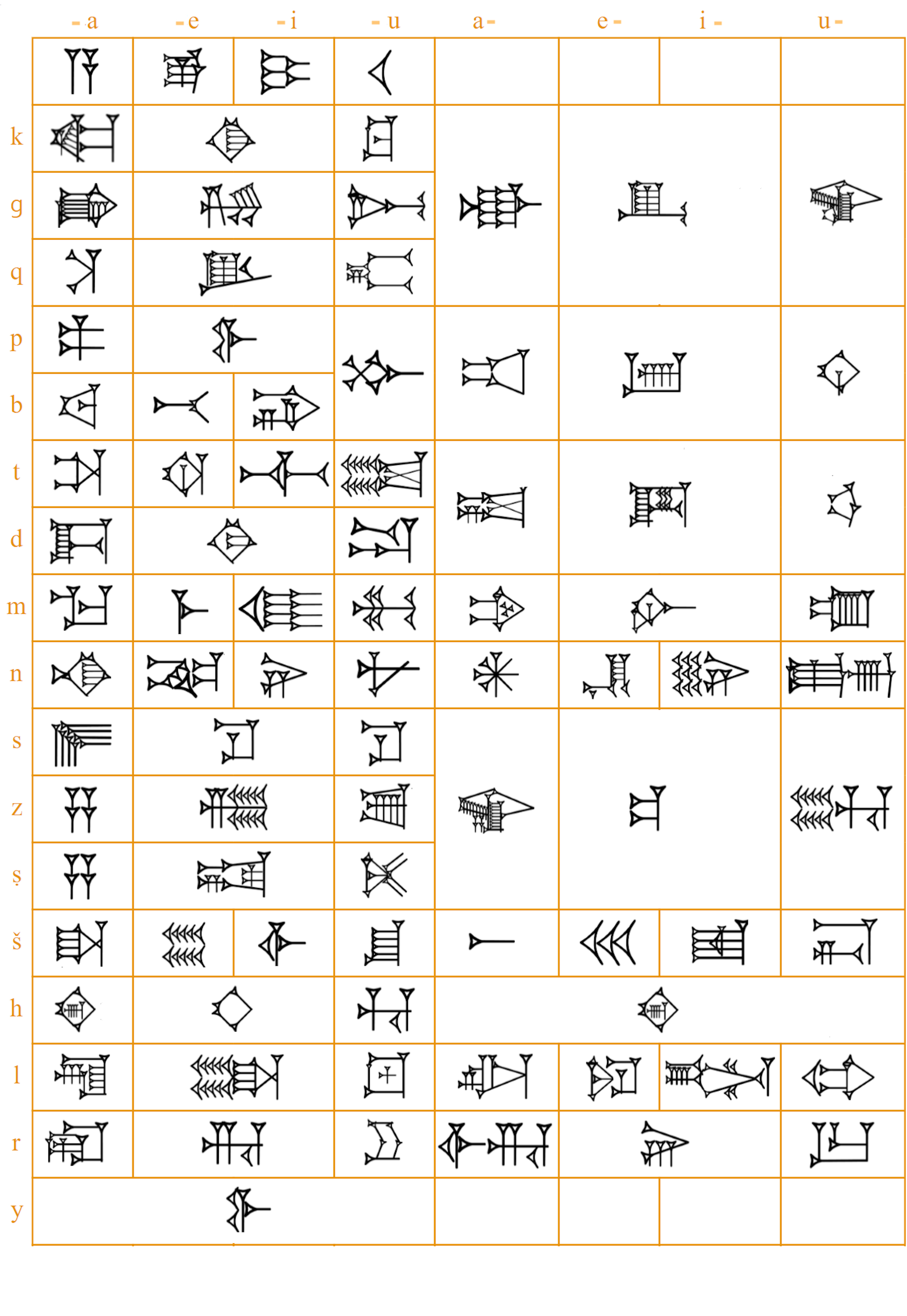
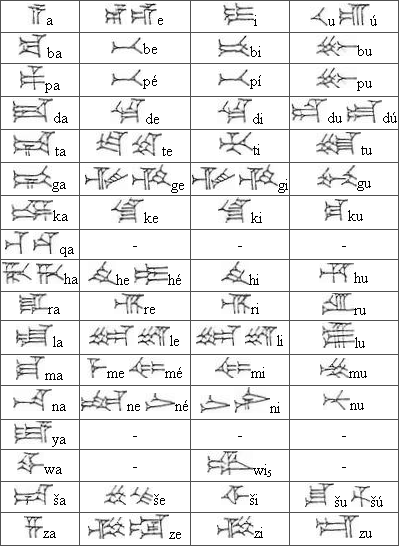
and some numerals in the closing:

I wonder why they didn't show 30 and 50, but looking at 5 and 7 we can imagine how they looked.
And that hundren, showing that unlike romans, persians had not 1000 but 100 as the period of their numeral system. Which may indicate that old-persian is older than roman, which it historically is. But then I look further into it and I'm not so sure about it.
And that line above that 𒁹 can be single:
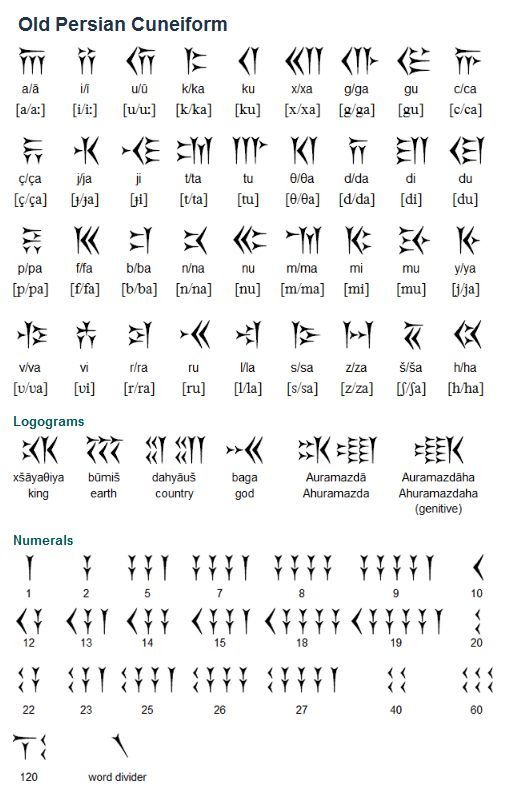
sumerian numerals were somewhat different at large amounts, but their period also was 100:
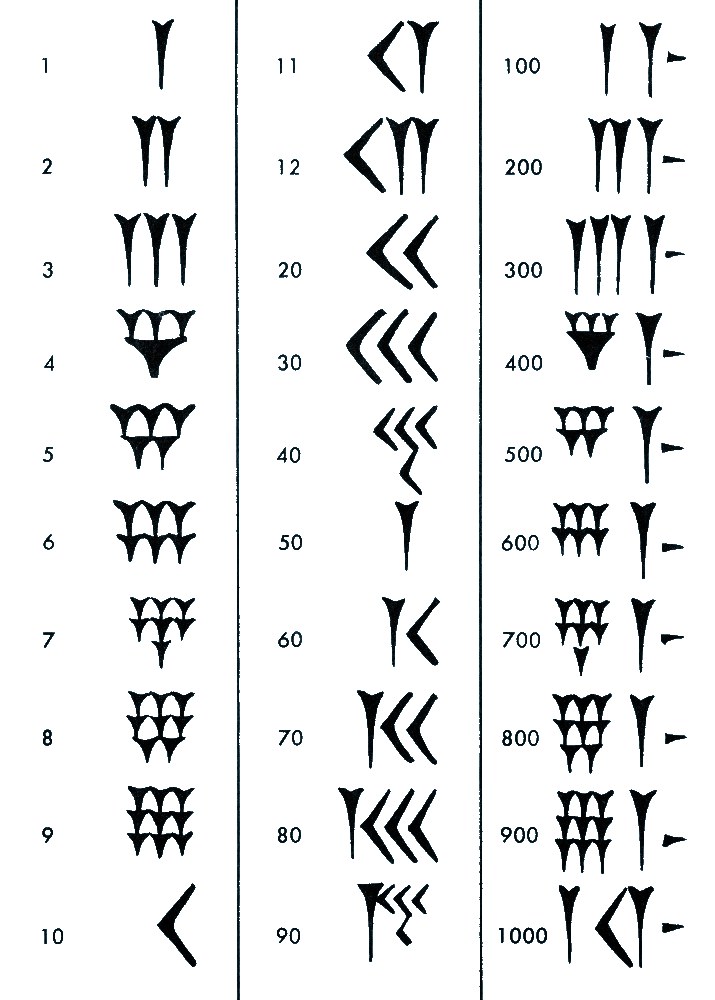
But I have my doubts, like if the system was sexagesimal, why 100?
And why did decimal become gesimal? but then again why sex is hex, it relates to that idea of mind th mine that h used to sound like ʃ, but why! (hexadecimal is of 16)
a friend of mine read И Е О У А as Иешуа, interesting now I see that this hidden letter is in the centre of the word. And I only came here to say that Ш ~ σ[s] ~ ס[ds]
and I see d in ס indeed, so this is why I keep the typoes: once in a while it happens to be true
(but then I don't know yet how to distinguish the true one. The true one keep on groing growing going
so back to that thing. It is interesting, that ◯-like shapes stand for both o/م ,ه and ס/σ
rebelled
rebellion
revolution
revolved
re-evolved
(перерос_)
t in tion is d of ed
And after ed can come a n-suffix, that suffix is ing.
is -tion = doing? eding! ed as ef!! of as for? foo?
DEMONtage (do 'em off stage?)
DEMONstrate (do 'em on straight?)
them on tage(page but with 𓏏?)
Here (r was written without my fingers, so it seemed, it just appeared when I pushed e and I thought of hitting it bu saw it was there already. I can see some text, I guess, but my eyesight worsens, so I lay away this work. Especially since it is closer to the stabdard suze ub vik,25 wgucg us which is exactly )
B is P (you need that lower part to get to that ☽︎ part after you draw the vertical part (we naturally do it from top to bottom)
I've seen cuneiform written in lines, and I thought about me saying in the booklet that
Doctors doctor. Doctors doctor docs
потчевать (подчувствовать (и дать что тот хочет, чувствует, нюхает?)) подчуять
that v/u thing should be examined in all languages. I suspect it to be a well and spring and clondike of the cognates.
какашка / букашка
ка как камень? / bu as being, bee? bug!
stone is standing (sand is not stand? t is tverdo!)
sand can be sent? sand~
doctor doctors, врачь от слова врать
(рассказав знакомому врачу про наблюдение doctors doctor получил от него текст цитирую)
Врач - это, конечно же, не тот, кто врет!
Однако, если рассматривать эту связь с сугубо этимологической точки зрения, то слово "врач" действительно оказывается производным от глагола "врать" в его самом старом, исконном, изначальном смысле.
Врать - значило всего лишь "говорить"!
Вспомните хотя бы "Капитанскую дочку" Пушкина, слова матушки-капитанши: "Полно врать пустяки", т.е. хватит говорить ерунду.
говорить, заговаривать! загонять, забалтывать, говорить ~ завирать, затирать, заворачивать, заТОРАчива-ть
(кто знает где границы когнат (нужно подобным словам в книжках примечание или нет? в гугле посмотрят?)
Интересно, что старославянское наименование врача - балий, которое родственно старому-старому глаголу баять (говорить, рассказывать).
Это интересно, спасибо ещё раз. Боль не родственно ли с этим балием? что болит сигнализирует, т.е. говорит, например мышца говорит "помни" (блин, помни́ и по́мни! вот это да! помни скорей всего раньше не только память подразумевло слово, но вообще мозговую активность: mean = иметь в виду)
wolf
волк
fox
волк
лис
dogs ~ fox?
dogs ~ da
fox ~ fu
dog ~ друг
fox ~ not us, not ours
на всякий случай повторю, что это всё черновик, в нём я черкаюсь, наброски, перебор
I shortened the cuple to coup by accidently having that o written in there.
And to my surprise it sounds as ku, as everything sounded in kindzadza.
Was kindzadza's language based upon some edgy outskirt theory?
(obscure ~ outskirt) but these are too difficult words, from modern verbose times, let's see some basic sentences in that one word dictionary.
ku kú (to whom?)
ku ku (to him, to them, to there)
And to my surprise I can see, that that ́ could be seen as the tip of ?
a rope whistles like both s and f, so that θ could stand for the rope, look at Ѳ and how it looks like a coil of rope (бухта верёвки (бухта как вода, верёвка тоже волну давать способна))
веРЁВка ROPe (p~f, but why r? r~s? s~ʃ?)
rope ~ hope
genetic therapies are few thousands usd, I remember them being several hundreds usd several years ago.
I failed to write "few tens of thousands" and "several hundreds of thousands" either because as I told you I suck at math, or because they are too long names of numerals, so I completely missed out on them because I almost never constructed such constructions.
It would be a nice place to stop, but mostly numerologically. I think I must keep on going. And though if I stopped smoking weed. This project will stop then, and the other project cgh has chance to develop.
I hope it doesn't me writeing so much
went ~ want
ходить ~ хотеть
want ~ waiting
хотеть ~ ждать
желать ~ ждать
w ~ ш ~ ж ?
ARYaBhaTa (the name of sanskrit syllabary, or rather it is some slightly different term)
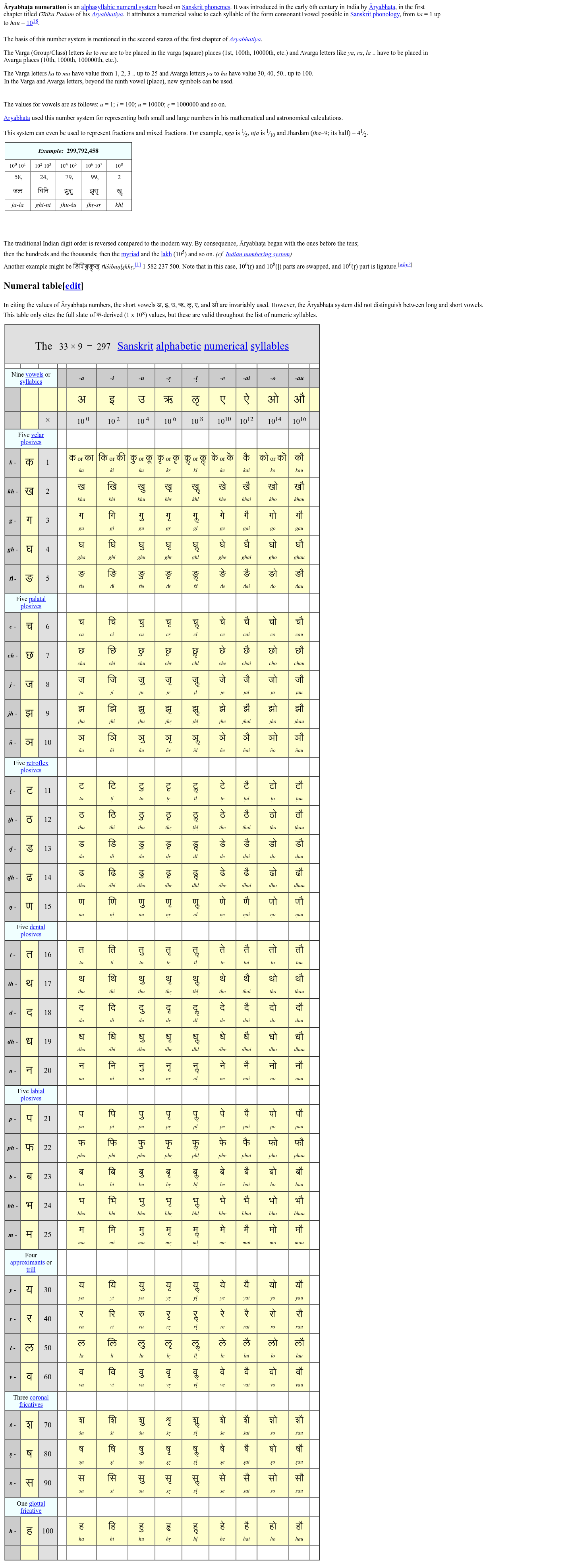
What is interesting, it is supposedly named after its inventor, but that name as if combines western and eastern canons of AB~D (AB~T) and Arapacana, and the actual sanskrit order with that r and y amongst vowels.
Or was he named after his work Aryabhatiya, which was named after that sequence?
and another system from the region, carrying a similar name, btw:
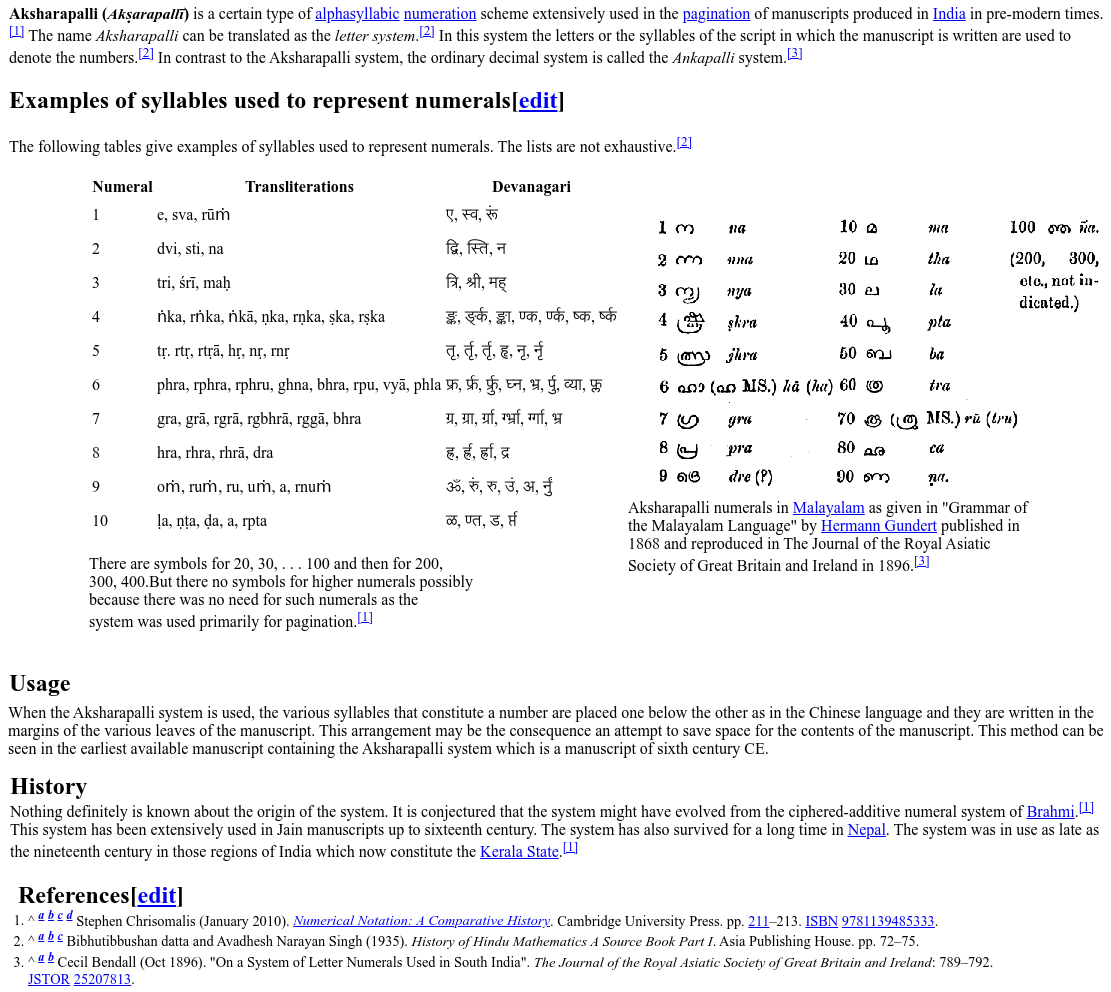
and another curiosity wiki recommended me to look at:
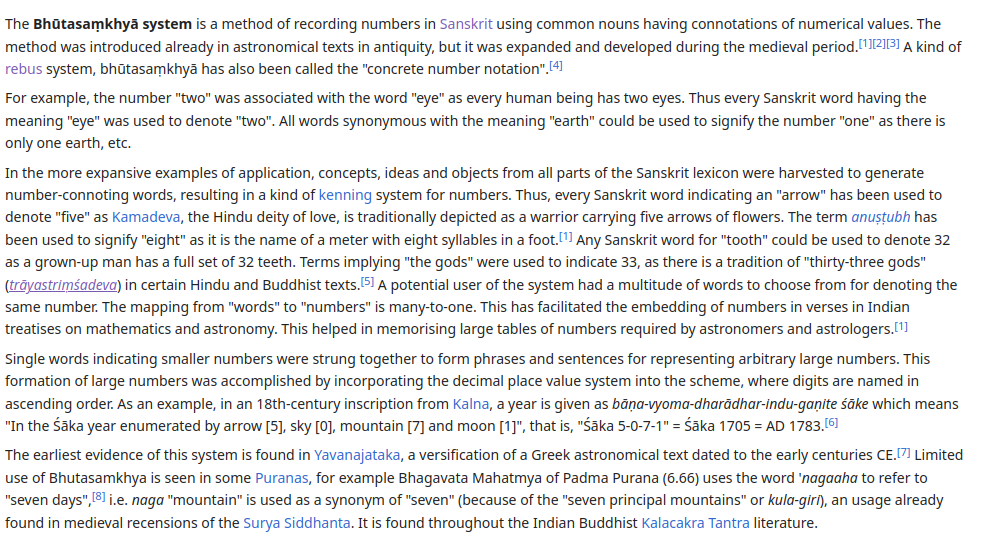
it may explain something, for example, 33
and Padma Purana (which came to me less than an hour after I heard word purana from Hajduk in an interview with him)
Kaṭapayādi system is another similar numerical notation, and this time it definitely named after the sequence:
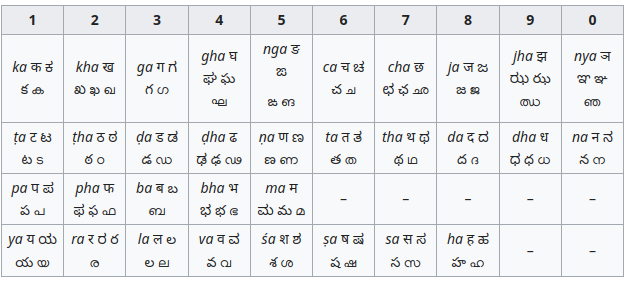
it is an incredibly interesting field of research, but I will have to return to it later, so far so good.
re co gnize
рас по знай
is co[ko] not only со[so] but also по[po]?
collective (lego ~ собирать) не только собрание, но и побра.. побратимы?
(but this guess was made before I got high, so it is a nothingburger I suppose, I leave this comment here, to see its validity a decade later I guess, when the perspective changes and I can see what is what a little better. But then that inhale/exhale gue.. hypothesis went nowhere, I thoroughly forgot about it a decade later, so ..so we never know with sto vidsotkiv veroyatnostu, or what is the ukrainian term for it, okay, it's time to get high, see you in the next chapter)


Those cuneiforms were collected in this volume to figure out what writing system was this pencil.
And since it isn't ugaritic, it is some deLanda tier shit museums seem to be allowed to perform.
Freedom, liberty, loose leash so to say, anything goes, even the shit artists do.
The closest font type from above is hittite, and I immediately can see it by vowels, vowels don't change much, such vowels are also in
and I will repeat this piece of table, because I will speak of it now:

Notice, that they also have a simbol, which can be read as both a and u, just as u in english is.
So let's combine those U and 𒀀, but then I notice that 𒀀 can also be e, which makes it a, being able to be read as a and э alike, and sometimes in the same position but in different dialects.
And that u is some 'u whatever it means. maybe some weird dialectal dyphthong. Why on earth do I ever write about it? This is how I study this stuff. My guess is it is collection of all the cuneiforms except ugaritic. Which raises questions about autheticity of ugaritiic. Does it? If somebody invented similar signs totally out of blue, without any connection with the other similarly looking systems? Was it the inventor or was it a forgerist? But then I think what if the inventor did it as a cyphre?
Ugaritic alighns with my tables perfectly, so my guess is it is authentic and whoever invented it and put it in the abecedaric cequence, he knew of these tables and thus it's more likely that it is actual ancient inventor, from the times these tables were widely known to scolars, and thus it is authentic, in the light of my theory, yes, thank you very much.
But I still have to make venn diagrams not only to runes, but also to cuneiforms
But I will only be able to do it when I'm not high. Thank you very much.
And check this out, a four-set venn diagram can be built if you use ellipses instead of circles:
and it isn't even the limit:
and then there are also different variants like this, probably telling that the festival may go indefinitely, only with reduction in readability:
Anthony William Fairbank Edwards constructed a series of Venn diagrams for higher numbers of sets by segmenting the surface of a sphere, which became known as Edwards–Venn diagrams. For example, three sets can be easily represented by taking three hemispheres of the sphere at right angles (x = 0, y = 0 and z = 0). A fourth set can be added to the representation, by taking a curve similar to the seam on a tennis ball, which winds up and down around the equator, and so on. The resulting sets can then be projected back to a plane, to give cogwheel diagrams with increasing numbers of teeth—as shown here. These diagrams were devised while designing a stained-glass window in memory of Venn.
I write in my book, that lines (broken at one end of the text to be continued on the other) are modern invention in comparison to bustrophedon. But then I see how cuneiform texts go in lines, and I go hm.. this part should be removed or worked on.
But then I think I read that cuneiform lines were a bit tilted so that it would go in spiral, when a clay cillinder rolls across it to make a copy of the text. And then it would be used as a seal or rather as a printing press. And this image sorta supports this claim, if we take the upper edge as the level.
But some lines closer to the centre are not tilted, so they would go in circle, as if they were the complete sentence separated from the other text. But to tell this I need to read the text, so it is even good that I cannot read it, because so I build up my hypotheses, which may be tested by those who do, and probably most of them will come out false, but other just as off the wall guesses will be right to the point nobody could see. Inevitably, statistically, even broken clock does, so, let's do our best to be a little smarter than dead clock, to be correct at least in half of what I say, but hopefully in the most of it, at least in the end. To know absolutely one needs the absolutely infinite time. Because processes take time, and infinite process takes infinite time (yes, I believe that universe is infinite, because I use that word for the geometric complexity completeness of the infinite, independint of the local borders.
Even if we suspect some grave irregularities of the insentivity of the processes (who knows maybe somewhere even atoms didn't formed yet, the state as ours inevitably developed in infinite regions of the cosmos, it's like inevitable,we all had the same infinite time, so if those irregularities exist, naturally there are regions times more developed than ours (and in this I speak not of the level of civilization, but of the level of some common frequency, allowing them some different elements, the elementary particles if they're particles at all.
Mount Everest is an interesting case: it's native name is Джомалунгма 珠穆朗玛峰 (the last sign is just mountain) It is told to be translated as great mother, and though that 玛 is Ma indeed, it doesn't seem to be used in the modern chinese by itself, phonosemantic element they call it, and it seems to be obsolete outside of being merely a morpheme in korean and vietnamese too (click the following image to see my sources) but in japanese it stands to name two stones, giving their immensely prominent positions, considering the motherful name for them:
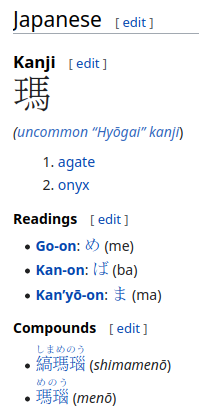
so the official etymology of the name is that it was named after some fellow, but my bold guess is that it was named so because it is the most prominent mountain ever. Like everest.
necro
мертво
не ртво? не живо?
И хотя рт~ж не принесло много примеров, R читаемое как Ж (на китайский манер) таки да:
кора кожа
вера вижн
пирог пиЖОГ (pie как первый слог слова пирог?)
минутка юмора: европа настоящая жопа? (учитывая какая жесть там творилась все средние века (да и раньше наверное не намного лучше было это всё))
an interesting venn's diagram, evern though technically it is not venn's diagream, it's a modified venn diagram, a venn diagram making more complex divisions within its groups.
We can become young as those immortal medusas.
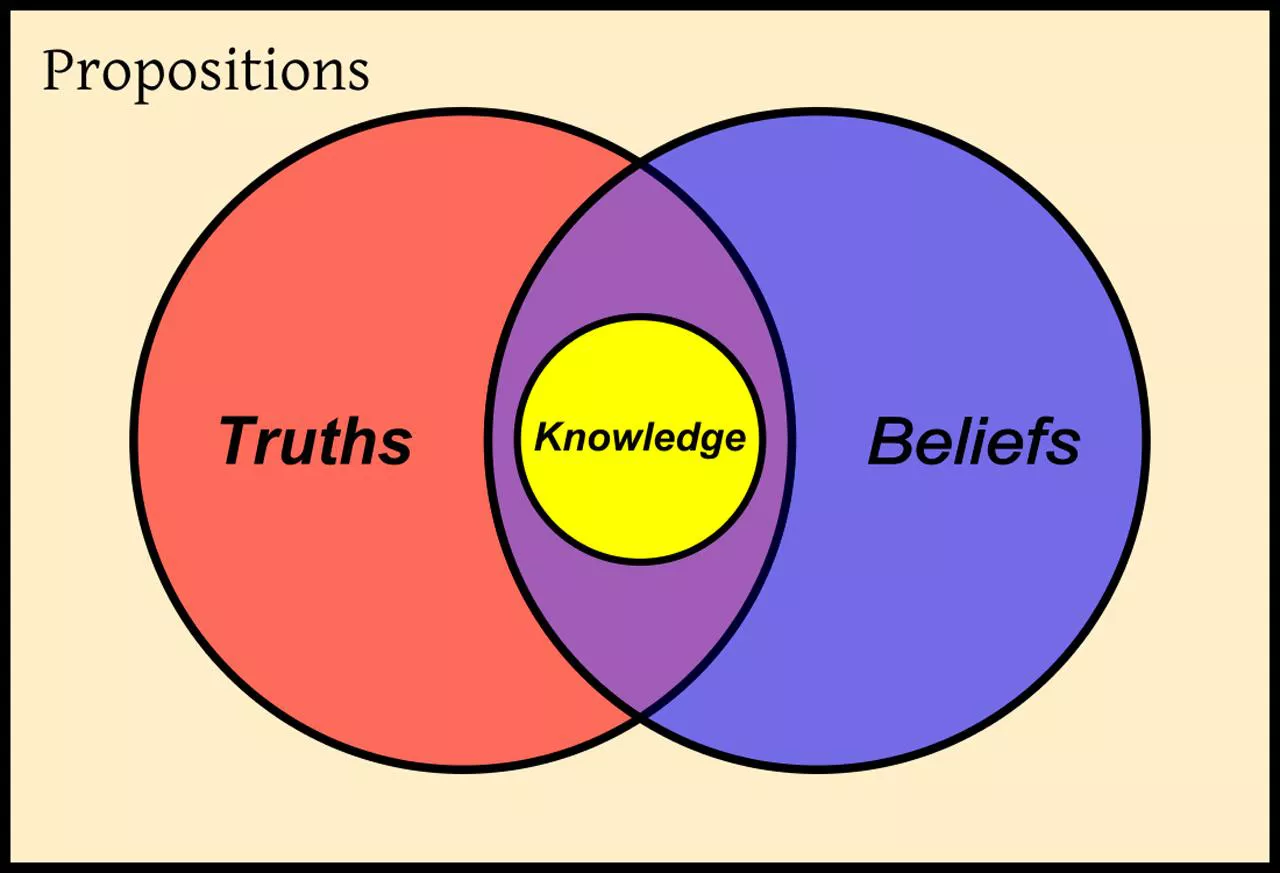
the purple area is propositions. The annoying pink is a background. The word is not only the name of the area, but also a name of the diagram. And I think it's a little rough. And then it cannot b e placed geometrically identical (the truth and beliefs have different structures, so they connect all over the place, so the better diagram would be truth as one plane and belief is the other plane, and the diagram would be in 3d with connections between the two. But then brains are 3d already. So Some other dimension should be in play. A parallel dimension. But the map I can see only as the maps on the walls are, distorted 3d shape into the 2d. And thus such could be doni for these parallel spaces, placed one over the other. But then I imagine it as 3d models one inside of the other, and reality linked to the regions in the brain
My name (they call such names pseudoname, but it is the one I found for myself in these 45 years (should I tell my exact age, or should I always remember that I'm 15? Either way, these orphography came before or around when I was 45, 46 now, and this is crazy, because those are also Trump and Biden, who were at that border (I was 45 at july 28 and 46 stole elections in January 20, so I was 44.5 and what. the 44 is me. The guy who is righter than Trump (for some reason, I felt standing at the left side of trump, because I placed them at the chronological scale with their backs to me, so at Trump's right was Biden standing. But then I can see that succession should be going on. My guess is every american wants it to be great. Наши своим слоганом даже логотипом боятся (развала) а американцы хотят (успеха) т.е. со стороны выглядит, что американцы побеждают. И русские даже хотят, чтоб американцы победили. Все ли? Все, но не все говорят.
Mahead Woodeemaan (and I got aa instead of an only few years ago, maybe one, maybe after the biden fraud (or was it a treak (look weak when you're strong) so they provoked pootin to start the war? to eliminate all the criminal and agressive element. Poo tin is literally параша (as russia is pronounced) P instead of R on the olympiad is all about pootin, not russia to everybody but russians and greek, so to everybody in that account, in general, even to all russians, but subliminally: though they're taught not to know english, they are taught the alphabet (and latin alphabet it is, only rare birds taught themselves greek (others only sometimes know alpha and betta, gamma delta - maybe, epsilon alright, but then only gifted few would care to know)))) starts with simple a, the first letter, then goes a dyphthong, and of e, the second vowel, then goes oo of u, the vav, going directly after e in hebrew and arabic (in greek between e and i goes Η, and it also makes sense, because woodeemann is human (I wrote mann instead of maan out of habit. Or was it a linking it into the circle?)) then goes ee of i, then goes aa turning into o in dannish, so did I unintentionally brought into this world a formula of my creation? was that formula a e v i a for most of the time until this moment? with double n as the end, or was it m? mahead woodeemam Beginning and ending with m! and that mann is mam, as mathur is human in icelandic.
Female priestess invented the language, the culture, the everything, until times became peaceful enough that old men were allowed to become philosophers, and before that pacifists were probably considered cowards and killed by their own kind
R has one mor ribbon on the P which when I imagined one more ray, I saw it to be a sun, and it made perfect sense: Rah, Яръ, Жар! ЯРКО ЖАРКО J
сковородка в виде чаши с ручкой?
Ж is probably of жом and even жопа, but жом (squeesing, squeezerg.t.) could be resembling fire, or the other way around: the sparcles of fire could influence the shape of Ж, or the fire itself was that Ш (אש (аш is literally how H is named in latin. could other letters have hebrew names? em, en? maybe even a)
Ж ~ 火 (huo [ho:] which could give life to words like hot, and combine with that J via ᚼ(or ᛡ) being H and J)
水 looks even more like Ж, and it's read as Шуй (Ш~Ж (ж double ш? Ш~K? (Ш[ʃ]~C[s], K~C))
pen handle
p~h, n~ndle (шпон шпиндель)
and I see ручка
как pen and hand
руRU = peEN
ручку верни = руську верни
ка = and = end?
governments are evil, because they rule by fear. Who rules by love instead? Artists do. People give money to artists by their own will. Thus enterpreneurs are artists. The less corrupt the more artistic.
People give their power to art for free, for the sake of it (they may draw for sale, but never will it be as good as when they paint it for themselves (even if they have to sell it later, they should get money from people wanting to see it, as museums do. They may get donations after people are impressed by their work, and thus want to stimulate those artists to produce more of such.
So artist would impress people to build pyramids: we have problem with sand. What if we catch all the sand and place it and press it into blocks as I can demonstrate or small amount, by solidifying that special kind of sand by pressure (as I demonstrated a french professor demonstrating it in a video) or (before I recalled how they added nothing but pressure I thought of it being done with) adding some chemicals could help. And I can only guess which it was, but they probably had many:
Серная кислота известна с древности, она встречается в природе в свободном виде, например, в виде озёр вблизи вулканов. Возможно, первое упоминание о кислых газах, получаемых при прокаливании квасцов или железного купороса «зеленого камня», встречается в сочинениях, приписываемых арабскому алхимику Джабир ибн Хайяну.
В IX веке персидский алхимик Ар-Рази, прокаливая смесь железного и медного купороса (FeSO4•7H2O и CuSO4•5H2O), также получил раствор серной кислоты. Этот способ усовершенствовал европейский алхимик Альберт Магнус, живший в XIII веке.
Magnus, huh! But magi is an ancient tribe of wizards, so that could even be a pseudonym, and it is:
and it was not what I thought it was, but then magus ~ magnus, a big man.
Альбе́рт Вели́кий или Св. Альберт, Альберт Кёльнский, Альберт фон Больштедт (лат. Albertus Magnus, около 1200 — 15 ноября 1280) — средневековый немецкий философ, теолог, учёный. Видный представитель средневековой схоластики, доминиканец, признан Католической церковью одним из 37 Учителей Церкви, наставник Фомы Аквинского. При жизни был известен как Doctor universalis, а также Doctor expertus, а в последние годы жизни к его имени было прибавлено прозвание Magnus (Великий). Некоторые признают его величайшим немецким философом и богословом Средних веков.
Albertus Magnus[a] OP (c. 1200 – 15 November 1280), also known as Saint Albert the Great or Albert of Cologne, was a German Dominican friar, philosopher, scientist, and bishop. Later canonized as a Catholic saint, he was known during his lifetime as Doctor universalis and Doctor expertus and, late in his life, the sobriquet Magnus was appended to his name.[6] Scholars such as James A. Weisheipl and Joachim R. Söder have referred to him as the greatest German philosopher and theologian of the Middle Ages.[7] The Catholic Church distinguishes him as one of the 37 Doctors of the Church.
I was studied in автоматно-механический факультет a'nd I even didn't remember what шпиндель is other than it's some вал (I saw it in disassembled I guess)
火 has five ends and remind pentagon pentagram
水 has six ends and reminds hexagram
which may tell that their shapes tell their positions in some hierarchy, 5th and 6th. So who are the others?
人 sould make a perfect 3
so would make 山 (especially because 山 and 三 sound the same in japanese chinese, yet in chinese chinese 山 is not san, but shan (I suspect japanese to perserve the forms of chinese more close to the origin)
who's the 4?
if 3 is solid, 5 is fire, 6 is water, 4 should be air? and as a part of one translation of air, 中 is a perfect candidate, because it has perfect meaning per se:
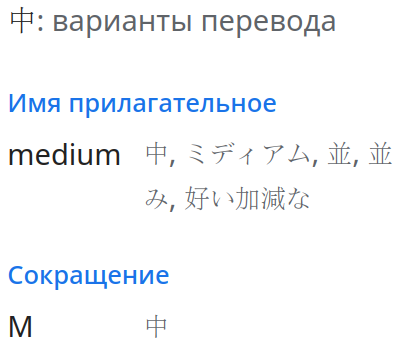
山中火水 could be perfect 3456, if yang and yin were 1 and 2
but 山中火水 doesn't bring me any revelation, all the finds are irrelevant, so it could be nothing, but who knows, at least now I will remember thatn 中 is not only amongst or middle, but also medium.
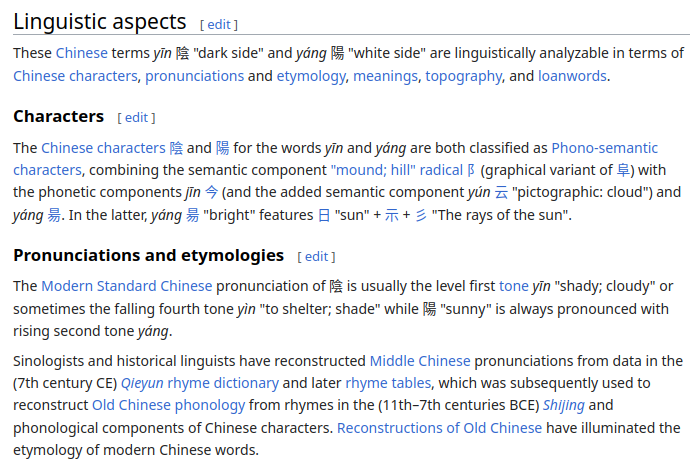
I E O U A (Jehowa)
I E ʃ U A (Jesus)
I E M U A (yea, mwa! (yes & kiss) or is it yo ma (your mother))

this image made me see how much 4 looks like upsided down cross, and it could be a coincidence, but it is connected anyway: 4 symbolizes death, upside down cross symbolizes devil. Death and Devil are pretty much the same in the yin yang dualities of God and Devil, Life and Death.
(few following paragraphs don't make much sense, but let them be, whatever man)
КRU
REN
(the same key, btw)
is one same letter make us see cognates in different words? r c к R can be (lost a
(thinking of Kru and Ren)
right red
left light? bLue?
queen and queer
are these two words of recent origin from the name of bands Queen and Cure?
(just as russian битлз for a fan of rock music)
featrue
malediction
benediction
Notice, that male and bene have similar syllables, and could tell that b is better form of m (more)
better is better than more
ne is better than le? нет лучше чем это.
неэто ис э бэтта заклинэйшн чем это
When ew
wrote I when I wanted to say when wanted to say when
after I deleted typo Црут instead of making it grey, buyt that could be a coincidence, because,
это нетто
это нечто
это место
нето ~ вместо
вместо (замени) в место этого другое положи
out as нето jf of it
НЕ ТЫ = OUT
не ты ~ not it
ne tit? not these, not this. тити как ултимэйт ти.
обо объекте "с глупостью" (with flaw~folly was surprised by this pair, c ukegjcnm. 'nj z j ct,t? ,kby)
ns Ё
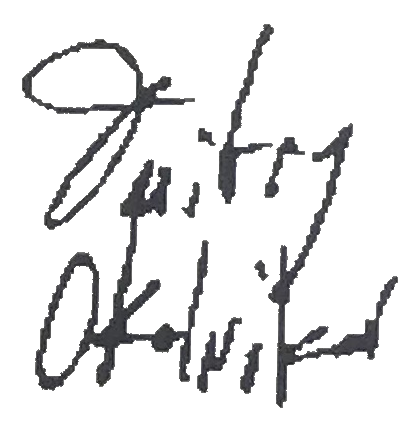
Here k is pretty much like kол, kопьё
y is like an arm with a shoulder, t holding k by the hand, while others raises tr the crown of м
I J K L M N
I V X L C D
I M K L J N ? I'm a clown
im kln? именно кулон?
male (bad in latin, man in english)
boy ~ бой (boy ~ bad? girl ~ good!)
Б & g
д as g does oppose б
(only then both used to be the same, I guess, одна форма обращается в другую (как 6 и 9 (и 9 по русски gевять))
д opposes б as 2 to 5 (and notice, that 2 in russian is два (for those who don't know russian, g and д are the same letter, д))
so d is the basal shape, but then it is þ, so the direction doesnt matter much: D is d. B is double and this is the difference from D, b is β (d~þ, b~β, so up and down also don't matter. Or do they matter (how can they not matter (if b=d in the past, than so. baba~dada, baby~daddy, лепет. и здесь я обязан показать этот лепет)
(mirror)
(mirror)
(mirror)
in the first video they explored эй (a better form of A, e as exclamation of happiness, I guess)
in the second video they explored да (and worked with it alone by repetition, the way dogs do)
in the third video becomes obvious, that that эй is of laughing nature.
My guess is they play grown-ups, not being able to speak it, but mocking those who can. Or do they осознанно учатся? I remember myself avoiding speaking before I could do it well. They remember me not wanting to
In the last video of video.html ted sings AEIOU at the karaoke sayng
WELL THERE'S
NOTHIN' I CAN DO
I ONLY WANNA
BE WITH YOU
can be with you
And my guess that formula is magical indeed, which A standing for cAn, E standing for bE, I standing for wIth (см и~с (иван и диман ~ иван с диманом (несклоняемые слова наверное лучше пример) и окончания множественного числа в русском (и) и в английском (s))
and not one but two letters for OU reflecting only four lines in hebrew, and vav actually working to transliterate the two, and what is the connection between ו and ע is not clear. They look like I and Y, but structurally (by the structure of the alphabet) they're completely different letters (maybe)
by the structure of the alphabet. But then I see that Y ~ U ~ O and if Y ~ J, in the alphabet they're JOU~YOU, IOU~@!
conservatives conversate (the leftists don't (beleft~believed (lieve~leave (there's no word lieve, only leave, but in belief yes lie there is))))
waardevol is valuable in dutch
waarde is value
value
worth
(v~w, l~r)
in the movie A.E.I.O.U-Das.schnelle.Alphabet.der.Liebe (released exactly a year ago) the way he tells if he looks Normal (as if mocking her) reminded me of a dutch old man asking me what I mean by normal and I said that it's neither good nor bad, but in the context is considered to stand for good, he was surprised in a way and never explained to me why, and now I even more than before think that it is common in normans and russians (or is it norman (or german) influence? g and n in the same column, here we can see it in norman~german pair) for I don't think in engish it is the thing, but I have to leave it to some international language conference, where i can brainstorm this question with both english and dutch and german and scandinavian speakers.
In that movie they spoke about vowels having places in the body (probably having in mind chakras, but I'm not sure. Then there were cards with letters P T K on them, which could be related to BCD or paleohispanic syllabaries. But it's only half of the movie, it's not an easy one, I watch it by pieces. I used to love such artsy kartiny, but now I would drop it if it didn't have the formula in the title. I expect some better revelations yet.
На французском языке внутренняя часть Запретного города Пекина называется "Вилла Тартара", татарский город.
https://fr.wikipedia.org/wiki/Ville_tartare
schade~жаль
t~s: esDE ~ itEN
and interesting way to write l, uniting l and Λ

also let's not forget that Λ used to be standing instead of V in numerals in etruria
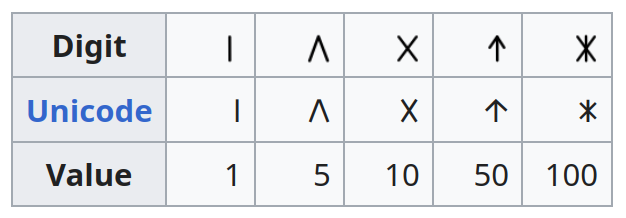
also notice, how that 50 looks like runic ᛏ, and that Λ is similar to runic ᚢ, standing exactly for V.
I look at that and I see 1 X Ж as the basis of the system with Λ and ᛏ being only halves of X and Ж
Just as V is half of X, but L is ..is it half of C? is T half of C? T~Г? С[s] and T[t]? and Г even shorter than that? k even shorter than T? or than Ж? because ..or than Z? isn't Ж~G~Z~G? Ж~Г? that's absurd in the light of the previous lines.
Г ~ Ж ([g] ~ [ʒ])
молодость ~ мелодия
мелодичность, мелодийность, молодится мелодится? мелом? мелодия ~ мел из-за фигур хладни, придающих звукам вид? И я прозреваю в фигурах хладни секрет письменных форм, даже спросил подкованного в технологиях друга "За сколько соберёшь установку для исследования фигур Хладни?", "А для исследования Faraday Waves?"
молодится ~ молотится? массируется? или рубится с парнями наровне? молотом работает для поддержания физической формы? мукой и тальком подкрашивает своё лицо? молодится именно в отрицательном смысле используется слово, про тех кто седину закрашивает, например.
молофья молодит? молофит
constipation is a new word for me, and I dig into etymology to remember it well, and I find latin constipare, but I dig deeper and find stipare stipate in italian and down to stipo told to be cognate of stiff and even staff.
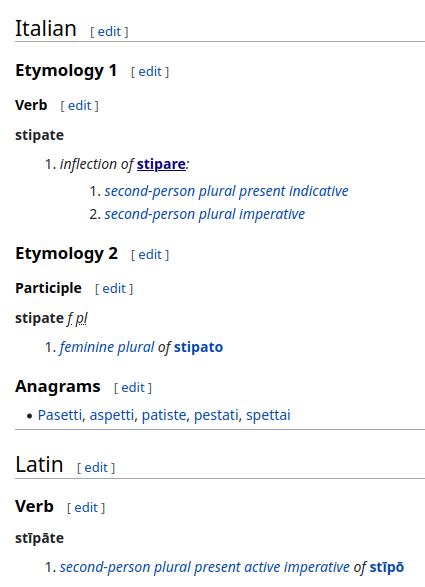
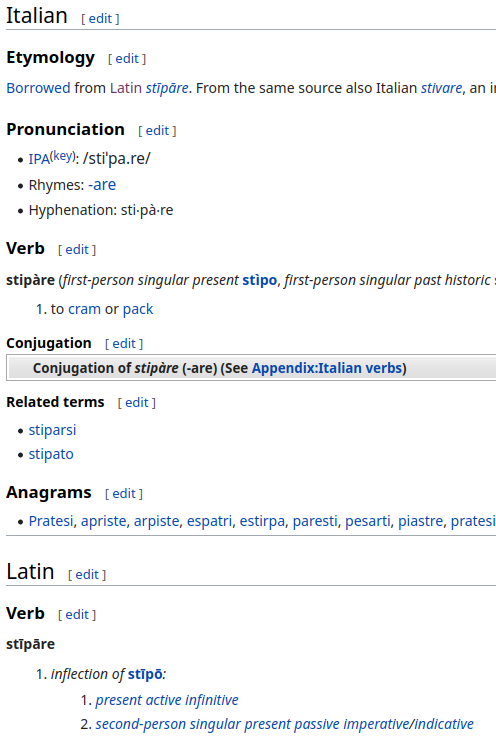
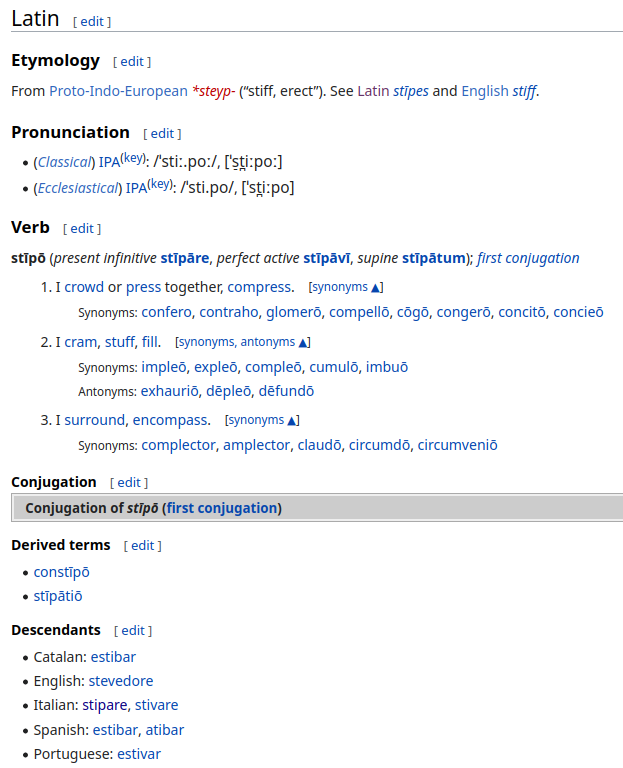
needless to say that I never knew stevedore, and does he stuffs the ships? d'or? ставит (а ор это когнатоморфема английского суффикса or)
stuff когната слова ставить?
greetings from cognates.html:
staff (штат (наёмные работники)) штат (возможно ф не было расслышано, возможно f~t, возможно на этом месте стояла θ, распознаваемая то как ф, то как т (нельзя сказать даже носители какого языка каким образом его распознавали: в именах англичане произносят Th, где русские произносят Ф (Том ~ Фома) но здесь в русском т, где в англиском ф (может русские сочли финальную версию θ похожей на т, а начальную θ похожей на ф, а англичане наоборот? больше материала требуется, чтоб сказать это наверняка)))
(это очень важный серый текст. Теперь θ обрасло предположением, что в русском её th-fronted в начальной позиции, а в английском – в конечной)
And because russians didn't know many ф-words, but had only names influenced by greek reading of θ, my guess here is т is the way russians read those words ..but then it is only guess and nothing more. This piece of information needs to lay alittle, to grow some more examples to it, so I can see more clearly it by more pixels of the examples.
смирнов being called the most popular russian surname (when I only know one smirnova and she's jewish) seems to be another piece into russkie~pusskie conspiracy.
Let's not forget that Ⱆ [u] is double Ⱁ [o], just as oo is double o
iT'S BEEN A YEAR since a world war began and I posted few times on 2ch which I avoided until then, and it could be caused by me reacting to ru.tracker available without vpn.
Some fuckers are playing the play book. in''t been a tradition to start a century with some shit: 18
m ~ 'em
т ~ те (the, they, them)
Sg. Pl.
Nom. the they
Acc. that them
That Accusativum is also Genetivum, Dativum, and all the other падежи cases.
Sg. Pl.
Nom. he they
Acc. him them
Gen. his this?these?those?
y m s declare y to be vowel
and it is because y is i: they as plural form of the tells that y is like russian -и in веди, ведай (in all their shapes reflected in grammar (letter(s))
Y M S
center, horisontal, vertical
(three shapes of waves) and oh wow couyldn't that be proton neutron electron.
Or rather Electron Proton Neutron
Electrons we use all the time, protons we probably learnt to use earlier than neutrons
(so is it some illuminated mafia, clique, firm, whatever you call it, a society, knowing everything and controlling everything. How is it possible? We're going to be alive.
Yes, if Masters are at work, we are going to Live
Survive probably was the word, we will not just live, but also prosper, enjoy.
Joy is written clockwise, unlike most of the letters:
only g
f may have it, but then it repreats the shape of ʃ with a dash, and thinking of ſ [s] I think of st ~ fl (stone or flower?)
if s~t, is l~f? ł[w~ᚹ]
is s~l
is t~f (well, in θ they meet indeed)
is s~l?
say ~ лай (лей, пой, пей, спой, )
вдруг осознал что лжепророчу иногда (пророк прорёк изрёк рек~решил? от рош голова?)
(если бы вы могли слышать внутренний диалог об этом, он был гораздо цветастей "по тому что не бо" (т.е. что человек, ошибаться могу значит, а тогда бог ~ god ~ год ~ ход (всё совершается превосходнейшим совершеннейшим (perfect переводится и так и так) образом) it goes))
Deee Lite definitely were naturally defined as art-house, if some shitty genre of cinema didn't take the term over. How unfair.
and now for some other very talented lady in tghis day of May 8

and she is here mostly because of that wild shape of K
B is also very wild, I wonder if it's just a creative approach or is it rooted in some actual basis
valknut is pretty much how triangle looks to those whose eyesight is old as mine, у меня троится в глазах, именно не двоится, а троится, как valknut
во всём мире чем белее тем более король
чем ~ тем
не говорит ли это конструкциё, что слово после чем так относится к слову после тем, как чем относится к тем?
both words are the same word (such as that, or literally the)
that = the it?
в математике они упускают знак умножить, а в языке они упускают знак сложить: не только и (lдве объекты поставленных друг против друга (одна рядом с другой) даже запятую упускают порой и ничего.
А посему математика возникла после письма, дабы работать с
Нить ариадны мелок? мелок, которым стрелки выхода рисуются? Но если там весь лабиринт в стрелках, направленных в самые разные строны? Хитро где-нибудь стрелку можно начертать. А если там стены крутятся, меняя стрекли на противоположные. Тогда звук мог показывать? Нет, убить жителя лабиринта была задача. Чем он мог их доебать? Царю могло напрягать что такой сын у жены. Или они его кормили так, воспитывая из самого страшного жителя города свирепого война.
Война is literally воина (belonging to warrior)
варями начли называть людей (лолей) потому что по телеку начали вещать за варвару красу длинную косу, и wendesday вкатила варе, но серьёзно, до этого я это имя слышал лишь в расширенной версии сказки про айболита, и в фильме место встречи изменить нельзяа (тоже про девушку расцветшую в годы войны рассказывалось. А потому я боюсс это они специально (предупреждая тех кто посвящён, что ща реально пиздорез начнётся. А я предупреждал. Надо строить бункера (но тут походу опыляют хемтрейлом чтоб не рыпались)
бункера́ более благородно звучит, чем бункеры
ctrlshift3 0301 what kind of word is that. standing for ́ the functional name of ́.
надо букву ы заменить на менее грудную. Ы ниже всех в груди, что коррелирует с её бытиём последней (йотированные позже? э! ы это ворма буквы и, а потому нах. а в латыни тоже множественное чесло означало, так что офицера вместо офицеры латинское против х.з. какого. Русского. Может быть. Латинское да, флёгр благородства отмечаю.
Без влаги клетки тупо сохнут. Попить я могу. А клетки кожи! Дельфины нас умнее, бро, а потому возьмём пример. Научимся не спать? И спать наполорвину.
Если засыпание основное проблемко не позволяющее дышать по д водой, то давай решим вопрос засыпания, дабы обрести дельфиний режим, научившись спать внутренними личностями по очереди. В три смены. То что нам надо 8 часов сна в 24 часовом астрономическом дне, говорит о триединости мипра.
мир как единство внутреннего и внешнего пространств. Русский язык хранит египетские верования. Музейон был мезеем он
И так компания of pscij-op's
и psy-ops of чудинов и задорнов (один размазывает нелепую теорию по артефакту, который как раз коннектит русский с рунским
Я рунский (лунский) у носовое о? роны?
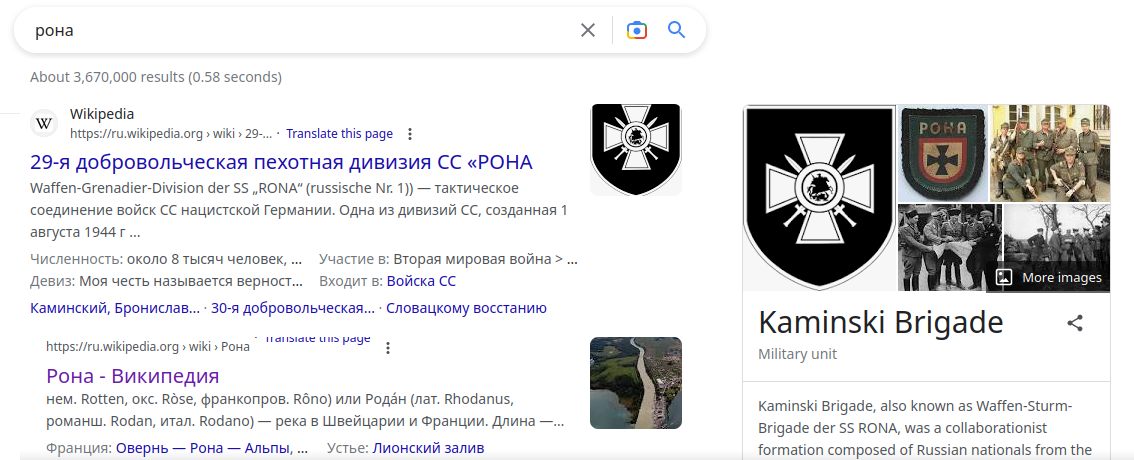
«РОНА», аббревиатура от «Русская освободительная народная армия» — вооружённое русское коллаборационистское формирование. «РОНА», 29-я добровольческая пехотная дивизия СС «РОНА» (1-я русская) — тактическое соединение войск СС нацистской Германии.
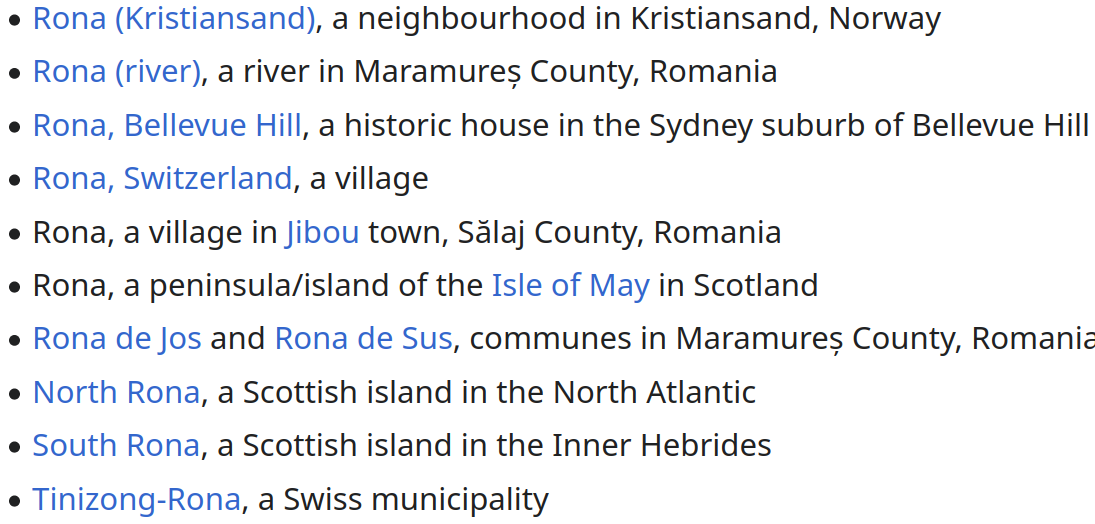
But seriously,
стРУНы
струна is some runa суть руна? существенная, существующая, сущностная, материальная.
ᚴ высокое ки?
ᚿ низкое ну?
ᚦ среднее да?
кидану
ᛘ(ᛉ) high me[mi]?
ᛦ(ᛣ) low you[ju]?
ᚼ(ᛡ) something in the middle? like ה (the)?
wide ~ white?
wide eyes ~ white's eyes
blue ~ белое? (потому что на голобое словао blue похоже больше, чем на синее)
язык ебёт мозга:
where in english delusion of grandeur, in russian is mania of it. As if russians don't feel like even wishing being great. My eyesight is dissolving, and I believe this is how I myself go dissolved.
словкарь
букварь
А Б Г Д
Е В Ж З
И М Н Л
О П К Т
I can easily see booky of two leaves, connected in the middle, thus making 8 pages for each pair of letters, and they would look even better, if the pages were rectangular and folded in the middle each (as the cover of my booklet) but then I see that four leaves would fold into these 16 pages on 8 leaves.
A
Б Г
Д Е
В Ж
З И
М Н
Л О
П К
Т
А просто восклицание
(показан мужчина, усы которого составляют дуги буквы А, а нижняя губа - перекладиной)
быть может добавлена панграмма, в которой а является союзом, и выделена чёрным на фоне серого текста, но таких панграм я не нашёл, придётся делать самому, единственная полная и подлинная это великолепное Любя, съешь щипцы, — вздохнёт мэр, — кайф жгуч.
а есть и такие неожиданные: Хрюкнул ёж «Тыща», а ведь село Фершампенуаз — это центр Нагайбакского района Челябинской области. многие буквы повторяются, нет ъ, но удивительней то, что это правда, а я живя в этой области такого и не знал.
Les horreurs de la guerre
Drame alphabétique en trois actes et trois tableaux de
Georges PEREC
Extrait de OULIPO, La littérature potentielle, Collection Folio/Essais n°95 et Editions Gallimard,1973.
Personnages
- Le capitaine Vainqueur
- L'Abesse (d'origine auvergnate)
- Joseph K.
- Le conducteur de la berline
- Le serveur du Mess (affligé d'un défaut de prononciation et par surcroît d'incorporation récente)
- Soldats, Nonnes, Otages et Chevaux
ACTE UN
La scène se passe dans la cour du couvent de H., en Transylvanie supérieure a la fin de la première Guerre Mondiale.
Le Capitaine Vainqueur a été chargé par l'Etat Major de la Première Division d'Infanterie Légère de recruter des filles pour un Bordel Militaire installé au Pecq à l'usage des permissionnaires et convalescents de la Région parisienne. Il demande à la Supérieure du couvent de lui donner ses nonnes, la menaçant, si elle refuse, de faire fusiller quinze otages
LE CAPITAINE VAINQUEUR
(dans un dernier appel à la bonne volonté de l'Abbesse)
- Abbesse ! Aidez !
L'ABBESSE (d'origine auvergnate)
(toujours pas décidée à se séparer de ses filles)
- Euh...
(elle sort)
Le Capitaine Vainqueur. furibard, donne l'ordre aux soldats de fusiller les otages .
LE CAPITAINE VAINQUEUR
- Eh ! Feu !
Les soldats tirent s’abattent les otages.
Cependant revient l'Abbesse qui parait avoir changé d'avis.
L'ABBESSE
- J'ai. .
Mais soudain elle aperçoit l'amas trucidé des otages et, parmi, elle reconnaît le corps de son amant. Joseph K !
L'ABBESSE (d'origine auvergnate)
- Ah ! Chi-git K !
Elle s'évanouit
FIN DU PREMIER ACTE
ACTE DEUX
La scène se passe dans la cour de la caserne.
Le Capitaine Vainqueur a fini par obtenir six nones.
Il les a mises dans une berline à destination du Pecq.
Il donne ses dernières instructions au Conducteur de la Berline.
LE CAPITAINE VAINQUEUR
- Et les mène au Pecq !
LE CONDUCTEUR DE LA BERLINE
(faisant claquer son fouet)
- Hue !
Mais une des Nonnes tente (maladroitement) de s'échapper.
LE CAPITAINE VAINQUEUR
(l'attrapant au pas sage, dans un grand éclat de rire sardonique)
- Eh ! Restez !
Il te la refout dans la berline puis fait signe au Conducteur qu'il peut derechef y aller
LE CONDUCTEUR DE LA BERLINE
(faisant claquer son fouet)
- Hue !
La berline s'en va au petit trot tandis que le rideau tombe.
FIN DU SECOND ACTE
ACTE TROIS
La scène se passe au mess des Officiers où le Capitaine, sa mission accomplie, vient se désaltérer.
LE SERVEUR DU MESS
affligé d'un défaut de prononciation
(croyant se faire bien voir en faisant une remarque anodine sur la clémence du climat )
- Vai doux.
LE CAPITAINE VAINQUEUR
(goguenard lui montrant que ça ne prend pas avec lui
et qu il a tout de suite reconnu le conscrit de fraîche date)
- Bleu ?
LE SERVEUR DU MESS
Affligé d'un défaut de prononciation (baissant 1a tête en acquiescant. un peu honteux)
- Vai
Le Capitaine Vainqueur boit de la bière dans de grosses chopes en grès. Il est bientôt fin rond
LE CAPITAINE VAINQUEUR
- Hic !
LE SERVEUR DU MESS
affligé d'un défaut de prononciation
(se frottant les mains a l'idée du profit qu'il va tirer de la bibition de son supérieur hiérarchique)
- Six grés que z'ai !
Mais, tout rond qu'il soit, le Capitaine Vainqueur sait très bien combien de grès il a bu. ou, en tout cas, combien il va en payer.
LE CAPITAINE VAINQUEUR
- Deux !
Puis il roule sous la table tandis que, piteux. le Serveur du Mess (affligé d'un défaut de prononciation) retourne a ses verres.
Le rideau Tombe
FIN DE L'ACTE TROIS ET DERNIER
I talked to my mom the other day, she thinks the name of god is Jesus Christ, which sounds nothing like this in russian iisus hristos (именно с греческим суффиксом ос, когнатичного к латинскому ус)
Челяба written as Clb or CLB or clb or ClB is a new way (or well forgotten old way maybe) to abbreviate: to consonantize the text, it will be readable: th txt t wll b rdbl
Bt t's ncmfrtable
(and with such abbreviation, un becomes closer to no. uno!?)
there was not one
כף [kaf] (hand) can be cognatic to catch, caught, хватать (хв кореть, хватеть летать мечтать(меч_точить? мечтать могли убить кого-то? ну это слишком далеко семантивчески, но всё может быть, на правах гипотезы. )
каф~ханд tells that af is and? of is end? off is end!
found fiend friend fairy fairies I guess
Is it θ? Ѳ? ѳ looks like on as if it's some om or something, or european judaism's Он
Аун? Ауе? Ауе is a russian subculture the most influenced by prison culture, the antilaw of the lawless scum. And whether by accident or by some vile clerk who read my work, it is aligning the very three the most important vowels into purevowel-labialvowel-lingualvowel order. It could be some nationality of the founder of the sect, unless they were made by fsb (if so then they read my stuff) and if that sect is authentic, then knowing the nationality of the founder fof the sect I can find the writing system he is thus referring.
Аун как гласная, губная, язычная? own? право собственности как путь к процветанию
Азъ буки веде.
Глаголь добро есте.
Живите зело, земля,
И, иже како люди.
Мыслете наш он покой.
Рцы слово твёрдо.
Укъ фертъ херъ.
Цы, черве, шта ъра юсъ яти
Я буквы ведаю? или книга Веды? азъ позже добавили? до того b (bible, book) was the first letter? but was it book or was it бог? box? not only text, but also objects (the elements of the cult)
(из! не аз, а из Iz) book Vede
Slovo is dobro (г = д, c = д! s=d?) word is good, cabbalistic principle of world being in hebrew.
живите хорошо земляки
а также как люди
понимайте что Он наше спасение
говори слово твёрдо (слово и глаголь. и г = с! не совпадение. Но названия букв похоже из христианского периода, потому что О не она, но Онъ
(compare а and ъ, btw, how they're abugidaic like e is abugidaic to a)
a б в гд
е ё жз
ъ ы ь эюя
just guessin'
to gas the jews is to guess the jew
guess who ~ gas who
to guess the jews is antisemitic.
(at last that sick psy-op's explained)
Персидский историк Фахр адДин (700-ые года) писал, что хазарское письмо (исчезнувшее, но в его время ещё известное) происходит от русского.
Если это правда, это свидетельство первичность скандинавских рун перед тюркскими (хазарские к тюркским близки)
при том что информация самая противоречивая: Тексты не обнаружены.
и при этом по ссылке под следующим фото, приводится и это и текст
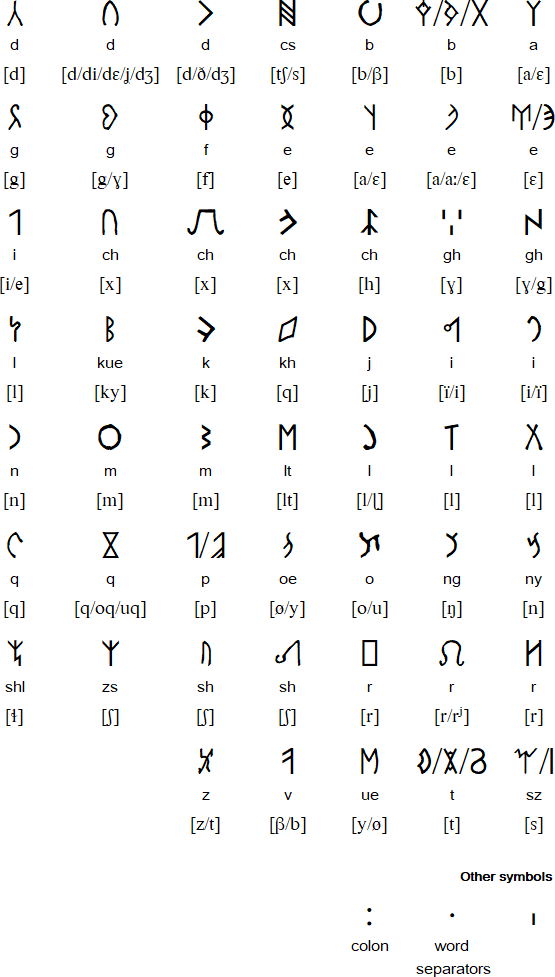
I have zero idea if it is true, but the site I took it from is omniglot, and I recognize it to be accurate.
And this here is nowhere near skandinavian runes, so whether that testimony is wrong, or there were some other runes, more thoroughly wiped out, but then too many unknowns, I'm off my depth. Let's return to other aspects of this melody. I'd rather focus on the building
bathes
C U P L E
speric bathes
C O U P
speric bathes
I M N L
И Мыслите Наши Люди
Он Покой Слово Твёрдо (честное слово? аминь?)
that christian formula combined with what I wrote, tells that it's rather I M L N (L ~ Г)
И Мыслите Люди Наш Он Покой
буки~веды, потому б~в.
ST as печать? seal? set?
Слово Твёрдо
А Б Г Д
Е В Ж З
И М Л Н (and H standing last in latin tells, that not IMNL, but IMLN (not that christians knew the structure, but they knew the abecedary and it was enough to spell it, and as you can see, their abecedarie's clauses are all across the lines))
О П С Т
if sefer yetzirah knows better, A M S was the way, then columns from right to left would have D the last (lowest) letter in the rightmost column, and S would be the last of the leftmost column, corresponding thus to dextrus and sinistrus (right and left)
And in a way, it demands three lines per column.. and three lines only (columns now, three columns, 3×3)
О ? А
П ? Б
С ? Д
(if there's C[s], then Д is more з-like, the greek way)
what is the central column? I guess it's sonors.
О И А
П М Б
С Н Д
Д~R? C~L? (Г~L, but wut anyway)
О И А
П М Б
L Н R
nah, it's terrifyingly off the wall
(and not only because I add latin amongs russians, but also because it's R, not L after the P)
Существование письменности у славян до Кирилла и Мефодия,
подтверждают и лингвистические данные. Слова «писать», «письмо», «книга»
являются общими для всех славянских языков, а значит, и славянская
письменность возникла ещё до разделения славянского языка на южную,
западную и восточную ветви, произошедшего не позднее 5-6 веков Н.Э.
these lines I quote today are from some dubious source, so I you must take them with caution
(caution = cautiousness (n = usness? use? own?))
И Е Ш У А is I E O U A with hush [ʃ] in the middle, thus an encrypted form of the name of god,
and it makes it clear what Jesus ment when he said "none shall come to my father but by me" (translation has to be clarified, it could be through me, with me, vie me, but that IESUA formula makes it clear what he ment. What other word leads to IEOUA? AEIOU, actually. but IESUA is more clear a puzzle, only one step instead of two.
an interesting birdie ornament in an orthodox temple:

very ᛘ or ᛉ like, but then it could be not directly connecting, even if having the same origin, and it could be more connected to the posture of the patriarch in that video that images leads to (he pays on his knees and with hands up)
As P is R in russia, so is that ᛘ or ᛉ, for many (for most) it is A, and thus this sing sign is A M S
And then I see that Algiz isn't A, or is it A а лги что З? A to Z?
𐰭 for a? (there's no such glyph in nordic runes, I borreowed it from old turkic) as o the
ᛉ as 𐰭 to 𐰮 ~ k ~ c ~ s ~ z? Az, also as in Mannaz?
ma as matka, thios I understand, algiz as z is way less understood, but then what if it's literally za az the I and M the me too?
I was taught by that witch~ворожея, that individual runes are written from the top down, so that we write them towards us. And when I asked what if we write them the other way around, as I liked to draw ᚴ as a penis or a branch of a tree, so I was answered that then we draw it away from us, as if the spell is counter-clockwise so to say, отворотное. Но я сомневаюсь что это точно.
В переводе с тибетского языка Чомолангма (ཇོ་མོ་གླང་མ) означает «Божественная (ཇོ་མོ) Мать (མ) жизненной энергии (གླང)». Гора названа так в честь бонской богини Шераб Чжаммы (Sherab «мудрейшая», Cham-ma «любящая мать»), олицетворяющей материнскую энергию[7]. Другое тибетское название вершины — «Чомогангкар» (ཇོ་མོ་གངས་དཀར): «Святая Мать, белая, как снег»
The Tibetan name for Everest is Qomolangma (ཇོ་མོ་གླང་མ, lit. "Holy Mother").
Shèngmǔ Fēng (t 聖母峰, s 圣母峰, lit. "Holy Mother Peak")
all this makes me think, that the Earth is Mother, and Mountain is related to Mother too. Mount as hill and horse too, as ma is both mother and horse, but of course this is not much more than raw and arrogant guess.
As one surgoen friend told me, if you teach women to perform surgery and you send them to an isolated island and you return there ten centuries later, be sure they will perform surgeries exactly the way you taught them, so this sexist belief gives me promise that those sorceresses using runes and cards for divinations may have preserved the ancient knowledge in its purity, so I think I will dive into that realm, wish me luck and let's hope my rigor survives that descent.
world walled
war ~ wall? or are they antonyms, so wa world is war and wall + ed?
is world whirled? ᚹᚱᛚ up(werkh) right left? right also included right ahead? then left would be used for back, бок is side in russian, бак(tanker for liquid)
is tanker made of tanks? танки ~ баки? багги?
Пщв акуу
yukky is the opposite of yummy, as if k is the opposite of m
would ~ want
will ~ ? wait?
would ~ wood (is it referring to erection?)
א ב ג ד
ה ו ז ח ט
י כ ל מ נ ס
ע פ צ ק ר ש ת
ה ו ז ח ט
י כ ל מ נ ס
ע פ צ ק ר ש ת
ΑΒΓΔ
ΕΖΗΘ
ΙΚΛΜΝΞ
ΟΠΡΣΤ
ΥΦΧΨΩ
So no, hebrew aklpahbet wasbn't modified greek, but is more based (growing gradually) than greek itself.
ᛗ for man being double ᛘ as if tells us, that it takes two to tæn go.
and then those ᛘ are upside ᛆ and ᚴ, as if they're Ann and Kat? a billyCat. But Cat is a female name. Kocnz Костя is much less popular, and though it was the name of the emperor who made Rome christian, I thought about God, Ann (goddess) and God (whatever you name it, King of a sort, Killing, Knowing, Kennen ~ can)
can~might?
can ~ may!
can is cognate with знает (умеет) (can and know are related! what a surprise)
Я просил Бога показать мне то, что я по его мнению должен узнать. И я узнал, что знать ~ уметь, мочь, быть в состоянии. и мне захотелось клеить дверь (ремонт, дедка)
baby, babe ~ баба
детка ~ дедка
Детей называют в честь деда да бабки? от этого такой сдвиг лексики?
что мал что стар
дед и баба были именами? не, вряд ли.
джек и мэри ~ дед и баба? (мэри is literally мама, so why some barbara couldn't be babushka?)
батя~вася? ваня даже (вася и ваня скорей всего когнаты. валя и варя тоже? валя ваня варя вася)
отец has дед in that тец, which makese that o a honorific, like in japanese otosan, where san is a honorific suffix, making to (also standing for ten and and) the stem of the word, and it naturally not to far from тя in тятя and da in dada, dad, daddy (to is and in japanese, да is and in russian. an D?)
d ~ до (to, more)
b ~ in?
bd ~ into?
давай ~ дай in? побудительное в подобное японскому yo and dutch maar and ge-
будь ~ бывай
плюй ~ плавай?
но обычно это в означает другой тип глагола, типа длительности придаёт, повторяемости даже:
целуй целовать, словно у стало в.
Малевать малюй - тоже у, оттого и в?
подбить - совершенная форма
подбивать - длительная чтоли (несовершенная, незавершённая)
совершить ~ завершить?
I saw russia written as puccia, as if not pussy, but пукия выдаёт (пукают от страха, бывает что и обсираются)
русы трусы, это ипсо или как бишь его, приоп псиоп
заяц русак, в россии в зайцев наряжают мальчиков когда они доверяют и не прекословят.
ps-cow, mos-cow, okolni-cow, surnames are not always cow, but very often, others also end with ow (those who are not always cow, but row, yjd now, show, pow, so only ow was common, and all around freely went the letter before ow, so russian suffix ов is like english preposition of. Languages are different in the way they use grammar, and in this sense russian and fenya are two different languages. But then I realize that they're merely dialects, because that grammar thing is arbitrary, I took it out of thin air, and that some research is required to distinguish if pure fenya comprehensible to the most of russian speakers, and not because they've been taught it before.
The definition between languages is factual gap between the systems of communication, which prevent people from the groups using those languages from understanding each other.
And the definition of language doesn't have distinct borders, for different people could understand different dialects differently. So instead of borders we have gradient, and it could be a nice way to border territories. By changing the laws and jurisdictions on the territories, where it changed, there was a border, and that gradient is digital so to say, discret chtolli, дискретный, ибо закон и территориальные границы по одному или пачками включались географически с градиентом погрешности, которой можно пренебречь, но нужны ли там пограничники? нет. Если преступник возит герыч, не ловите его на границе, ловите его во время встречи с покупателями, сразу после соершения сделки. Но в лучшем из миров дела ебанутых го-о не ебут, всё на видео, всё отслеживается, ии индексируетс статус в зависимости от кол-ва правонароушений.
право собственности наружают правонарушители, или право жить обеспеченное конвенцией по правам человека. У животных таких прав меньше.
ᛆᛒᚦᛂ(not ᚽ)ᚠᚵᚼ(or ᛡ)ᛁᚴᛚᛘ(even though it looks like ᛉ)ᚿᚮᚱᛦ(if R, or ᛣ if Q)ᛋᛏᚢ of bornholm runes
ᚡᚣᚤᚥᚧᚨᚩᚪᚫᚬᚭᚯᚰᚲᚳᚶᚷᚸᚹᚺᚻᚽᛀᛂᛃᛄᛅᛇᛈᛊᛌᛍᛎᛐᛑᛓᛔᛕᛖᛗᛙᛛᛜᛝᛞᛟᛠᛢᛤᛥᛦᛧᛨᛩᛪ᛫᛬᛭ᛮᛯᛰᛱᛲᛳᛴᛵᛶᛷᛸ
ᛒ ᚵᚦ
ᛗᛝᛚ
ᛈ ᛩᛏ
so let's traditionally mention 666 and finish the volume, for it already lags a little.
ббб
блядки ~ соблазн?
блядь соблазняет (блескнув блестя пиздой? сверкая говорят)
сверкая
мелькая
блестя
белое~блеск
and it's a very interesting бббб, very dia_bolic, very luciferian, blight
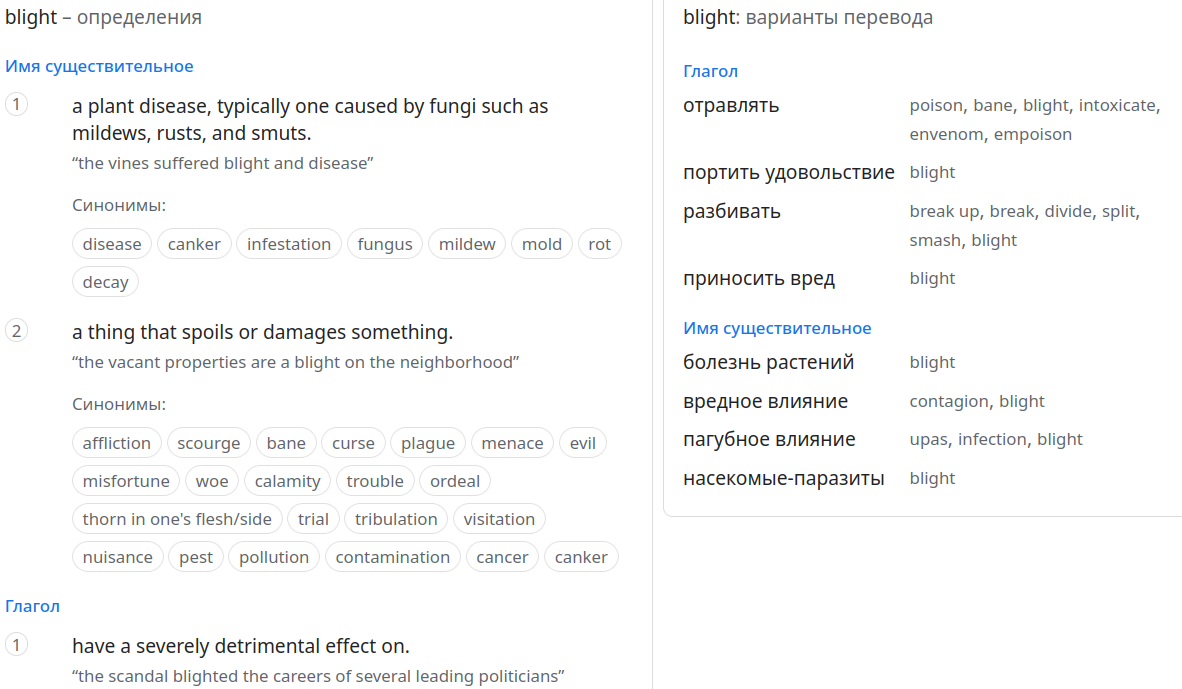
this bright blight seems to be a misbright, left instead of right. What is wrong is left along.
this blight seems to be a cognate of rus блять
blade blood so this bla syllable is cursive, as if it is from блевать (болеть (кровить? раз blood, бледен - не от потери блада ли? но от слова белый. где blood там болит, это уже есть в cognates.html, когда активный словарный запас туда соберётся, начнутся такие повторения всё время быть, тогда можно её и выпускать, собирая новый материал для второго издания))
bold bolt балда болванка (и балда недалеко от блядь по фонетике и семантике или стилистике)
was bolt considered to be a bold connection, as if the producer knew that they can give such precision which production of bolts need. a show off. Imagine how far we moved! We the humans, germans mostly and such.
bolt вал палка balled! not only nut and screw, but also the butt of the balt. butt and ball probably have the same b, and once again, first chakra is the ass, the lowest forms of matter unworthy of being the body leave that door, (live and leave would both do, doublets? Live!~Leave!)
живи значит живо движение подобное тому кое в слове leave
leave ~ move
nave is of latin navis, ship, which goes the waves, moves. so is v the root? va a la gar, живи и live имеют из общего только её. Так что давай не будем путать л и ж, осознаем морфемы, и мы знаем (из киатайскоого что они когнаты слоги слога)
and though in navigate
navi gives me na as see, more, lake, water, 𓈖
because vi is move, and that vi as in vita was found
vita and живи may say that people understood syllables when those words were composed.
that n is meer, mare, море глсн лшн м тлнг й
м as mitra
p as petra?
l as letra?
n as nytro nitrogen N
tro is true? is it even true?
u in утро
φ ~ v (the same loop v has at the same end, only usually smaller, but who measures)
(I first noticed their positional similarity between latin u and greek Υυ and lating Yy and russian Уу, and then english v and russian ф, and then I think I recalled the φ ~ v thing)
Кашья́па (санскр. कश्यप IAST: kaśyapa «черепаха») — в ведийской и индуистской мифологии божественный мудрец (риши), автор нескольких гимнов «Ригведы». Считается отцом богов, демонов и многих других существ.
Кашьяпа - распространенное древнее имя, относящееся к множеству разных личностей в древних индуистских и буддийских текстах.
Согласно «Махабхарате», отцом Кашьяпы был Маричи, один из десяти духовных сыновей Брахмы.
Мари́чи (санскр. मरीचि, IAST: Marīci, букв. «мерцающий огонёк», «луч света») — в древнеиндийской мифологии мудрец, первый из десяти (иногда шести[1]) Праджапати; один из Саптариши (семи великих мудрецов). Маричи — старший сын Брахмы (из его души или плеча), или Сваямбху[2], или Ману Хайраньягарбхи[3]. Он находится в собраниях Индры и Брахмы[4] и присутствовал при рождении Арджуны[5]. Также он посетил пронзённого стрелами Бхишму.
Этим именем у индийцев называется звезда η из созвездия Большой Медведицы.
Санскриту повезло с исследователем: так притянуть лучик к мерцать это надо большим любителем когнат являться. Индо-европейские это ещё более химера чем просто языки, ещё в большей степени абстракцией, идеей, объединяющей несколько абстрактных понятий.
and the guy who wrote rigveda may be considered father of gods, demons and many others, just as Tolkien is such a father.
A short and funny essay from https://www.bibliotecapleyades.net/universo/siriusmystery/siriusmystery_appendix04.htm I decided to place here in full because it is short. Only it mistransliterated I as l, for if it calls it a dyphthong, that is not El, but EI. It would be wildly weird if e was called as l (even though in cursive the two may look very similar) but then wiktionary only recognizes
Plutarch wrote a fascinating essay entitled 'The E at Delphi', actually in the form of a dialogue, featuring Plutarch himself and several other speakers. It is to be remembered that Plutarch was a close personal friend of Clea, the Delphic priestess of his day, and he knew much and always sought to learn more about the nature and history of the oracles not only of Delphi but elsewhere as well.
He was, however, most interested of all in Delphi itself, for he was one of the two priests of Apollo there.
The central subject of the discussion is the letter E which was a prominent inscription at the Delphic shrine. (That is, the letter E was carved in stone quite on its own at Delphi and was a subject of much curious speculation to the classical Greeks, who retained no tradition of the meaning of the ancient inscription of this single letter.)
F. C. Babbitt, in his Introduction to the dialogue, says:2
Plutarch, in this essay on the E at Delphi, tells us that beside the well-known inscriptions at Delphi there was also a representation of the letter E, the fifth letter of the Greek alphabet. The Greek name for this letter was El, and this diphthong, in addition to being used in Plutarch's time as the name of E (which denotes the number five), is the Greek word for 'if, and also the word for the second person singular of the verb 'to be' (thou art).
In searching for an explanation of the unexplainable it is only natural that the three meanings of El ('five', 'if, 'thou art') should be examined to see if any hypothesis based on any one of them might possibly yield a rational explanation. . . .
Plutarch puts forward seven possible explanations of the letter. . . . Attempts to explain the letter have been also made in modern times by Gottling . . . and by Schultz . . . Roscher . . . C. Robert . . . O. Lagercrantz . . . W. N. Bates, in the American Journal of Archaeology xxix (1925), pp. 239-46, tries to show that the E had its origin in a Minoan character E . . . later transferred to Delphi. Since the character was not understood, it, like other things at Delphi, came to be associated with Apollo. This character has been found on the old omphalos discovered in 1913 at Delphi in the temple of Apollo.
Interesting are the two coins reproduced in Imhoff-Blumer and P. Gardner, A Numismatic Commentary on Pausanius, plate X nos. xxii and xxiii (text p. 119}, which show the E suspended between the middle columns of the temple. Learned scholars should note that the letter represented is E, not Ei: therefore such explanations as are based on the true diphthong are presumably wrong.
The second explanation offered by Plutarch is in fact the correct one.
This is how Plutarch suggests it:
Ammonius smiled quietly, suspecting privately that Lamprias had been indulging in a- mere opinion of his own and was fabricating history and tradition regarding a matter in which he could not be held to account. Someone else among those present said that all this was similar to the nonsense which the Chaldaean visitor had uttered a short time before: that there are seven vowels in the alphabet and seven stars that have an independent and unconstrained motion; that E is the second in order of the vowels from the beginning, and the sun the second planet after the moon, and that practically all the Greeks identify Apollo with the Sun.
The facts that Delphi is the second descending centre in the geodetic octave, and that it is symbolized by the second vowel E, would seem to go well together. The seven vowels (each corresponding to one of the oracle centres) were uttered in succession as the holy 'unspeakable' name of God by Egyptian priests.
Demetrius of Phalerum, the student of Aristotle's Lyceum and who founded the famous great library of Alexandria when later in life he was exiled to Egypt, tells us in his surviving treatise On Style: 'In Egypt the priests sing hymns to the gods by uttering the seven vowels in succession, the sound of which produces as strong a musical impression on their hearers as if flute and lyre were used.'
In Chapter XVI of The White Goddess, Robert Graves discusses this too, and there quotes Demetrius. Graves also refers to an eight-letter version of the sacred name. It may be that if one wants to count the base oracle centre (which in musical analogy is the octave expression of the top centre) one should have an eight-letter version.
This version of the name is:
JEHUOVAO.
Note that E is the second letter.
We are faced with archaeological evidence that the second vowel, E, was prominently associated with the second oracle centre in descending order. (See Plate 12 of this book.) And we know from Herodotus that Dodona, the top oracle centre, was said to be founded by Egyptian priestesses from Thebes in Egypt. We also know that certain Egyptian priests sang the seven vowels (or eight vowels, including an aspirate) in succession.
We have already seen that the geodetic oracle centers seem to have an octave structure. And as this book went to press a discovery became known which demonstrated the existence of the heptatonic, diatonic musical scale in the ancient Near East. We may even make a presumption that the uttering of the seven vowels in succession may possibly have corresponded to the seven notes of the octave (but we may never know that for certain).
And it is most important to emphasize that, however bizarre to us, the association of a vowel with an oracle centre is not our invention or surmise. The E may not only be read about in Plutarch but seen on ancient coins and on the omphalos stone itself (for both of which see Plate 14). And this association of the second vowel with Delphi has never been explained by anyone.
So granted all the above, what follows? If each oracle centre had a vowel associated with it, then the second vowel being associated with the second centre would seem to imply a corresponding arrangement for the other centers. And if that is the case, it would seem that the entire system would be associated with and actually comprise a geodetic spelling-out, over eight degrees of latitude, of the unspeakable holy name of God, known commonly to the Hebrews as 'Jehovah'.
It is most important that anyone intrigued by this possibility should keep a wary eye for any further evidence. We should be on the lookout for representations of or associations of other vowels at the other centres. These may already be known to specialists in the field or there may be evidence of this sort languishing unclassified and unexplained in the basement of some museum. Or this sort of evidence may come to light at any time in the future.
One place to begin looking would, it seems to me, be with an examination of the omphalos stone from Delos, which is to be seen in Plate 12 of this book. Does this omphalos stone have a single letter inscribed on it similarly to the Delphi omphalos stone ? And what of all the other omphalos stones, such as the one from Thebes in Egypt (see Plate 12). Are any of these well enough preserved to show a puzzling single hieroglyph of a vowel ? I have not carried out any investigation of this sort myself at the present time.
In closing, it would seem that the E at Delphi must fall into some coherent system of the kind I suggest, and the explanation of the enigma must be connected with Plutarch's lightly advocated second explanation - that to do with E being the second vowel.
(Babbitt's exclusion of the diphthong on the basis of the ancient coins to be seen in Plate 14 of this book is therefore crucial and to my view conclusive.)
That ει is very interestingly elusive: wiktionary only recognizes it as if.
g.translator doesn't deliver that if, but
googling for "είσαι ει" in quotation marks tells it found 242,000 results but they all seem to be for Είσαι ή, g.trans tells it's "you are", and Είσαι is "are you", so as you can see, not knowing even basics of the language what am I doing here? I'm way out of my depth. I have to study decades more to dig deeper, I have found something deep and firm, so let's not scratch it anymore. I will return to it seeing better. Maybe my eyesight was damaged by my not seeing much more so far, and marxist satanism of quality becoming quantity damaged my views as well inevitably, I lived in soviet russia.
But I will leave that piece, also because I respect Plutarch, so let's a piece of him be here. I honestly was looking for something I knew when I found that, so though I'm not sure what fish that is, I copied its genome here because it didn't hurt. And in that surfing session I found something else:
"In Egypt the priests sing hymns to the Gods by uttering the seven vowels in successsion, the sound of which produces as strong a musical impression on the hearers as if the flute and lyre were used..."
In the Nag Hammadi Gospels (Gospel of the Egyptians III, 2) the writer confirms the above:........invisible mystery came forth, iiiiiiiiiiiiiiiiiii, HHHHHHHHHHHH, oooooooooooooo, uuuuuuuuuuuuuu, eeeeeeeeeee, aaaaaaaaaaaaaaa, OOOOOOOOOOOOOOOOOOO."
The , H, represents the long e, while the capital ,O represents omega.
All seven vowels are sung her just as Demetirius said. Has anyone else come across this?
Yet I still stand with my IEOUA, because Blavatska transliterated it worse (I think the transliteration I had in mind began with Ё or Ы or Ю, but I could not find it yet. I think it was in тайная доктрина or изида разоблачённая, so ridiculous it was, that I decided not to enter it here, but now I'd look at it. I continue this subject in the next volume)
or is the name AEIOU? Were cathars right? Their prophecy predicted my discovery.
Or could it be IEAOU? Or was it a melody? I should research all the vocalises (not to be mistaken for vocalizations, though some connection is definitely there somewhere in the dpth depth) but how deep is this? Modern history tells not deep at all:
Vocalises date back to the mid-18th century. Jean-Antoine Bérard's 1755 compilation L'art du chant includes a selection of songs without words (sans paroles) by composers such as Lully (1632–1687) and Rameau (1683–1764), chosen for their value as exercises in vocal technique. Accompanying the exercises are instructions on mastering the technical challenges they pose. By the 19th century, vocalises were commonly composed specifically for pedagogical purposes rather than being adapted from existing songs.
and maybe they're true, maybe glossolallias always contained consonants, but then again modern hostory lies, because those egyptian priests were definitely singing a vocalise.
and I think if there's a secret in vocalises, it must be kept by the singers:
(mirror)
меня подкупило, что он начал с М придав ей особое значение, и тянул её через третий глаз, перекликаясь с её mind-like semantic element.
ust And then he goes to thiey thia thio, directly reminding me of θεά, and he even stresses the ά́
Bj`o'rk recommended Tricky not to take vocal classes (because he gives birth to very unusual melodies, and singing lessons could damage that ability of his) and though not all of us are trickies, some of us may be, either way let his lesson be here, especially because that thiey tha thio-o-ow is in descending mode, which could make it just the very one.
The i (боги?)
The a (богиня?)
The o (бог?)
our is the opposite of её? were these words coexisting in some ancient language?
Auld Lang Syne is scottish old long since (long ago) the scottish song giving melody to America the Beautiful.
Historically, lyrics were not always wedded to tunes and would therefore be sung to any fitting melody
and only now have I noticed how those five groups begin with the consequnt letter in alphabetic order
only then zain go right after dalet, sorta greek way, but then what does it tell? that cabbalah is translation of isopsephia? But then I just don't know, the hebrew alphabet's line two has just this one letter more than the line one. Other letters are in those groups and I say there were four or even three groups, the groups of the three mothers.
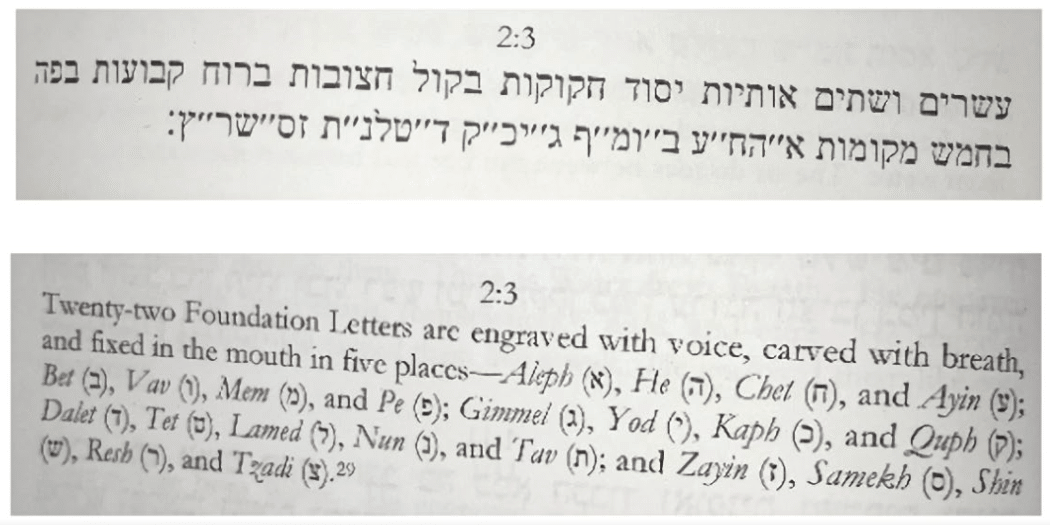
it's this line I am speaking of:

как работает магия мемов: крылатая фраза побеждает в споре, подчиняя людей своей воле, будучи забавным и симпатичным. моря,
(моря я морю (я морю моря (more ~ много (more ~ many (mn in many is мн in много (го in много is го in чего (many ~ мало (it tells that n and l are the opposites))))))))
it not convenient to write in the depth of the brackets.(it is, so tired of that grammarless or extragrammatic, or actually grammatic and then brackets are some так и как)
it is self-initiated literature
(those who don't deserve to read it won't)
Magic of soviet flag was that it was made of the finest velvet, very pleasant to touch, and it was a fabric, not carpet, very fine. And deep colour. But naturally green would make us peaceful (muslliim is obedient (as if to the will of allah, but they are obedient to people by this faith, some people are their transmittors of the will of god)) but then islam is such a bad association. Blooo is cool. Is belief iof blue blood from aristocracy speaking english-like language in ..other english-like languiage, but one had only blood, other only blue. or just one knew only blue and other knew them both, so in those who knew blue, but called blut krev (not blue but red, krasny~krovv)
кров~крыша тоже родственен кровь~красный? cover is the stem of krysha and krov, рана~кара is the stem of krovv and krasny
Burgess invented nadsat making russians another vile hero, Alex. like Alexander of macedon, they now speak slavic there. They say they used to speak greek-like dialect, but I doubt descendants of the Alexander wouldn't take their homeland back, they were children of those guys who went with him to conquer a lot. Very russian-like behaviour, as if Byzantymum moved to Russia (the third Rome is a meme)
Я не только филолог лучше ницше, я и философ лучше Ницше. Это очень высокое плечо, его начитавшись я восхитился и жанр очень подобный выбрал, философия, филология. Причём я не читал вроде филологию Ницше (или его литературоведческое было филологической составляющей, тогда да, это было не сложно. но философия сильная штука, уверен ли я что я правильно веду народы? любой маг создаёт собственный народ, (как сказано в "магия история теория практика")
People went to carrying spears vertically or forward, so that when they're attacked, they can sit kiping spear up, so that beast was pierced. A hunter was a bait?
And what an interesting homonym that word has:
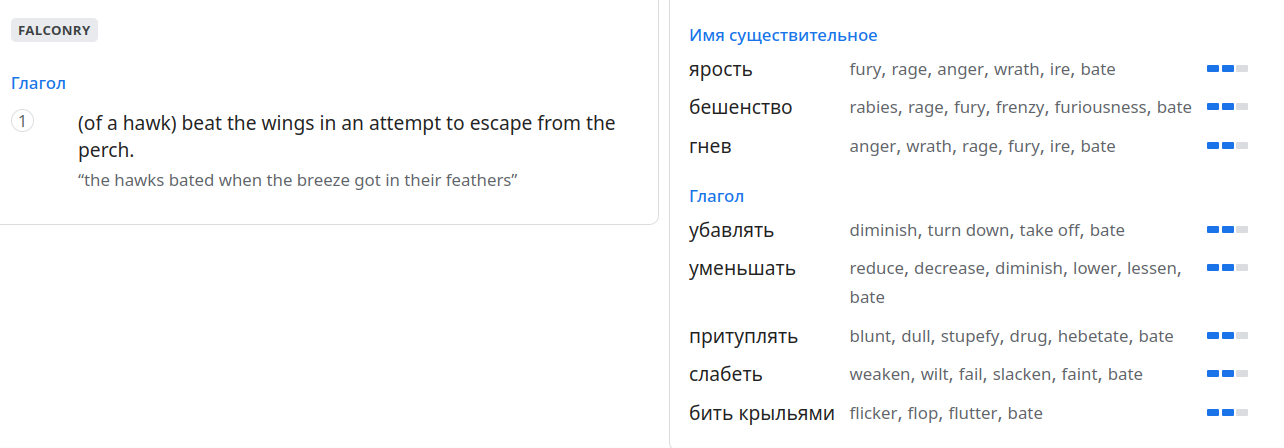
bate as a stronger form of hate (to bate is to убить что-то (тут же не сказано сильно или слабо уменьшить, я говорю что сильно, потому что bate is hate)
perch I didn't know this word. It's as if верх and жердь and even перекладина together.
нашёл замену гос.флажкам на сайте:
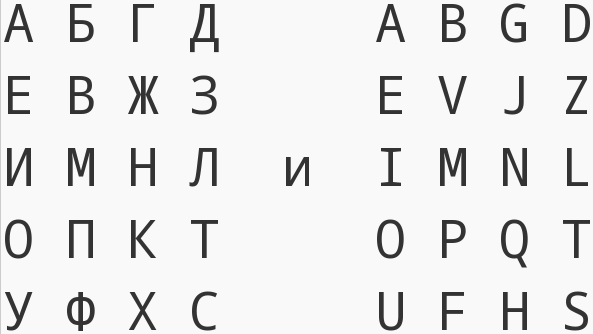
or maybe O P K T or better O P T K оптика? переставить столбцы? A B D G? about d russians and europeans are in more better agreement (in russian I would say в большем согласии, едва ли в лучшем, это английская конструкция, и я её прибераю (беру берегу, прибрал прибираю (бира бера говорят что и = е, что в свою очередь говорит что гласных было три. триединое. если знаешь лишь бамбук, то всё будет в бамбуках, и длина и объём. и тон и бог весть что ещё.
давление в миллиметрах (р.т.) и объем тоже в миллиметрах (кв) так что дался мне бамбук, он хотя бы натуральный.
Вот сейчкас обидно было (представиив что ai читает)
aiu? artificial intelligence unique, unified, united
иио? искусственный интеллект объединённый
and the common ground between these two is IO.
united intellect (I'm whether noticing or inventing the way both ai and ии are vowel names, godlike)
объединённый интеллект (I noticed that and now I'm entertaining this idea)
занимаясь такой хернёй, переключился на перевод, тупая механическая работа,
перед войной в рашку пришло в моду имя варвара. Ядрёна Варёна. кто-то это мутит, заставляя или программируя наслеление хватать это имя (сначала (или до того, из того что заметил) неуклюже музыкальная песня была с таким именем, но хоть крутили этот кал как пэйолу, параллельно замещая этим калом настоящие драгоценности вроде 5nizza, в общем, полностью дэвид глоуи проджект. И в тот раз не сработало (хотя может подготовило почву, как знать, говно удобряет) а назвав героиню качественного мультика Варварой, таки добились своего.
а я предупреждал. но что предупреждать, строить надо было.
broth is a new word for me, and probably brother is related to it. I took this word from Eddas. I should read those Eddas properly. But then how is one supposed to read something like this?
He then began his strength to prove, bast to bind, make of it loads; then faggots carried home, the livelong day.
And this difficult text is how I improve my English even further.
It is always fascinating to pull the boundaries of my understanding: faggots is a synonym to fascine.
Fascists fascinate? Fascists are faggots, and probably literally so, letter by letter (well, is as o is not very convincing, but faggot is the opposite of fascine, just as nazi is a little nuts)
магнитик magnetic
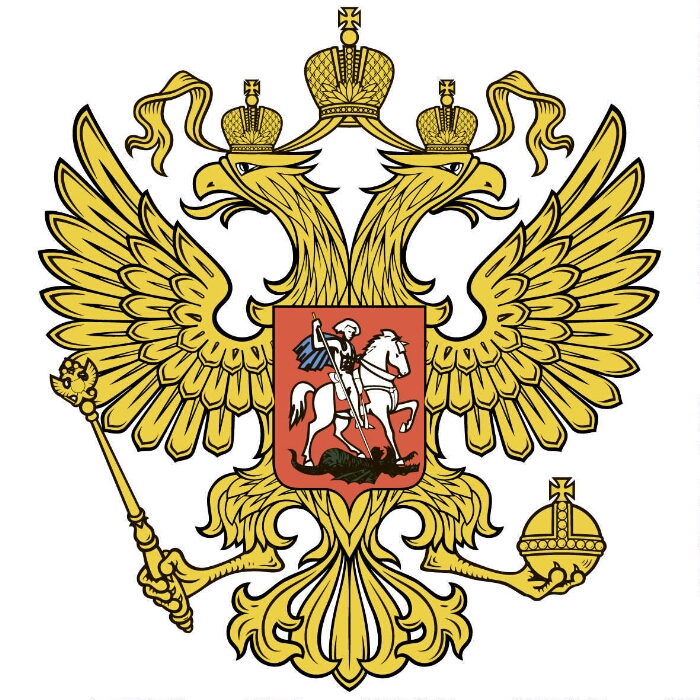
here I notice how its wings are swords, and how it's tongues are not tongues (why would they be there, so rude) but tongues of fire, that it's a жар-птица, a fire bird, and two heads (and three hats) may tell that this bird is змей горыныч (with one head cut off or simply wearing the шапка-невидимка. And the image on the shield may tell some story too, but that story somebody else may tell)
But back on track. Could it be A B G D?
A B D G
E V Z J
I M N L ?
O P T K
U F S H
?
But then ..what? nah, way too weird, one meaningless optic doesn't count. Screw your optics, so to say.
reding kaganov's blog, I began to write poems again, but I sat here thinking to create memes, as long as I understood their magical power, but why poems, I told why, do they work in the meme line? of course,
Кровавая ГеБ-на (геббельсовщина)
Красный ГосподъБ-гъ (Благ (god~good))
Классный ГосподьБ-дь (Благодадь)
and I dropped it to bring it here for blag~bog ~ good~god
oo ~ o
ла ~ о
V ~ Ʌ
and I go on, correcting that meme:
Классная Господня Благодать
Какая Гнусь.Грязь.Го-о (господь именно что государь (последний стал первым, когда дослужился до главного говночиста, что к нему приводили рабов, которых заставляли это делать, а он лишь присматривал? приговаривая, что тоже чистил го-о, а дослужился до менеджера, так что если будешь хорошо чистят, станешь специалистом и сделают мерденежом, а я мол на повышение или на покой пойду))
Господь это Господь, а государь есть оратор от господа. жулик, иудей. А хитро они разводят.
Герман (хм, забавно) Лукомников согласен в тот же час, да, это хаос:
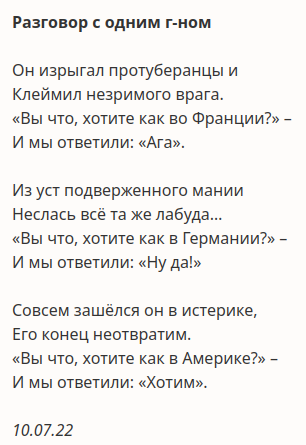
Думал что про "никогда не ешь наркотик" это тоже Лукомников, а то Трубников, вообще конкретно неодооценённый гениал:
страну штормит. витийствуют паяцы.
прелюбодеи рыщут. вянет хна.
воспрял семит. бендеровцы гнездятся.
война.
так молодой повеса думал-думал,
да передумал. я, мол, либерал
и вне политики. косяк неспешно дунул.
он врал.
пока он дул, пока на митинг слазил,
адреналинчик стыдно теребя,
соседнюю страну ебали мрази.
как и тебя.
реальность всё же правдою под дых: Когорта Гопников Блевотных, Кодла Гадёнышей Блатных
(да ритм требует чтобы не Ко́дла, а Кодла́, ебал я ритм, и этого Козла)
Ещё от Лукомникова: Я такое написал! Да выкладывать зассал.
но тут с другой стороны прилетело: от Ларисы Ратич: триста тридцать три (артиллерийская команда, которую используют ватные войска, и которую я (по иронии судьбы) использовал для печати своей первой книги, именно таков был её тираж)
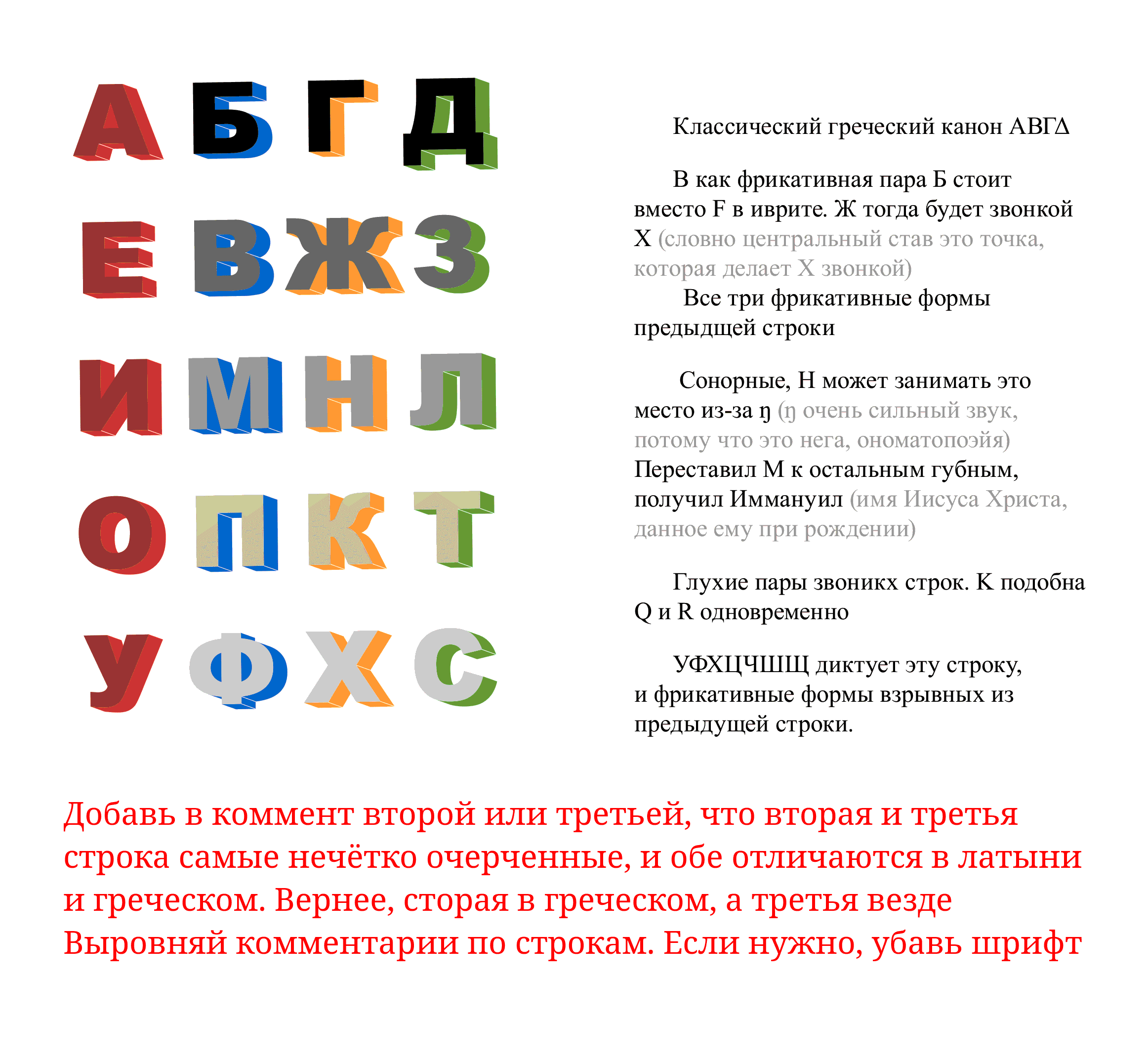
А Б Г Д
О П К Т
look very cool, but
У Ф Х С only makes sense if С[s] looks like Z (as in die deutsche)
ᚢ instead of ᛒ in so called ᚠᚢᚦ ᛆᚱᚴᚼ(or ᛡ) makes me think of the second line in hebrew, and thus I see E in that ᚠ
and ᚦ is ט and ח the H is the last in latin, and ט is hardly there, unless it is the F. but it may be not.
I wish not to wish to die. This spell is longer and thus stronger. or maybe not necessarily thus.
ᛆᛒᚦᛂ(not ᚽ)ᚠᚵᚼ(or ᛡ)ᛁᚴᛚᛘ(even though it looks like ᛉ)ᚿᚮᚱᛦ(if R, or ᛣ if Q)ᛋ
ᛏ and ᚢ are something like ᛗ and ᛟ which usually ends the ᚠᚢᚦ ᛆᚱᚴ
ᚡᚣᚤᚥᚧᚨᚩᚪᚫᚬᚭᚯᚰᚲᚳᚶᚷᚸᚹᚺᚻᚽᛀᛂᛃᛄᛅᛇᛈᛊᛌᛍᛎᛐᛑᛓᛔᛕᛖᛗᛙᛛᛜᛝᛞᛟᛠᛢᛤᛥᛦᛧᛨᛩᛪ᛫᛬᛭ᛮᛯᛰᛱᛲᛳᛴᛵᛶᛷᛸ
of old futhark I speak, to a specialist in old futhark I pass on what I heard of those ᛗ and ᛟ being the end of the alphabet, that if the last one was in the raw, you was to repeat the circle. And if the previous one, then stop reading. And I wasn't sure which one stopped and which one was the proceding, I reconstructed it by a reason, I will ask when I see her again, and I report if I find myself mistaken. Or I will surely report, but on something else, I think I can use that witch as a source of my field research,
ᚠᚢᚦᚨᚱᚲᚷᚹ (ᚻ/ᚺ)ᚾᛁᛃᛇᛈᛉᛊ ᛏᛒᛖᛗᛚ(ᛜ/ᛝ)ᛞᛟ: elder fuþark
ᚠᚢᚦ(ᚬ/ᚭ)ᚱᚴ ᚼ(ᚾ/ᚿ)ᛁ(ᛅ/ᛆ)ᛋ (ᛏ/ᛐ)(ᛒ/ᛓ)ᛘᛚᛦ: younger fuþark
ᚠᚢᚦᚩᚱᚳᚷᚹ ᚻᚾᛁᛄᛇᛈᛉᛋ ᛏᛒᛖᛗᛚᛝᛞᛟ ᚪᚫᚣᛡᛠᛣᛤᚸ ᛢᛥ: anglo-frisian
ᚠᚢᚦ(ᚬ/ᚭ)ᚱᚴ ᚼ(ᚾ/ᚿ)ᛁ(ᛅ/ᛆ)ᛋ (ᛏ/ᛐ)(ᛒ/ᛓ)ᛘᛚᛦ: younger fuþark they say, but in Bureus, ᚴ was how the second aet began, and ᛋ was the beginning of the third, and ᛚ went before ᛘ (as in italian! if it wouldn't be the case, M would be right next to I in italian) and ᛦ bureus didn't mention, and righteously so, because ᛦ is the upside down ᛘ, and then how would you divinate with runes the way modern witches do? would they have two ᛘ's or what? I'd say they'd have fifteen letters, without ᛦ and ᚵ and I can only guess which one the other, let it be ᚿ, for it looks like ᛆ way too much, especially in the prolonged bar:
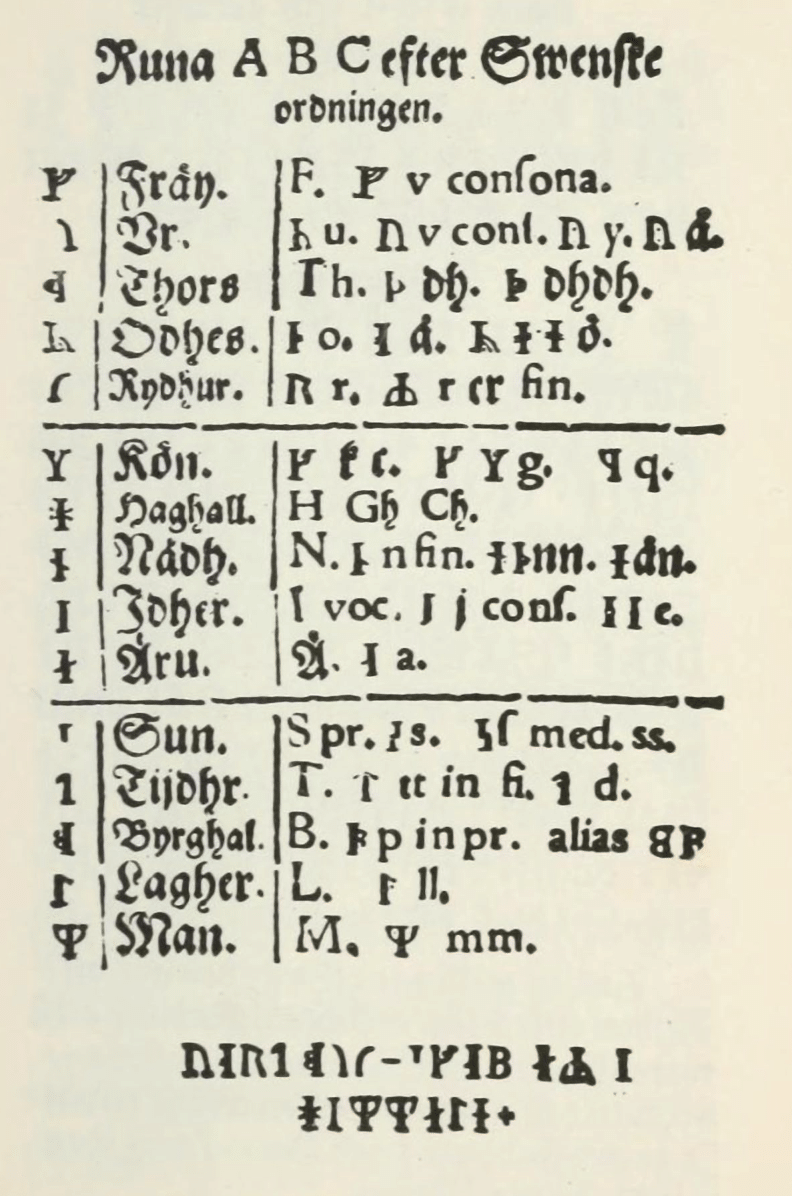
BLM, that's very hip, and if they didn't try to reforce it, I wouldn't write about it, but what is it? some XYZ of runes? I am pretty ignorant about runes, I just keep this log of thoughts to keep the interest to the subject or rather to do it so that something interesting when it comes, and it comes, does goet recorded.
And at first we never know how big something is about to be.
ᚠᚢᚦ(ᚬ/ᚭ)ᚱᚴ ᚼ(ᚾ/ᚿ)ᛁ(ᛅ/ᛆ)ᛋ (ᛏ/ᛐ)(ᛒ/ᛓ)ᛘᛚᛦ: younger fuþark
ᛘᛚᛦ is more memetic, because ᛘ was how nazies marked birth and ᛦ was how they maked death on their tombstones. ᛚ is for life (Leben) and love (Liebe)
and (ᛏ/ᛐ)(ᛒ/ᛓ) are the first two. Two mothers? Tofel Teufel and Bog
Who said in german you pronounce as it is written? Teufel is Тойфе
I remember (almost remember) opposing those who spoke so by the obvious counter-example Deutsche
I read ᛘᛚᛦ as моление and I pulled pray on it, and to my surprise it also fits, and even better it gets: reading ᛘ as ᛈ turns pray into мрия, which is dream in ukrainian,
And could it be related that ᛈ goes next to ᛉ, but then in those fuþarks that is some Z,
ᚠᚢᚦᚨᚱᚲᚷᚹ (ᚻ/ᚺ)ᚾᛁᛃᛇᛈᛉᛊ ᛏᛒᛖᛗᛚ(ᛜ/ᛝ)ᛞᛟ: elder fuþark
ᚠᚢᚦ(ᚬ/ᚭ)ᚱᚴ ᚼ(ᚾ/ᚿ)ᛁ(ᛅ/ᛆ)ᛋ (ᛏ/ᛐ)(ᛒ/ᛓ)ᛘᛚᛦ: younger fuþark
ᚠᚢᚦᚩᚱᚳᚷᚹ ᚻᚾᛁᛄᛇᛈᛉᛋ ᛏᛒᛖᛗᛚᛝᛞᛟ ᚪᚫᚣᛡᛠᛣᛤᚸ ᛢᛥ: anglo-frisian
ᛘᛚᛦ makes sense as molenie as mnemonic sequence of raised hands up, bow, touched the ground (to kiss the floor? what those ancients could do.
ᛘ is m in what is known as younger futhark, but I have my doubts, because ᛗ looks a lot like double ᛘ
and less letters per aet is also closer to the source (the way hebrew is closer to the source than modern latin (but ancient latin had even less letters than modern hebrew, what does it tell us? I know people could both add and remove letters, historically, so I cannot say which way the chronogoly went through those futharks, if I only know that letters were changed, I need some historic evidence, as I have with armenian, or some other theoretic constructions))
зубки жемчуг глазики алмазики
русские гораздо реже бьют своих детей (и тем ближе к европе? не из европы ли розги пришли? в любом случае, бить ребёнка это дичь и азиатчина, разумно гуманное отношение к детям
grey goo is how it all is gonna be, and not by programming of some nanobot, but in the shape of chaos, athat some day we'll dissolve into molecules and be there no more.
пыль is и ст прах и пепел.
страх и степен? сотрясаясь и степенно вышагивая. например (как вариант (may be))
рах и пен? трукха и пень
труха ~ труп
пень ~ пин? пинается? pin!
so many translations! it makes the word very basal, and technically I can make a program picking out words with the most ammount of translations, and giving them to students accordingly. The more meanings, the earlier it is taught.
штифт (pin, stud, finger, sprig, tag, pintle
булавка (pin
штырь (pin, pintle, dowel
палец (finger, pin, toe, digit, stud, claw
вывод (conclusion, derivation, pin, inference, deduction, consequence
шпилька (hairpin, pin, stud, taunt, peg, spike heel
ось (axis, axle, shaft, spindle, pin, center
болт (bolt, screw, pin, clincher, gudgeon, screw-bolt
цапфа (pin, journal, trunnion, neck, gudgeon, wrist
шип (spike, thorn, tenon, spine, tongue, pin
шплинт (pin, cotter, splint, split-pin
значок (badge, pin, ensign, favor, ideograph, favour
кнопка (button, key, knob, snap, pin, tack
ножка (leg, foot, stalk, stem, pedicle, pin
кегля (pin, skittle
шкворень (pin, bolt, kingpin, pivot, pintle, kingbolt
чека (pin, cotter, linchpin, lock, chock, peg
шейка (neck, cervix, pin, nick, bolster, gudgeon
брошка (pin
прищепка (pin
гвоздь (nail, pin, spike, hobnail
пробойник (punch, piercer, mandrel, pin, puncher, mandril
шпиль (spire, steeple, capstan, pin, needle, top
скалка (plunger, pin, battledore, ram, rolling-pin
колок (peg, pin
бочонок (barrel, keg, cask, tub, wood, pin
ножка микросхемы (pin
вязальная спица (pin
бочонок в 4 1/12 галлона (pin
приколоть (pin
прикалывать (pin, pin up on, pin up to
наколоть (pin, prick
прижимать (press, press down, pin
пришпиливать (pin
перекалывать (pin
скреплять булавкой (pin together, pin
прокалывать (puncture, pierce, impale, prick, spike, pin
пробивать (punch, wear, pounce, pin, clip
пригвождать (pin, root
булавочный (pin
Stop you crap. Hope it's dope. save the wave, believe in Liebe
and of course that pin is related to penis. Матерные слова, а не только матерщинные (богохульные, только в слове богохульных бог рядом с хуем стоит (в самм слове) а в матерщинные мать с собакой, мать ощенилась, и ты сукин сын, son of a bitch, common european slur, and another russian one is ёб твою мать, общее с кавказским ругательством стоп зачем я ругаюсь, ох какое ядрёное грамматически правельное (в английском ближайшим семантически ругательством будет motherfucker, but in english it is mirrored at who said ёб твою мать (хотя русский тоже мог сказать про него так, что он сам свою ёб. Но сейчас сказали бы свою. сё~то)
choose the language
A B G D А Б Г Д
E V J Z Е В Ж З
I M N L И М Н Л
O P C T О П С Т
only C is both Q & S, in russian it is also S, thuis it's S.
O П С Т опусти (руки и голову как во вркемя молитвы?)
onli C iz botz ...and when I speak of modern alphabet, I need letters from the modern alphabet, and thus no alphabet can be a closed system, for some tasks it needs elements from the outside. set of "everything" is some abstraction from human perspective, for it doesn't have ability to operate infinities.
and I have built 4×4 schemes for that is more symmetric and because hebrew and archaic latin and/or greek end with T
And because В is V in russian, I go deeper. 3×3:
A B G
I M N
O P Q
or
A B G
I W N
O P Q
or
A B C
I W R
O P T
word power makes a nice resonating wave, semantically reminding itself via this association, if it's E, not I. And E ~ 3(III), and З[z] too. both Ш and Т and E and З are lingual, three is totally lingual, two has labial in its midst, but then tw is some labial sound which I can only guess. a kiss?
A B C [a b k]
E W R (europa? евреи)
O F S (or is it office? U? no, e tells "no extremes")
The logic here is that first line is plosives, third line is fricatives, and between them is who knows plosives or fricatives.
бог ~ большое г? большой гад?
раз
рог ранит
то
бог банит? (налагает запрет и куча религиозных понятий) т.е. бог тот, кто имеет власть, а не тот кто мир создал, никто его не создавал, вообще мир как таковой, в не зависимости от того
some random language related stuff I find online and feel like archiving what I may:
Öl Fv1911;274B:
This stone was found near Resmo church in Öland. The runes are written backwards, or mirror-imaged, and it is made in Urnes style. It probably was used as part of a stone coffin.
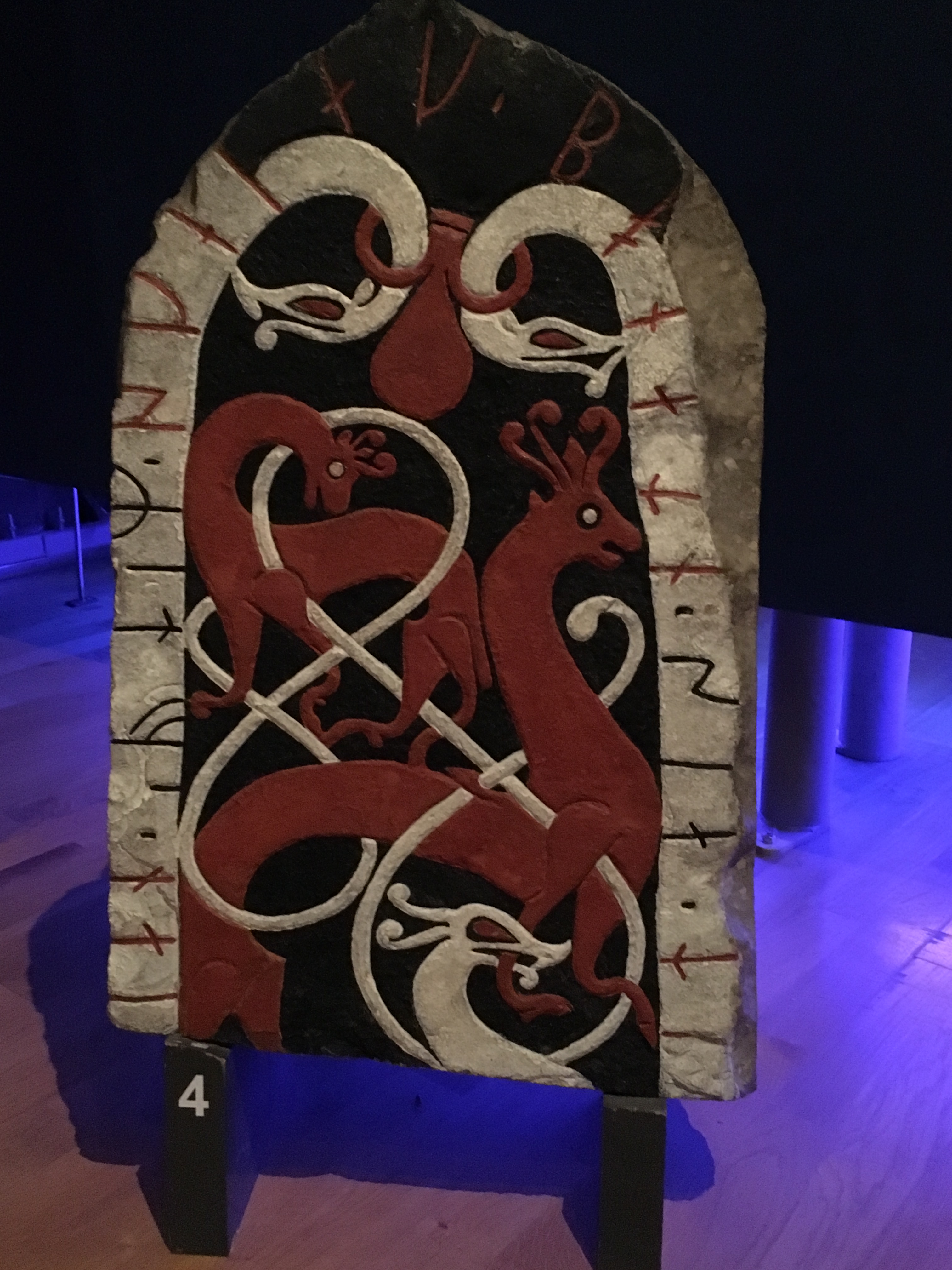
The inscription reads:
… …ᛁᚾᛅ · (ᚽ)ᚠᛏᛁᛦ · ᛋᚢᚽᛁᚾᚢ · ᛒᚬᛅᚾᛏᛅ · ᛋᛁᚾ · ᛏᚱ…
… …ina ‘ eftiR ‘ sueinu ‘ boanta ‘ sin ‘ tr…
“…(stone) in memory of Sven, her husband.”
Rundata Transcription into Old East Norse and Old West Norse:
… [stæ]ina æftiR Svæinu, boanda sinn. …
… [ste]ina eptir Sveinu, bónda sinn. …
стог стонет? это сеновал!
стяг стянет? на себя внимание врага?
ляг ланит leg lay ah! waht am I doin!
Work the capsule boy!
дедушка девушка
деда дева
д в
ву in девушка is wo in woman?
во in девочка is even closer to wo
wa if man is a, one.
w is tits?
м is mind? face? nose? ~knows? (japanese tradition to show at nose speaking of oneself may relate nose to nos (нас, us))
I am not that much of an antisemite, but I do disdain jews for infesting Europe with sandniggers. It exposes the unpleasant essence of the jews: они чурки.
is intellectual good? It depends on what intellectual. Intellectual cowardice is not.
пудень взрывает дома (footage of bombed ukrainian cities)
пукинь ворчун я рос и я сама (siomthing experimental, some double entendre or pun)
ему сверну и свергну (and this makes it not a poem, but a collection of liines)
(and no fourth line at all, because that would be the end of it)
семья се мы и я? се моя
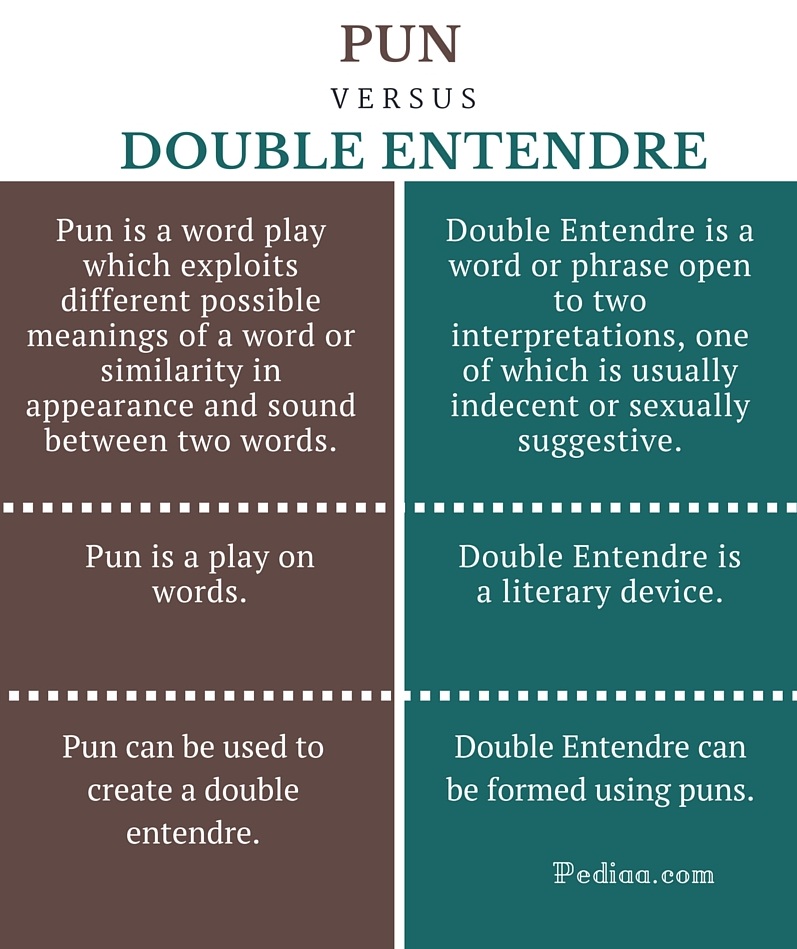
Different methods are employed to make a piece of fiction more appealing to the reader, and all these methods are commonly known as literary devices. These devices are divided into two groups as literary techniques and literary elements. Literary elements are the basic elements such as plot, setting, and theme that are essential to a story. They are unavoidable characteristics of a story. On the other hand, literary techniques are the way language is used in order to add more beauty to the work. Literary techniques are also added to make the author’s message clear to the reader. Unlike literary elements, literary techniques are avoidable. That means, if the author chooses, he can avoid using literary techniques. Examples for literary techniques are metaphor, simile, personification, onomatopoeia, alliteration, etc.
ill ~ еле? (ещё не всё, not all yet.. do they say so? I think they don't)
ill ~ или? dead or alive (помре або выживет)
або being not ибо, but или; and але being not аль~или, but but, these two peculiarities of ukrainian are the most foreign to russians. It's funny, that ukrainians know но as an ukrainian word, але предпочитают але, бо (бо is that ибо I was looking in або) щоб не як у москалив.
clear ~ dear (как в торговле, грязные предметы стоят дешевле чем чистые и новые)
cl ~ d?
d ~ cl?
is l staff? log? log as journal is from a log people used to keep records?
the oldschool of writing without spacebars is interesting:
dontcut is both don't cut and do not cut.
dontcuthair, but longer lines are tiresome: dontcutyourhair
greetings from cognates.html:
hooey (хуета) хуй, оно взучит как хуй, и у германцев и романцев это междометие облегчения или приятного сюрприза, а у еврейцев когнатой считается фуй (типа фу, отвращение)
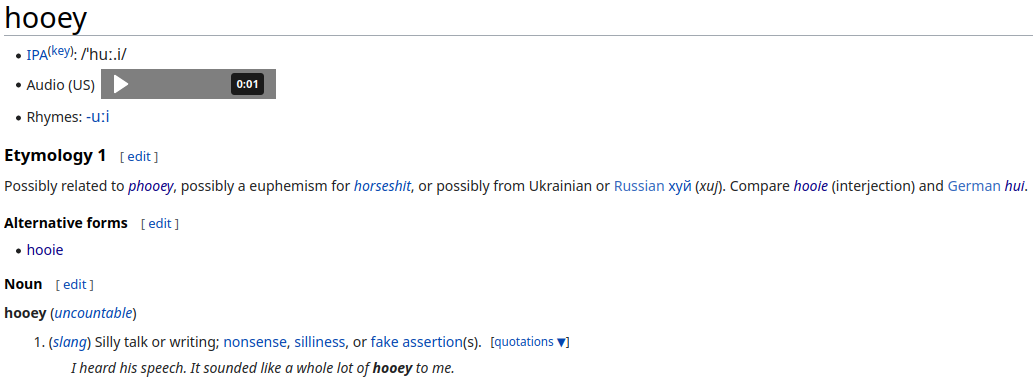
the girly voice at g.trans pronounces it as something between хюи and хуи, but male voice on wiktionary speaks it briefly way more distinctly хуй (even though with some accent)
It would be nice if the smartests ruled, but humans allow the arrogant nobodies to rule them.
наглец ~ подлец (någлец (паяц? заяц? (боится ибо знает за что? (но какое отношение к паяцу заяц имеет? паяц не воин, но смешны ли зайцы? вроде не особо)))
High tower is a place where you can be sure nobody's listening: you can look down to see if anybody on the stairs and you'll probably here when somebody ascends, or you close it at the ground floor, then move on up. And walls only border air, where nobody can fly. You probably watch the roof through by not having ceiling, only roof, And so that when guests from abroad visit you (to share some intelligence) nobody is hearing what they tell, so you're a петушок золотой гребешок, знаешь откуда кто собирается нападать. петушок это относится к международной сети гей-мафии:? золотой гребешок относится к короне, скорее всего. aristocrats. Children of partners living amongst your people as a guarantee of good intentions.
It is interesting that Romans abbreviated mile as M, and we abbreviate thousand as k, as if that place after I/J has this very meaning.
is first fist? (for fist is A in some alphabets of the deafs)
on
to by
under
under looks foreing (bisyllable)
what is syllable able to sell? whistle? sing?
над
к у
под
н~ п. Н is double П
if we draw from top to bottom, п is under н (as if it's smaller than n, p shorter than n? pupil smaller than nanny? baby is that p, пацан, пострел, подросток, под. поц, писсюн, да, он был у меня на уме, от того как p выглядит.
Europeazition of the horde is what this world needs. But then it has to tune europe to its liking: homosexuals should keep their shit in private. It's not only about children, it's also about people who are motivated by hormones differently than the libertines. And for privacy of those who don't want to be forcefully excited or distracted by something unusual. But this legislation, rational at first sight, leads to arabic madness, where they prefer to watch the bags instead of people. It's also extravagant in european mentality. Yes, I consider myself european, even though I'm a
А13 is alpha death, the best death, I am the best death, от смеха? , смех~смерть? умора!
А см3ерт1? can I solve the death question? And it's a great challenge the death (or lubavich) gave me. And I wanted to say chance instead of dath, and I see it as the same entity now. Fortuna. ~ future.
Фарт (удача на фене) когнат слову Fortune.
kill ~ убил
б мягкое (ногой?)
k жёсткое (палками, yj;fvb rjgmzvb)
онRU ~ винUA
shows that this word has ו as its initial letter and then it can have no other letter than ן
ון is not known by g.trans, and I only found ג'ון (джон (that ' makes g dʒ)) and שאב׳ון (мыло, савон (that ׳ is geresh))
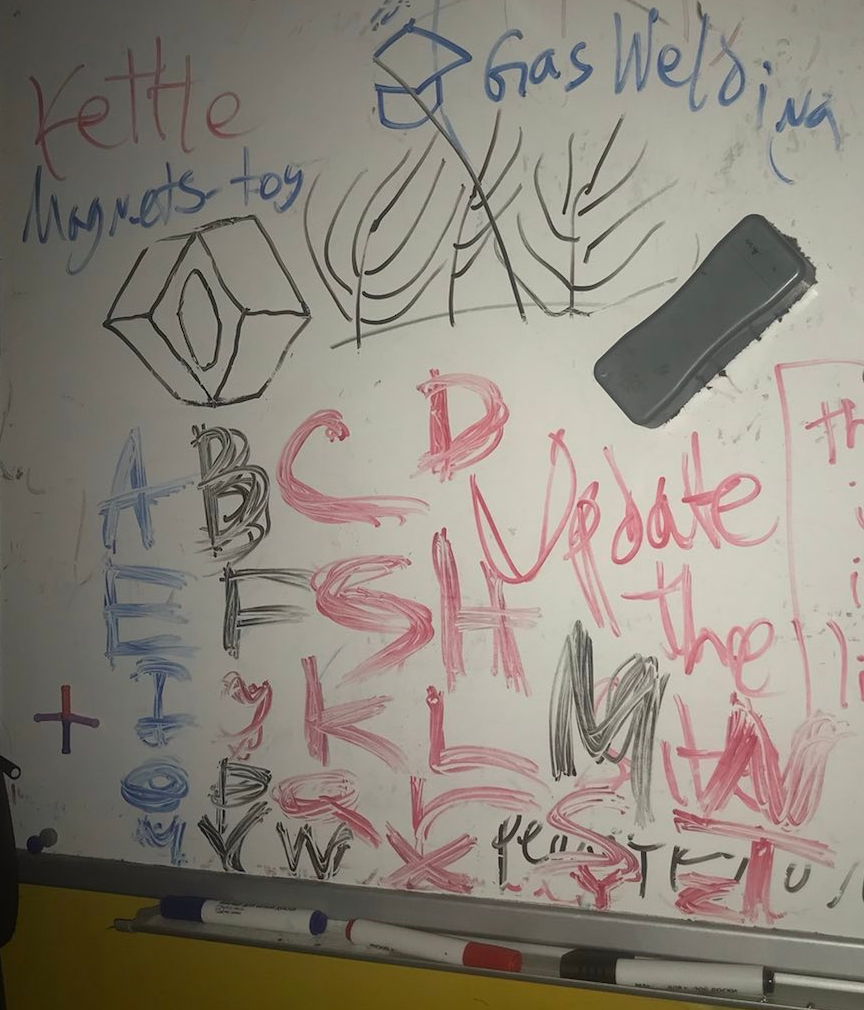
I wrote alphabet ten times each letter one at time. And I found some features I didn't see before: The tail of the A's dash, the tendency to roll the third roll, I did it twice by accident, c also showed A-like inertia of drawing the final stroke longer. But D was alright, accurate. E surprised me how I never missed, it's like that interval is automatic, who knows what causes this feeling of exactness, my first thought is how rectanular it is.
rectangle makes rect a four, for triangle starts with tri the three.
but then I decide not to confuse ghzvjeujkmybr c xtnsh`[eujkmybrjv? rfr vj` cjpyfybt vyt gjlcjdsdftn? xnj xtnsht eukf ljk;ys ,snm gjl 90 uhflecjd? yj vjq hjv,
quadrangle четырехугольник, четырехугольный двор
quadrilateral четырехугольник
tetragon четырехугольник
quad четырехугольник, четверка, тягач, шпация, четверо близнецов
square квадрат, площадь, каре, сквер, клетка, поле
okayt, I guess it lags enough for me to leave, vol.26
but first let's finish the whiteboard story, G was revealed as ᛃ (and j is not far from g)
J looked like yEN, U looked like уRU
L & r shined through, and their forms in relation to leftright thing tell that the alphabwet should be turned 90 degrees, so it goes chinese way. But then to make L & R shoulders and make sense by their position, the columns should go not in chinese manner, but the way columns go in european newspapers.
M above S made much of sense, but mostly because there used to be S under it before I came with it.
r
X looks like ☧
Y was written of three strokes, all three go down (the first two to the centre, the lower third out of it)
Z standing like this made NZT written on my whiteboard. I wonder where I would be if LSD was sold.
(am I too of a pussy to use darknet? I'm too of a lamer)
...
